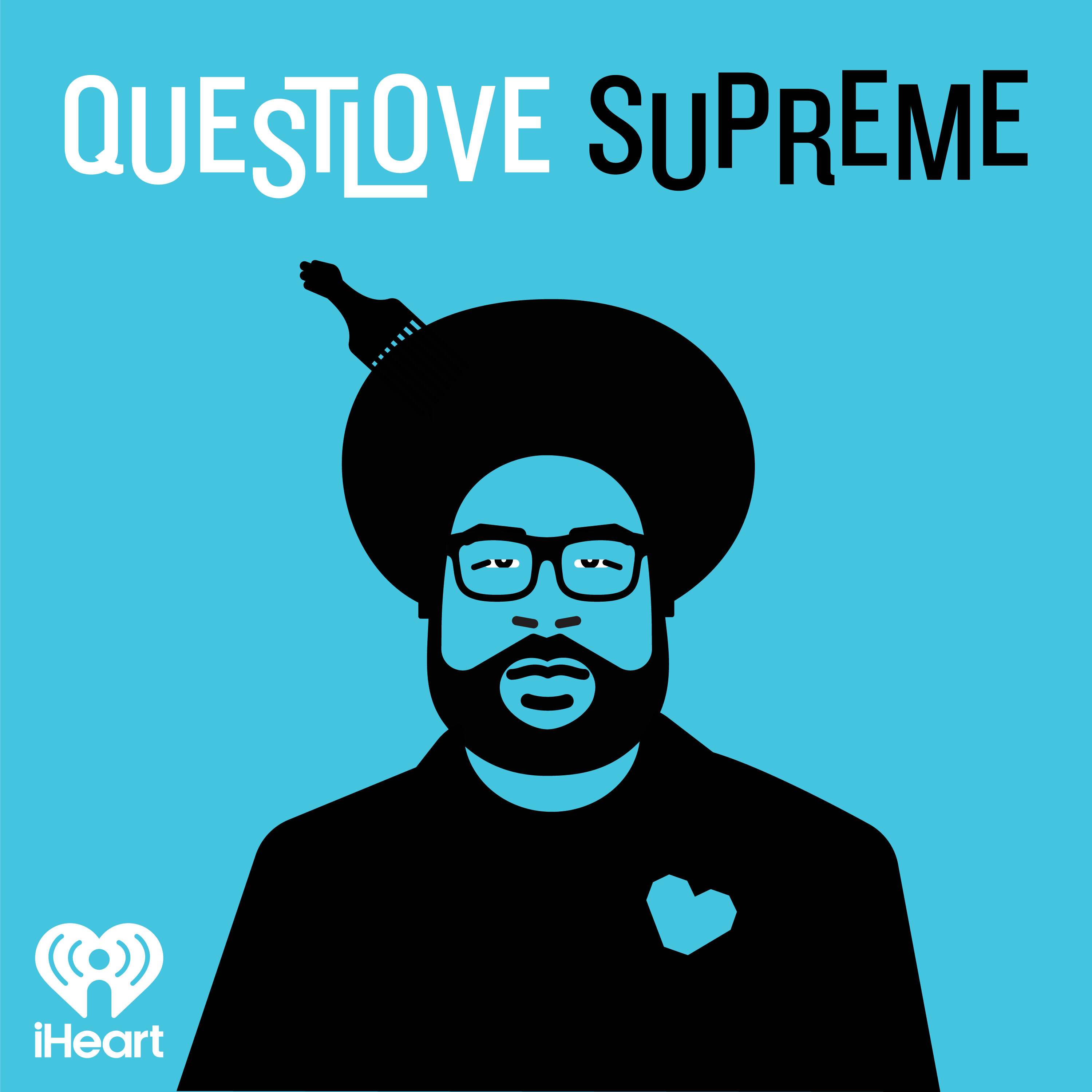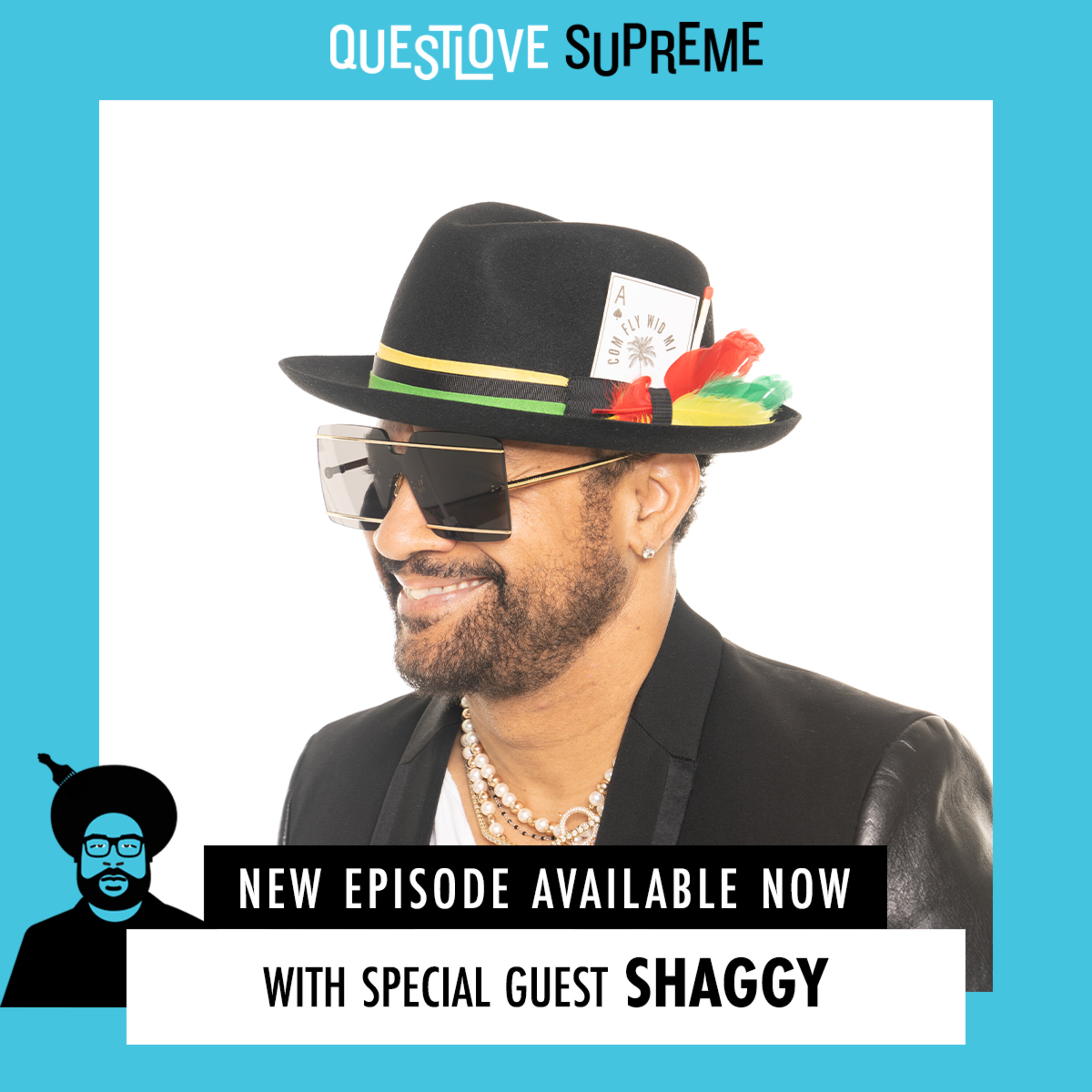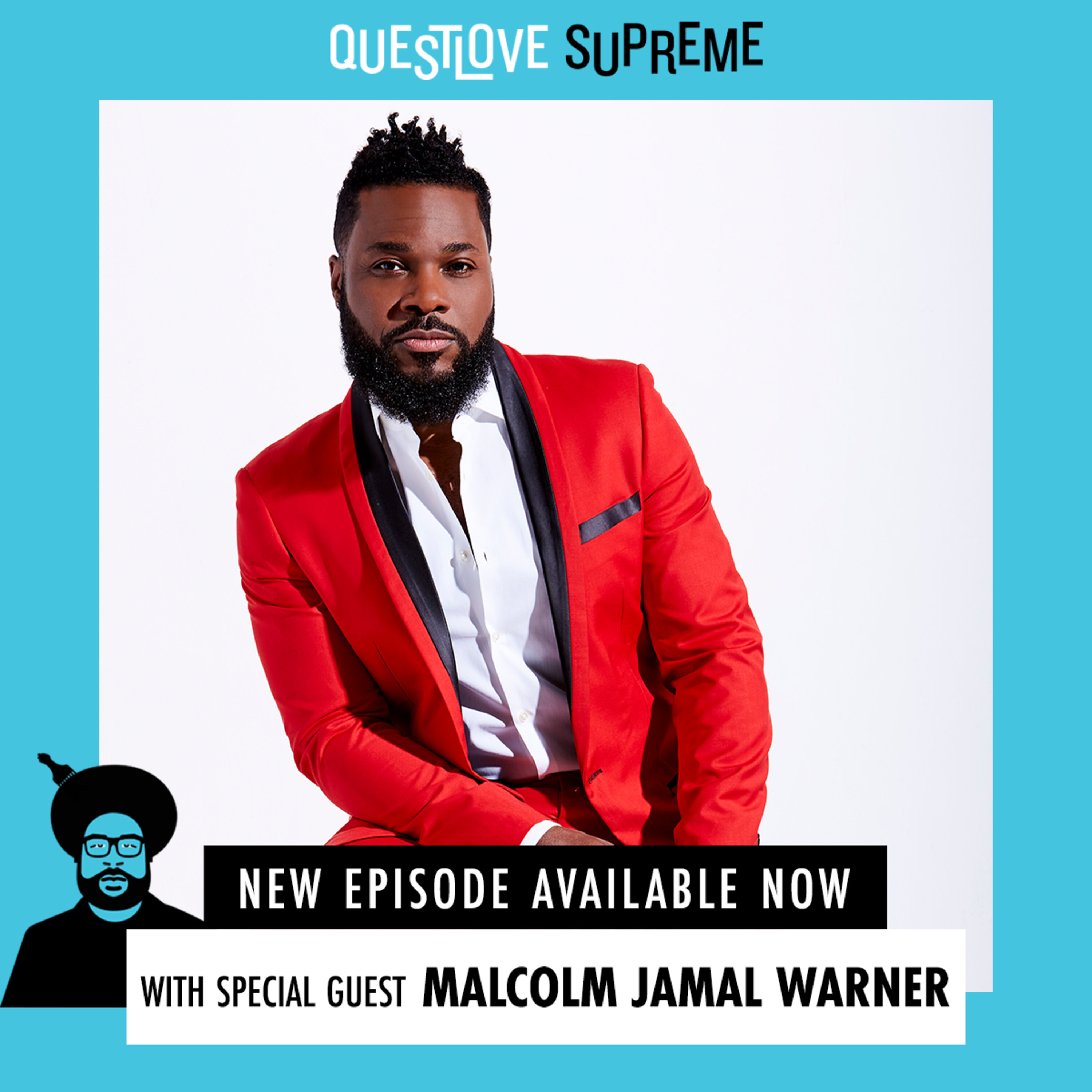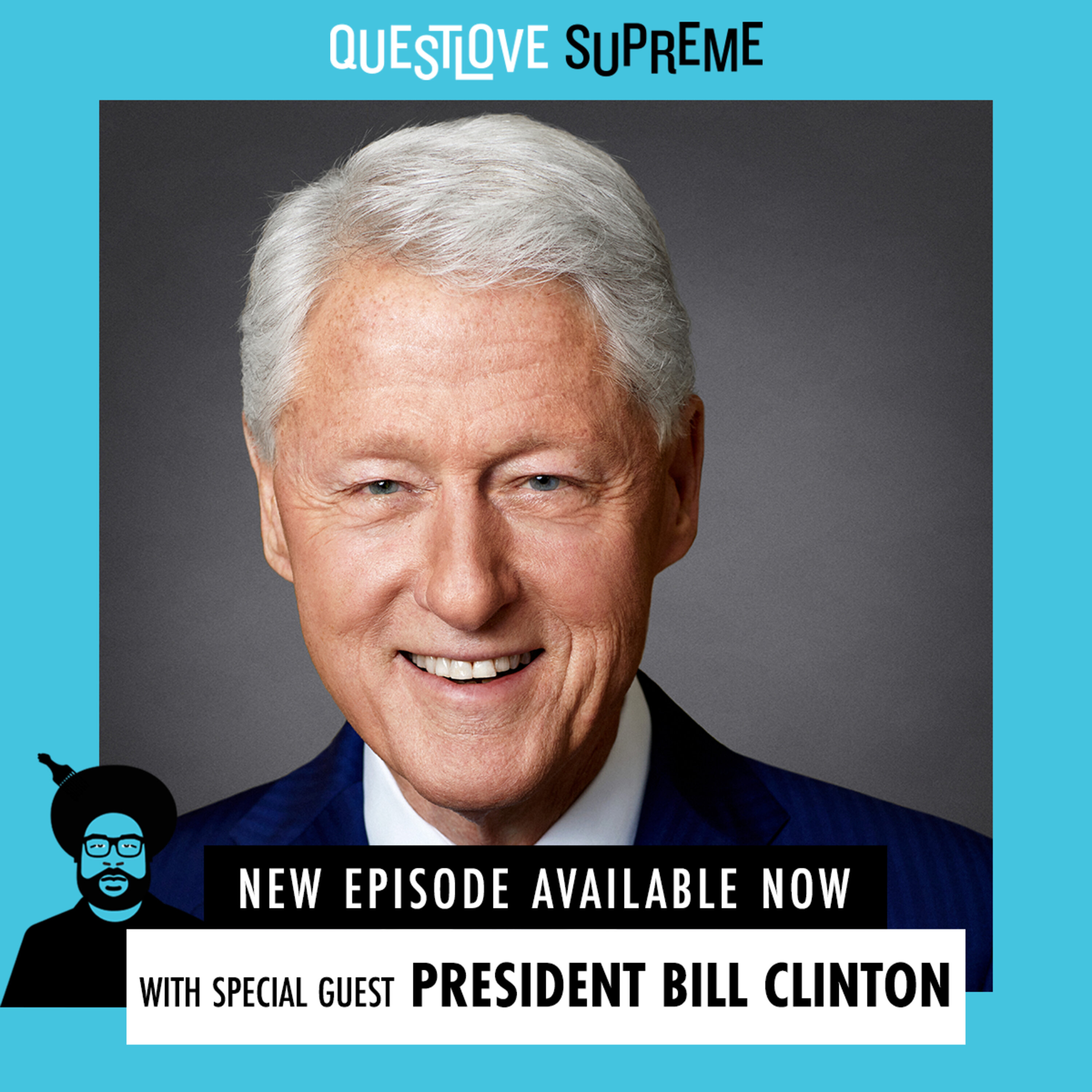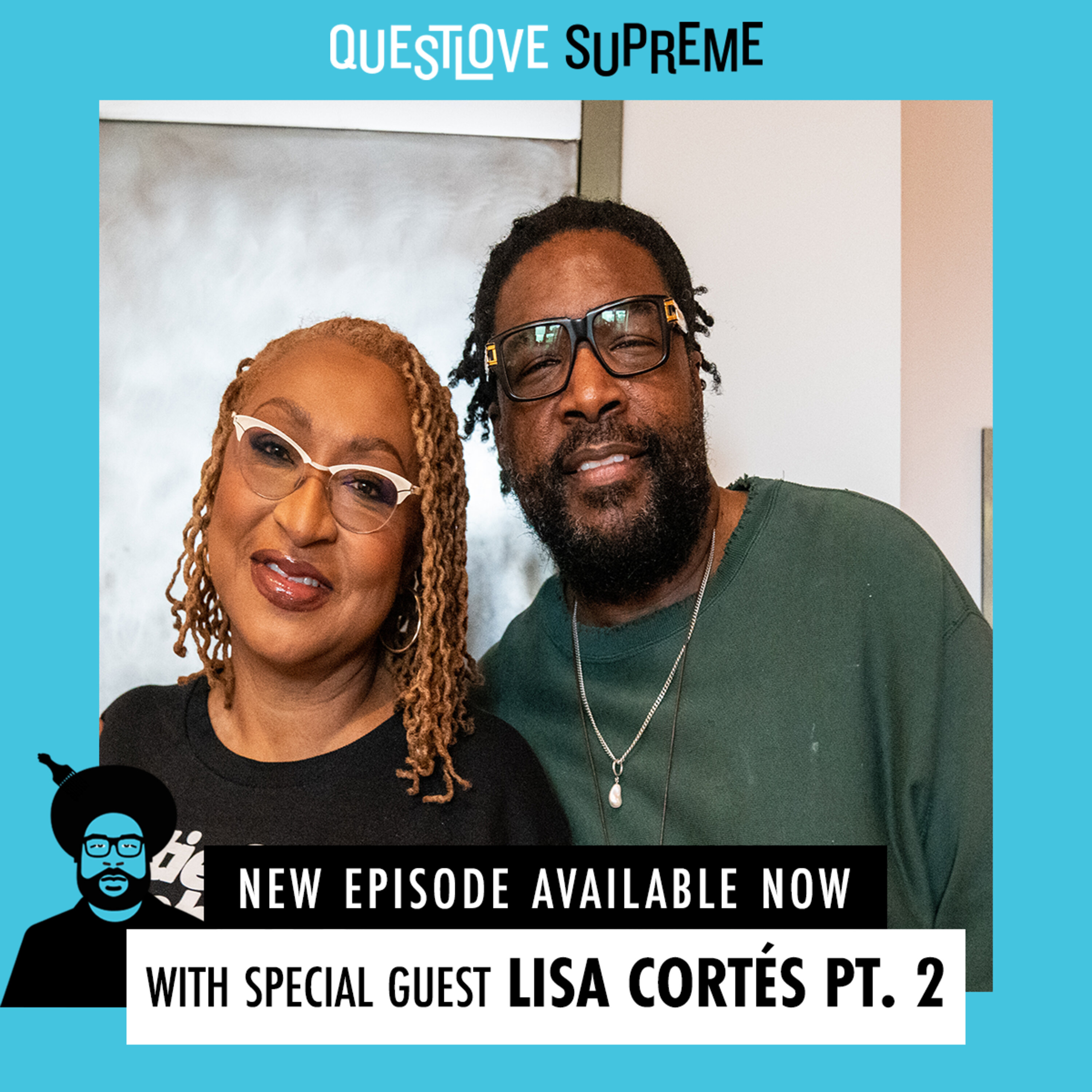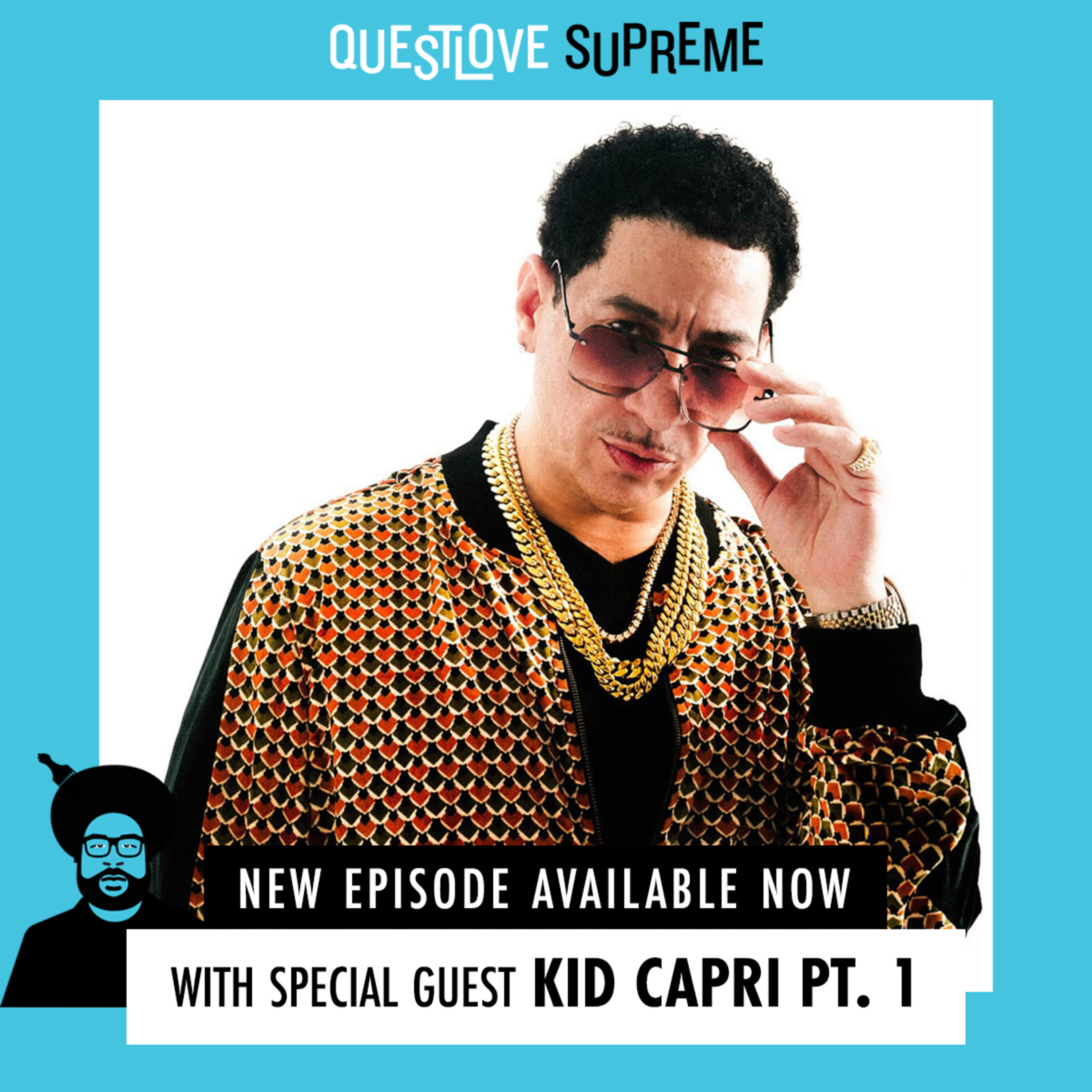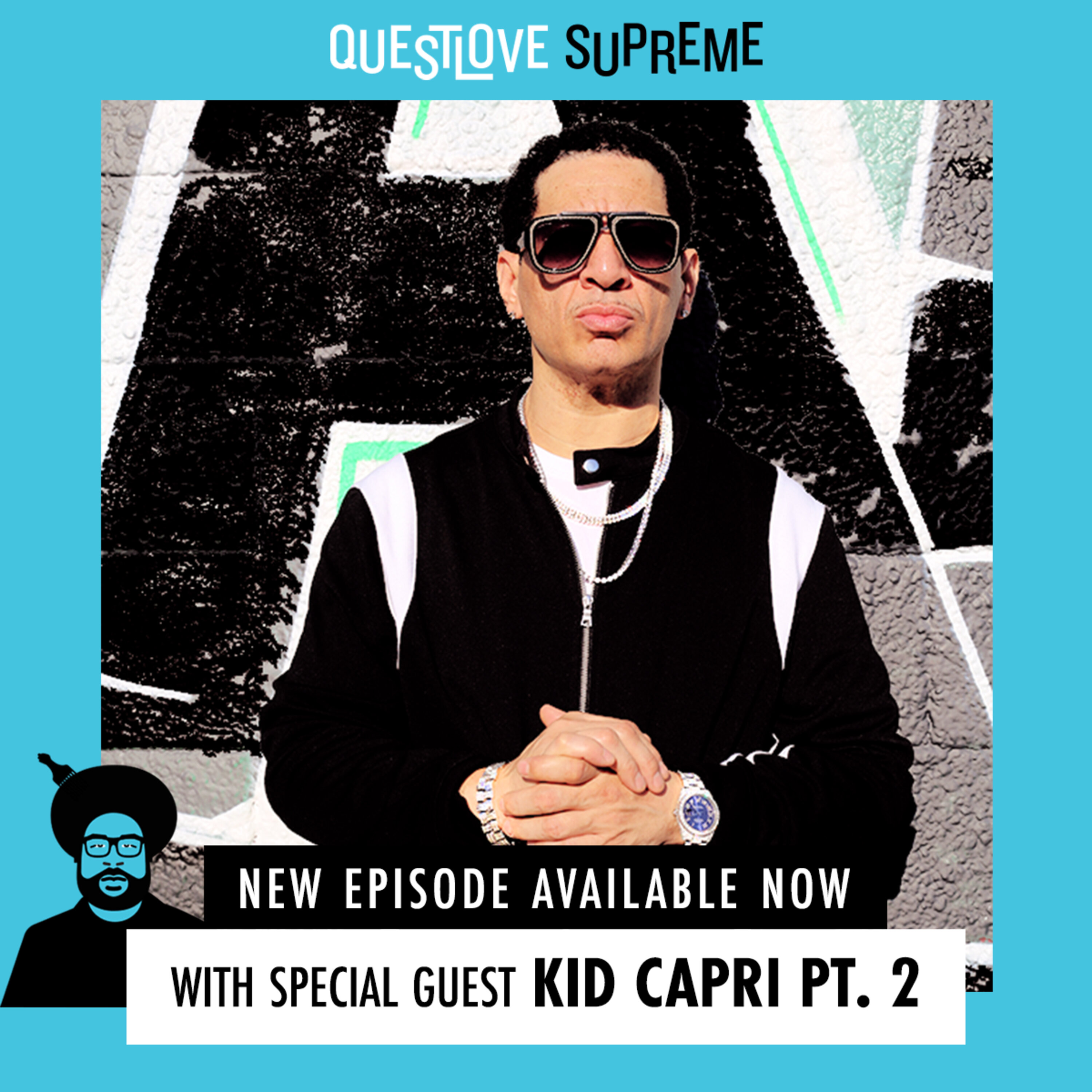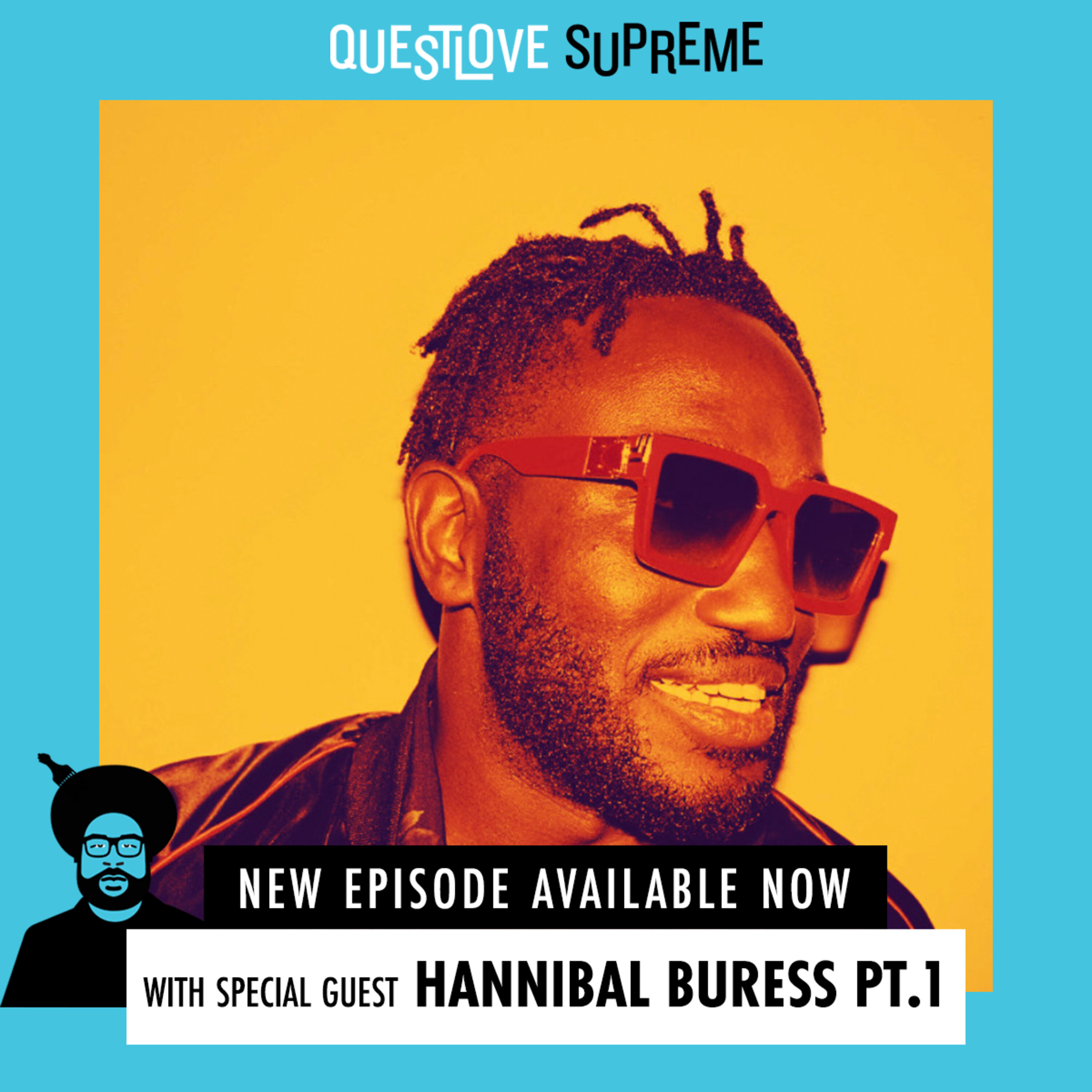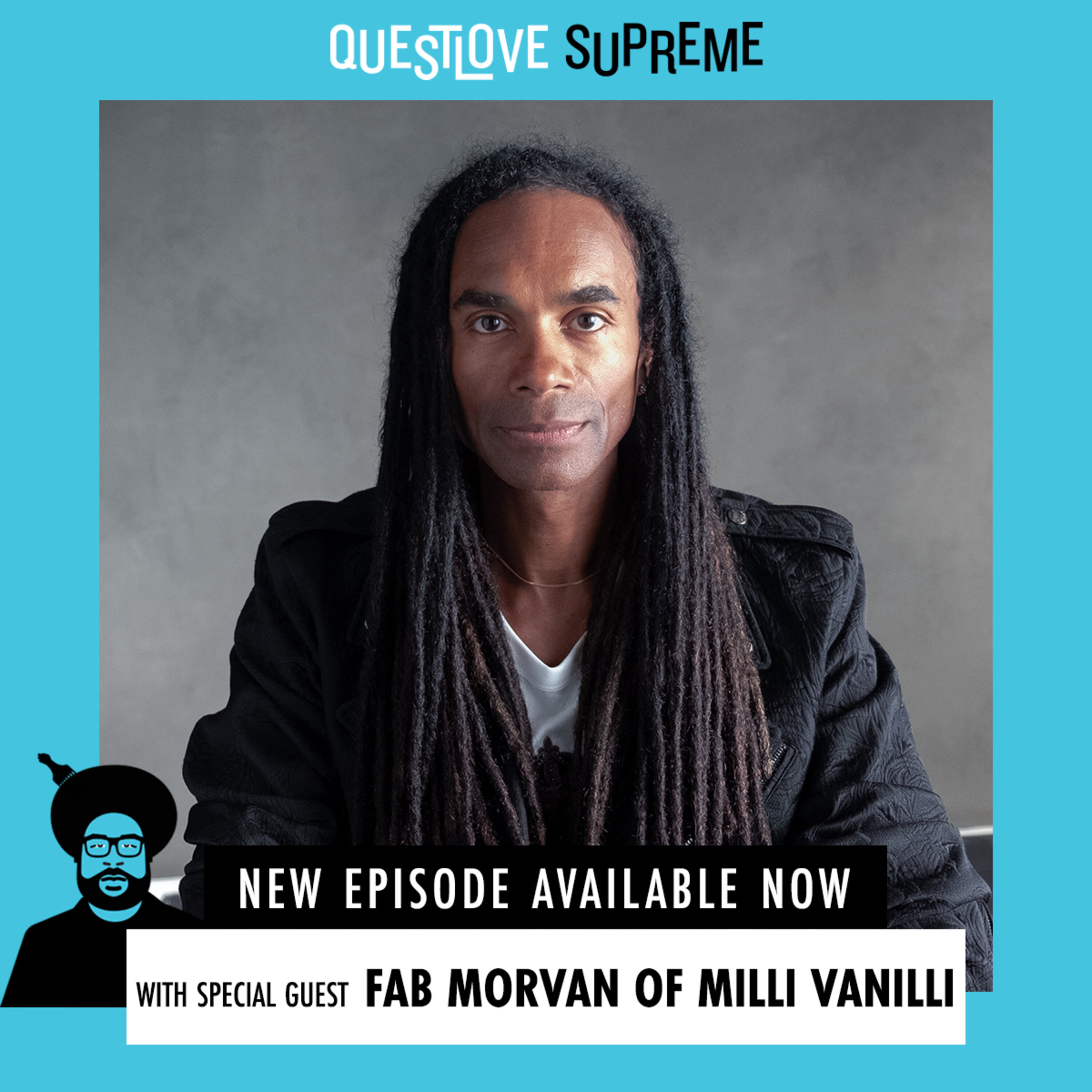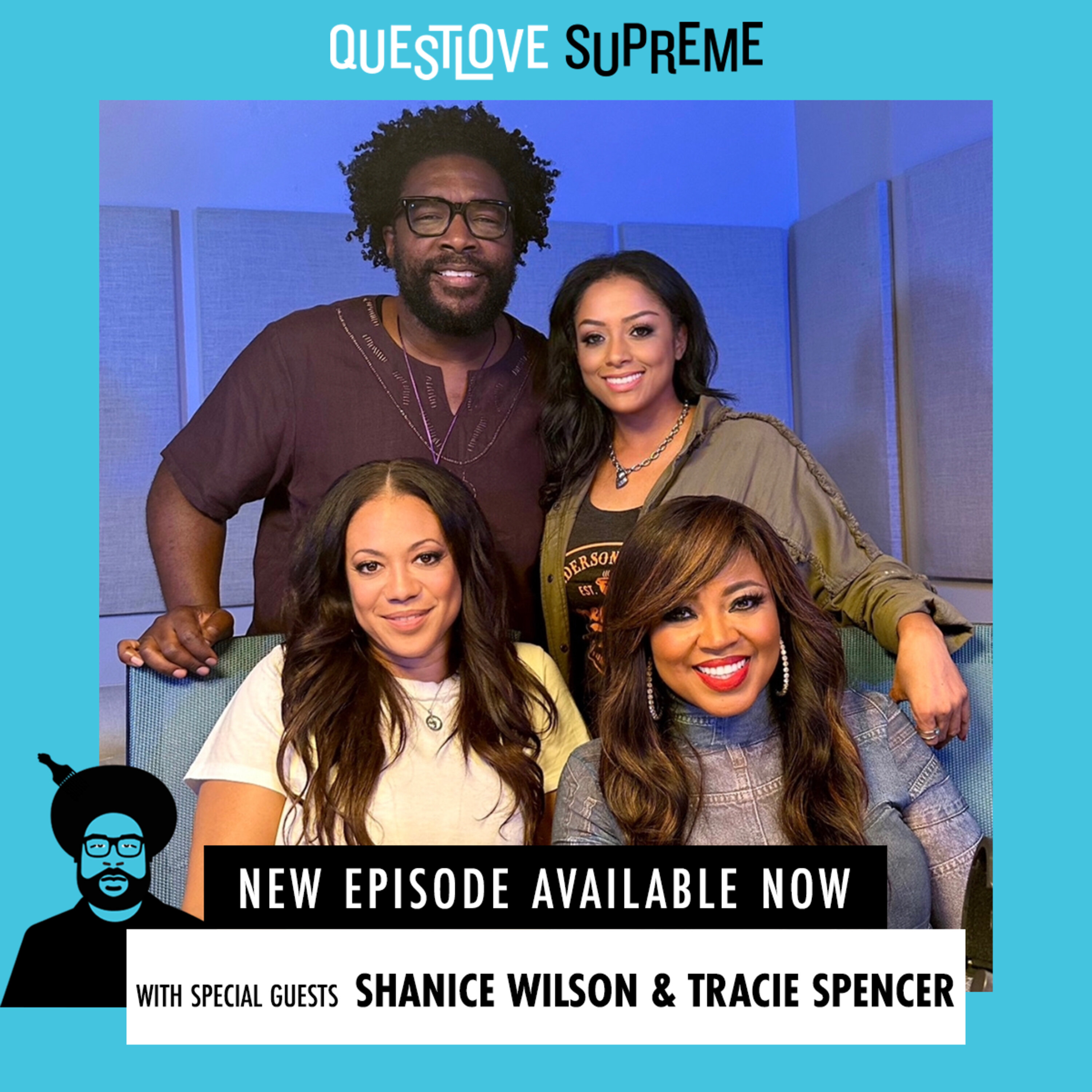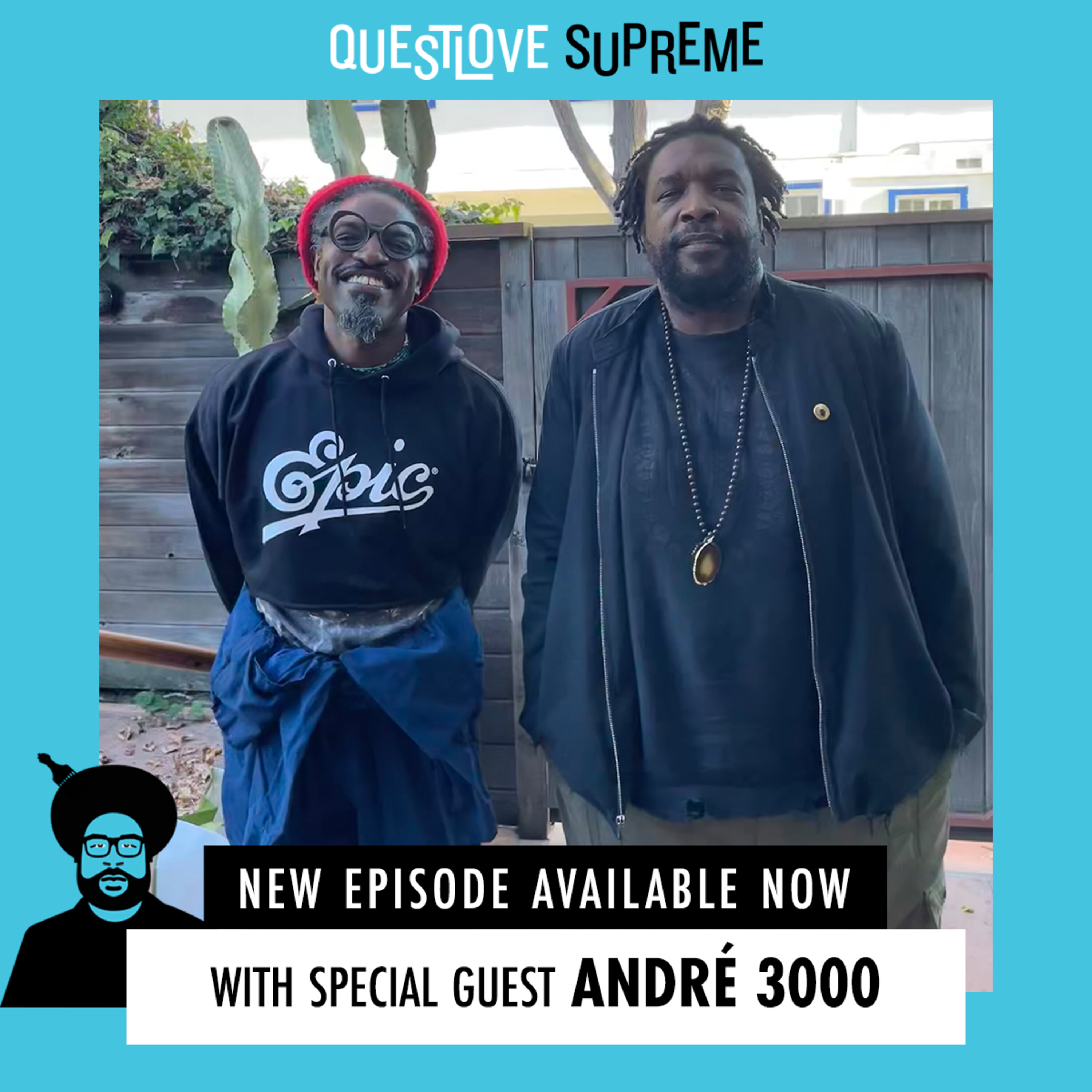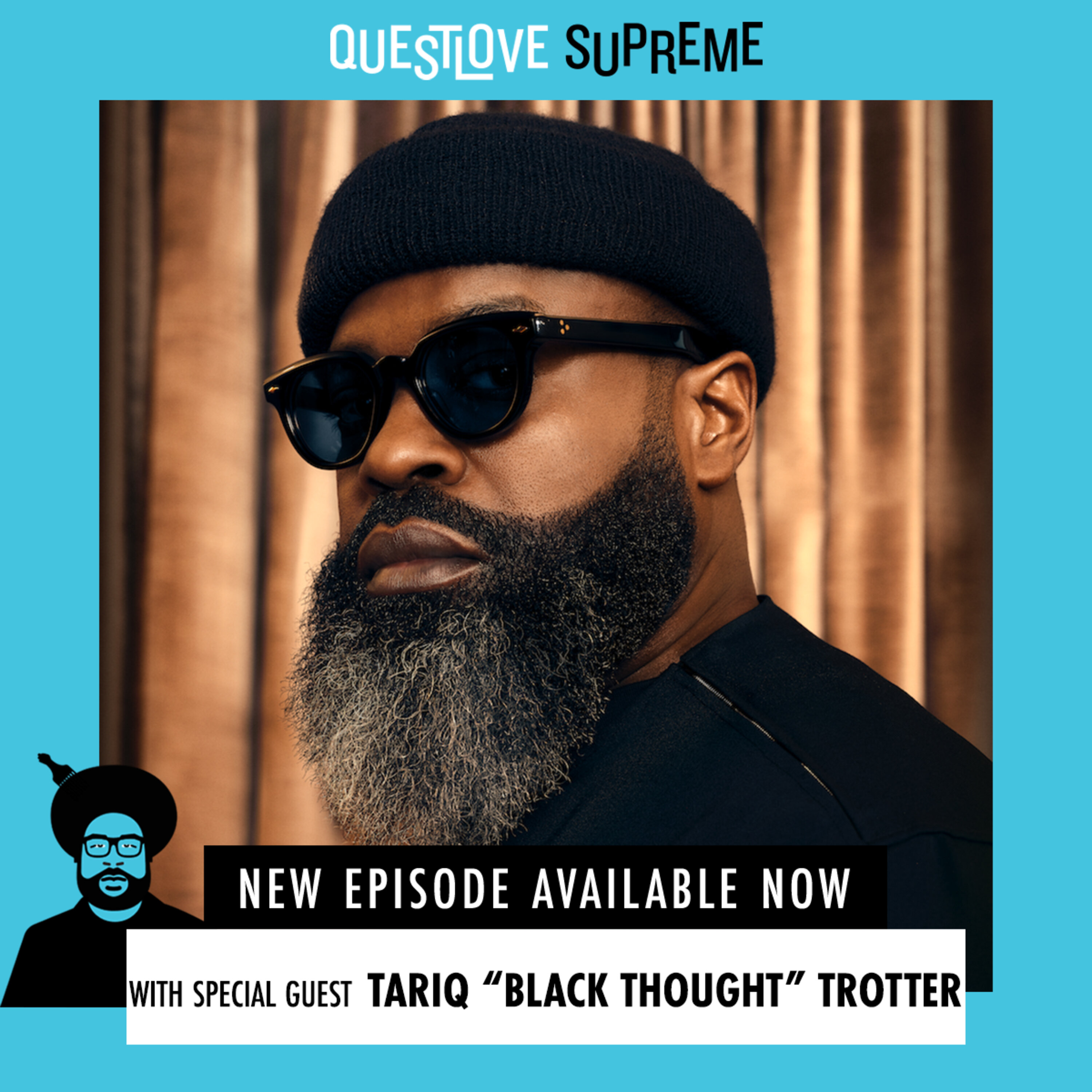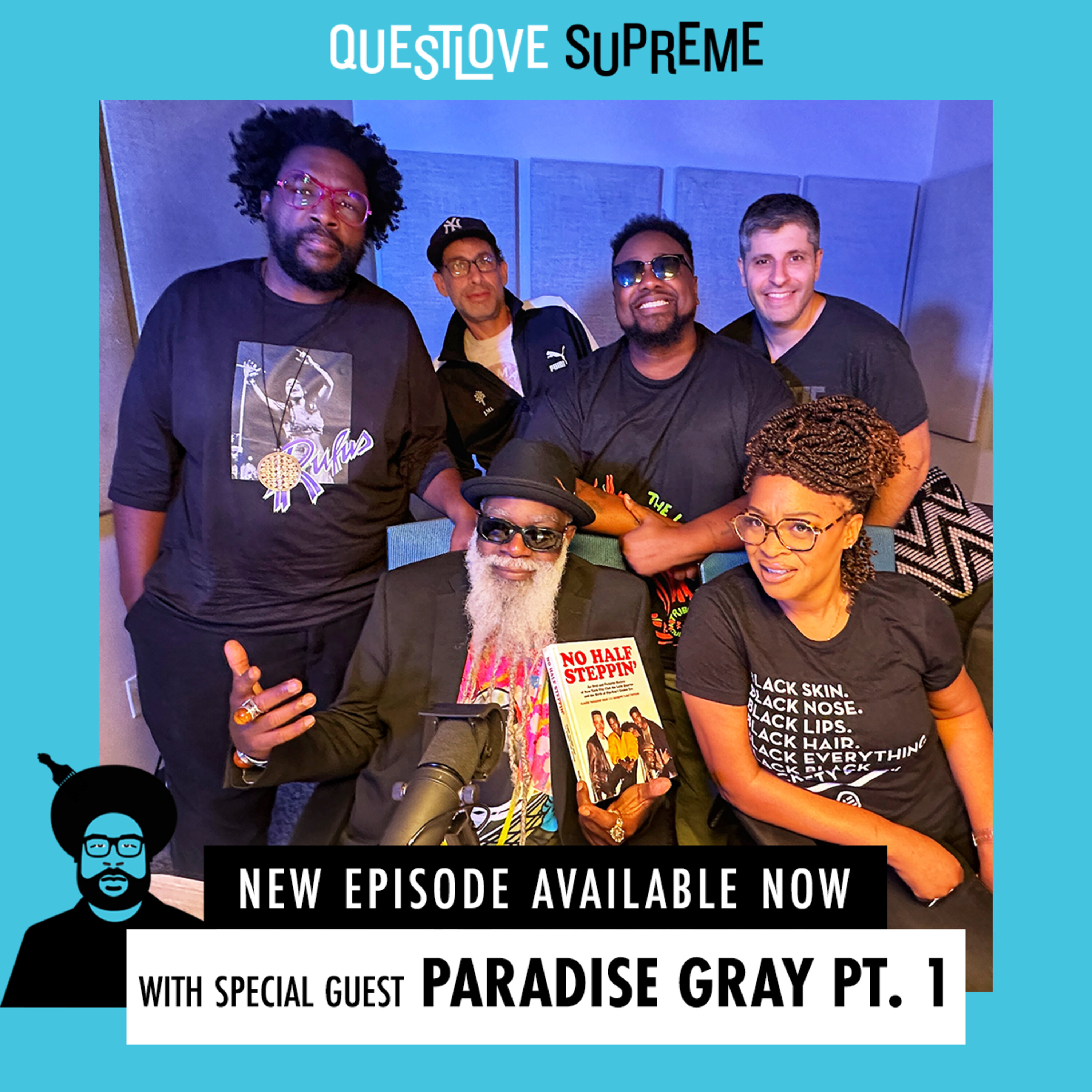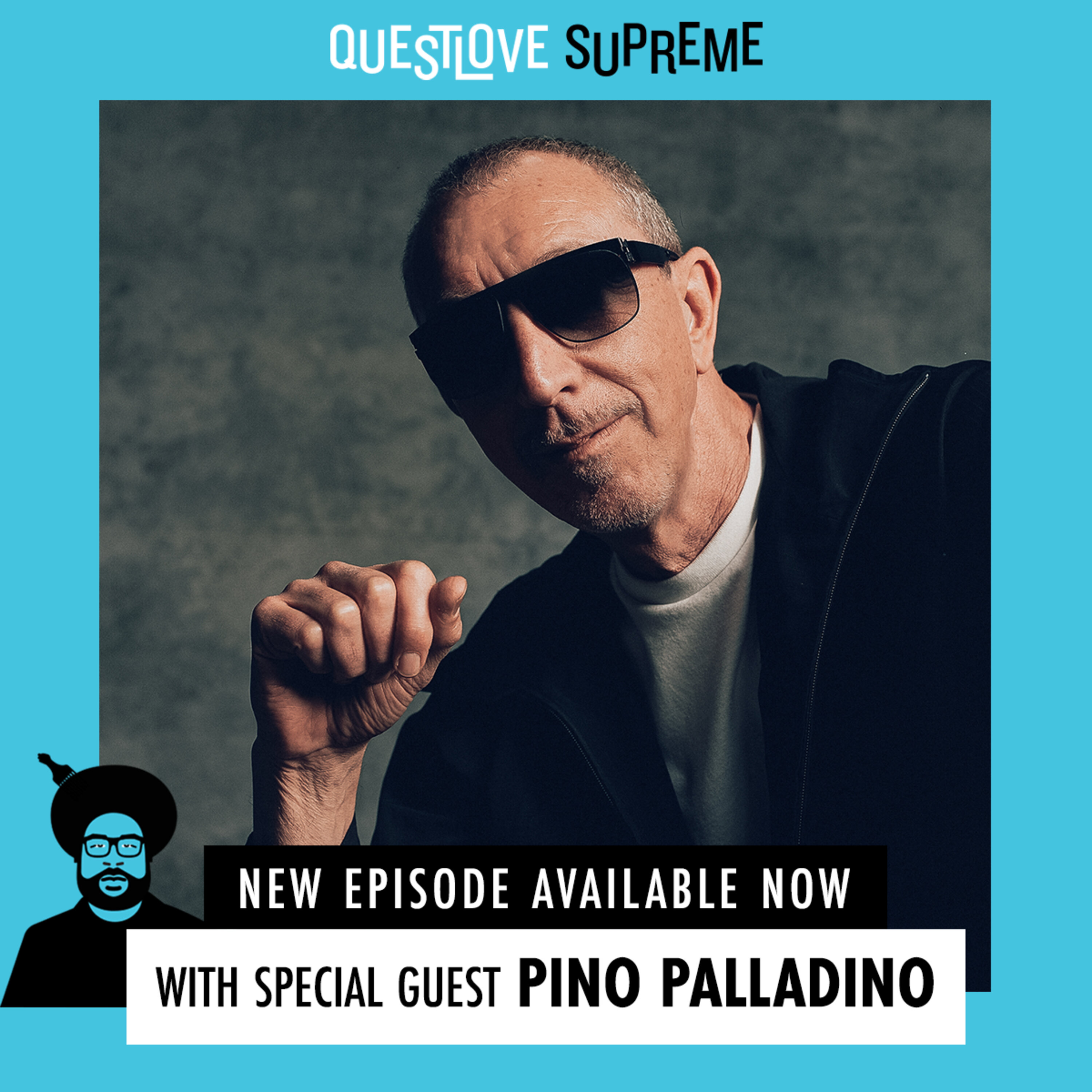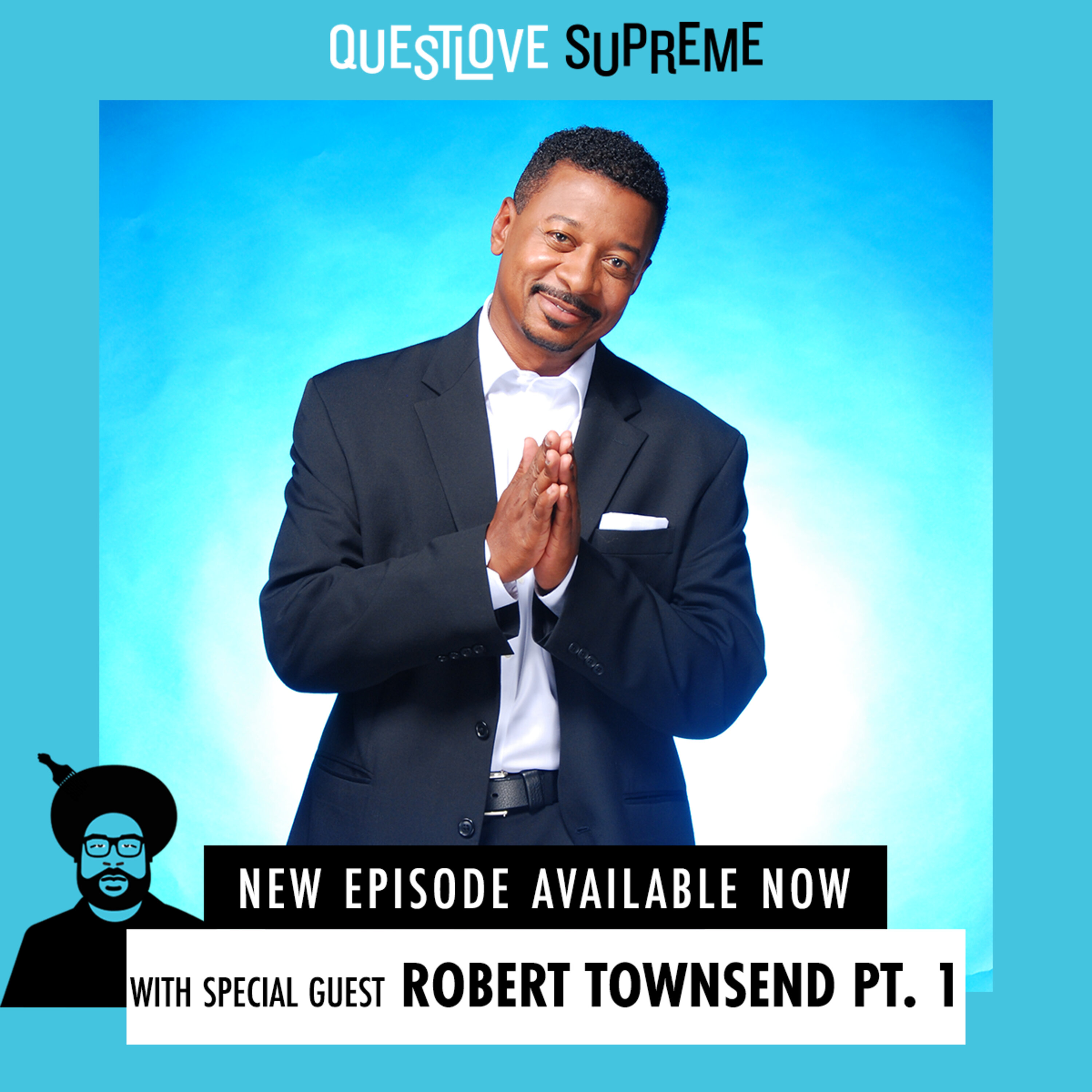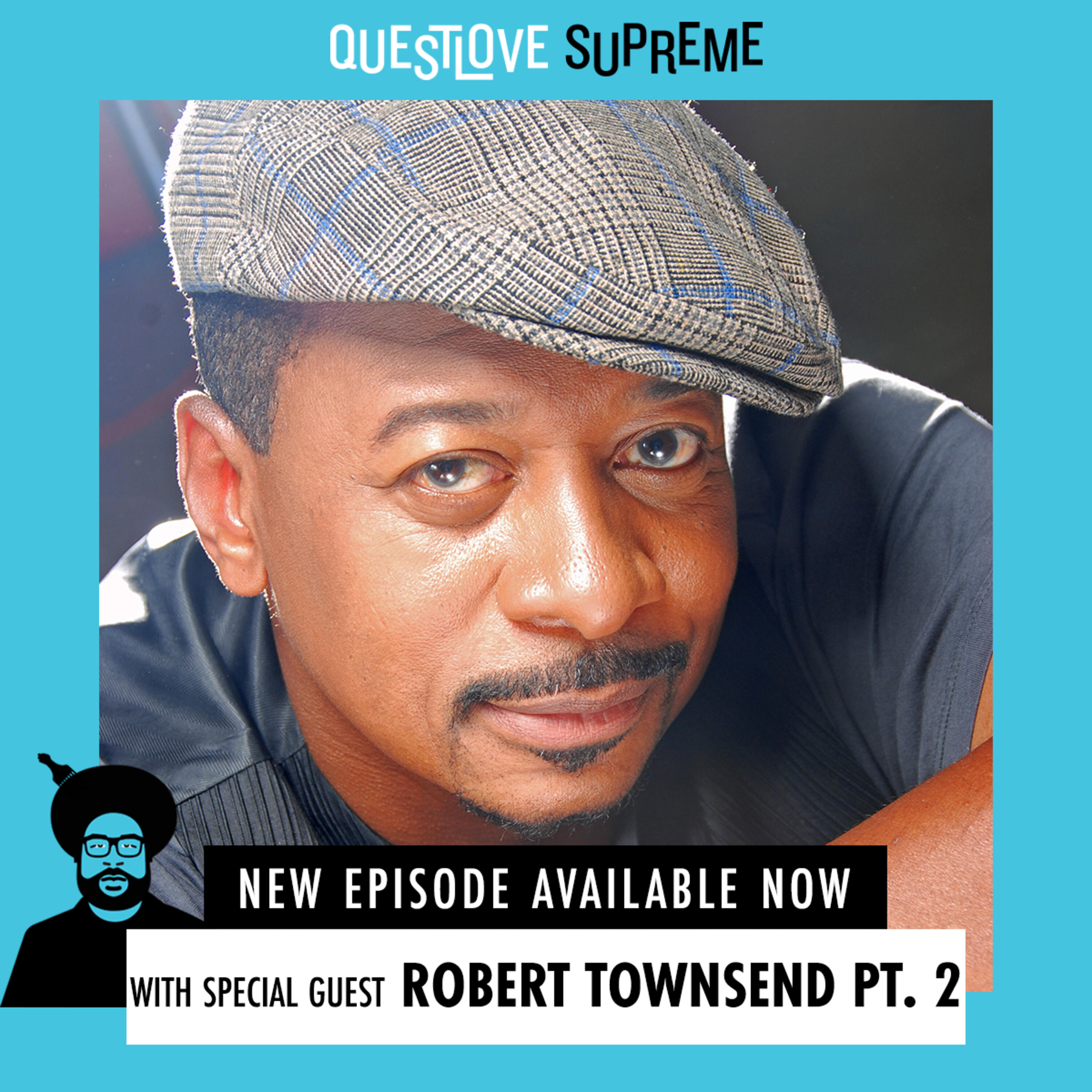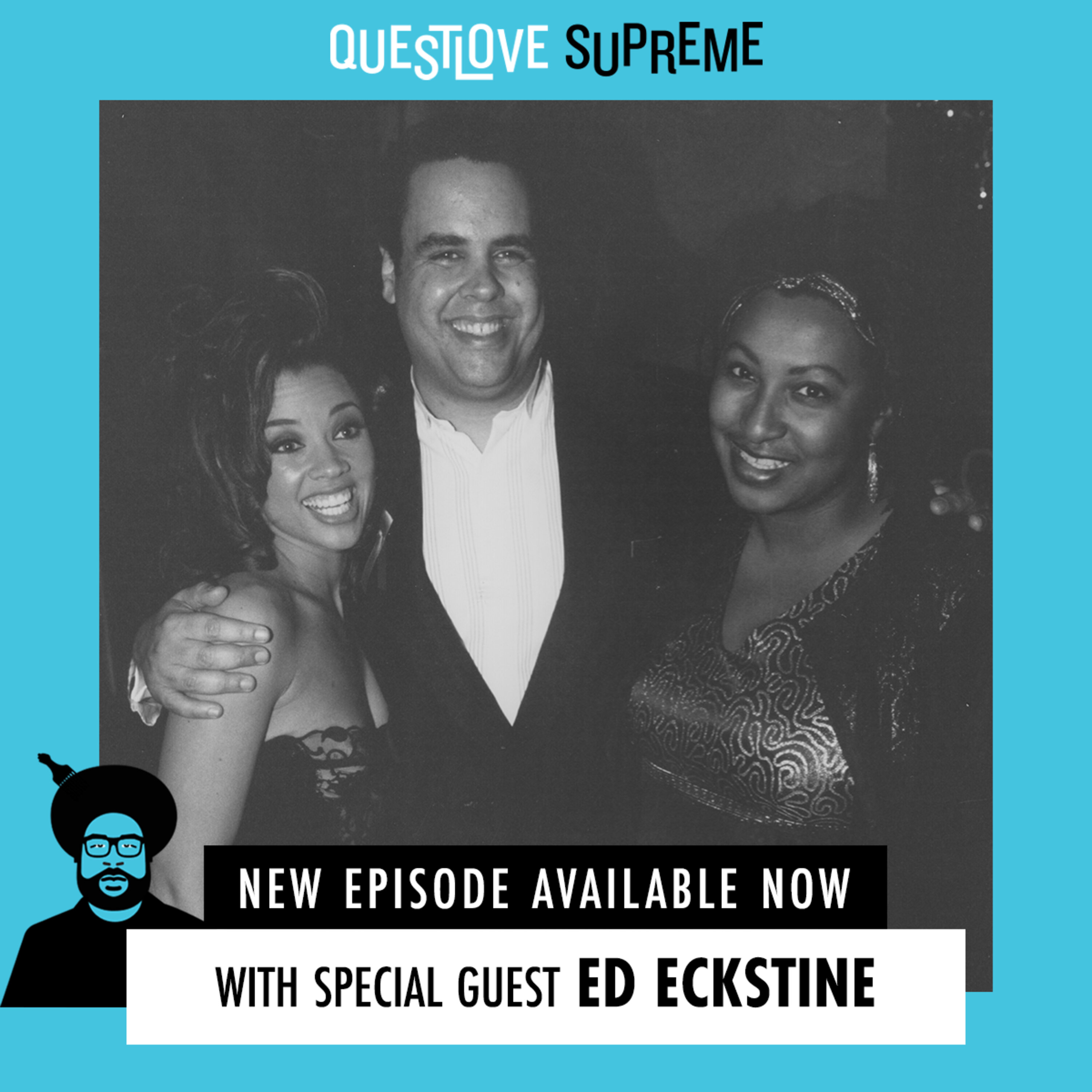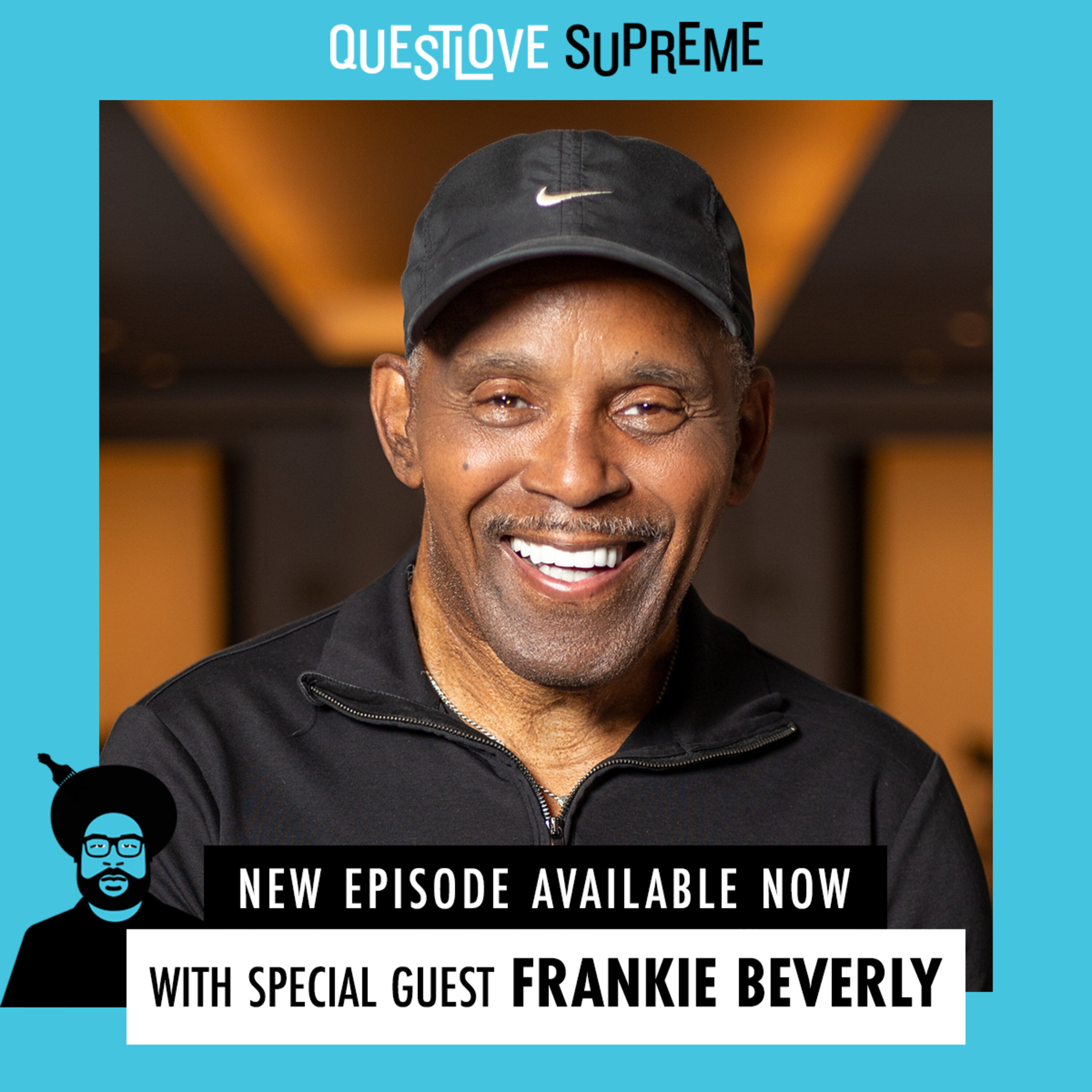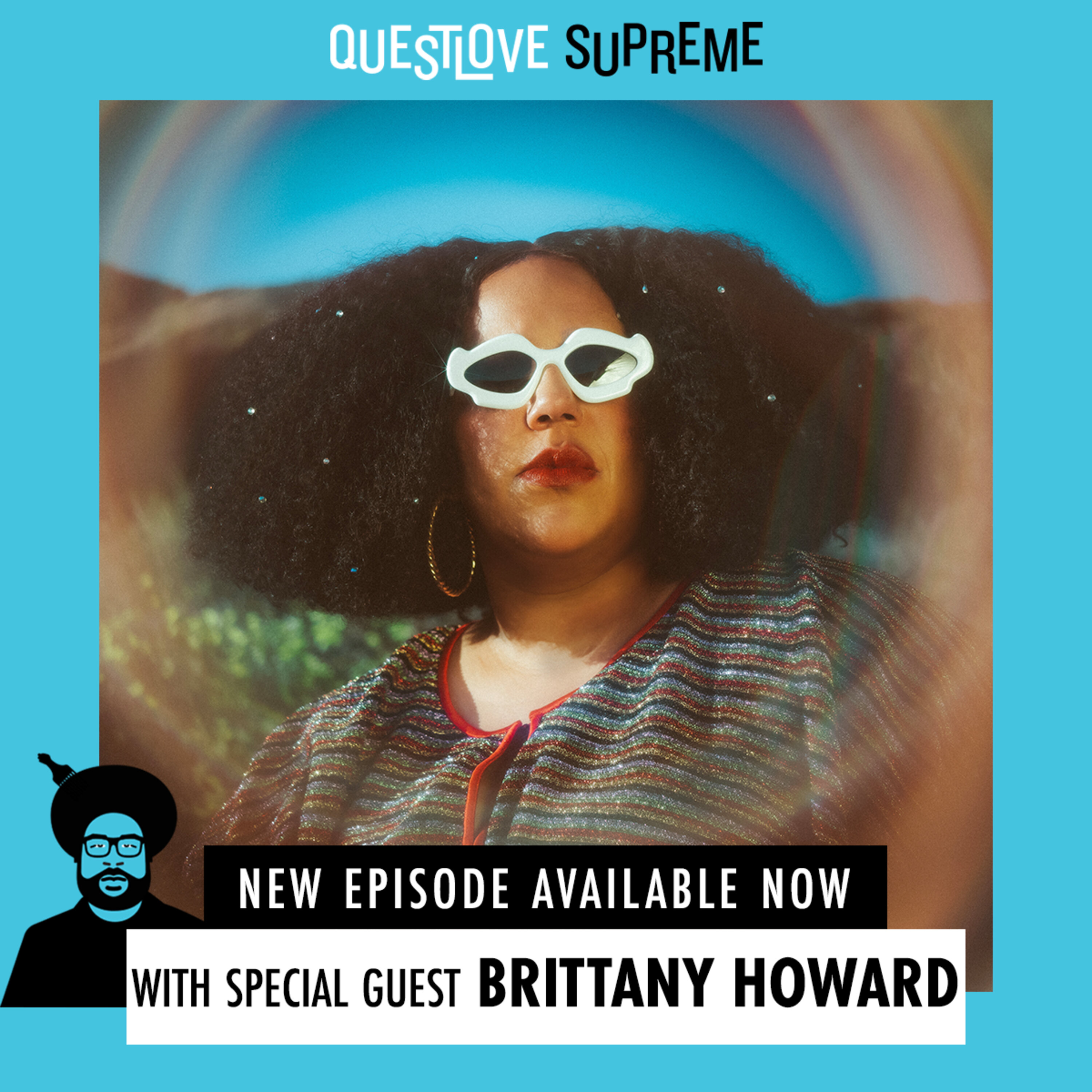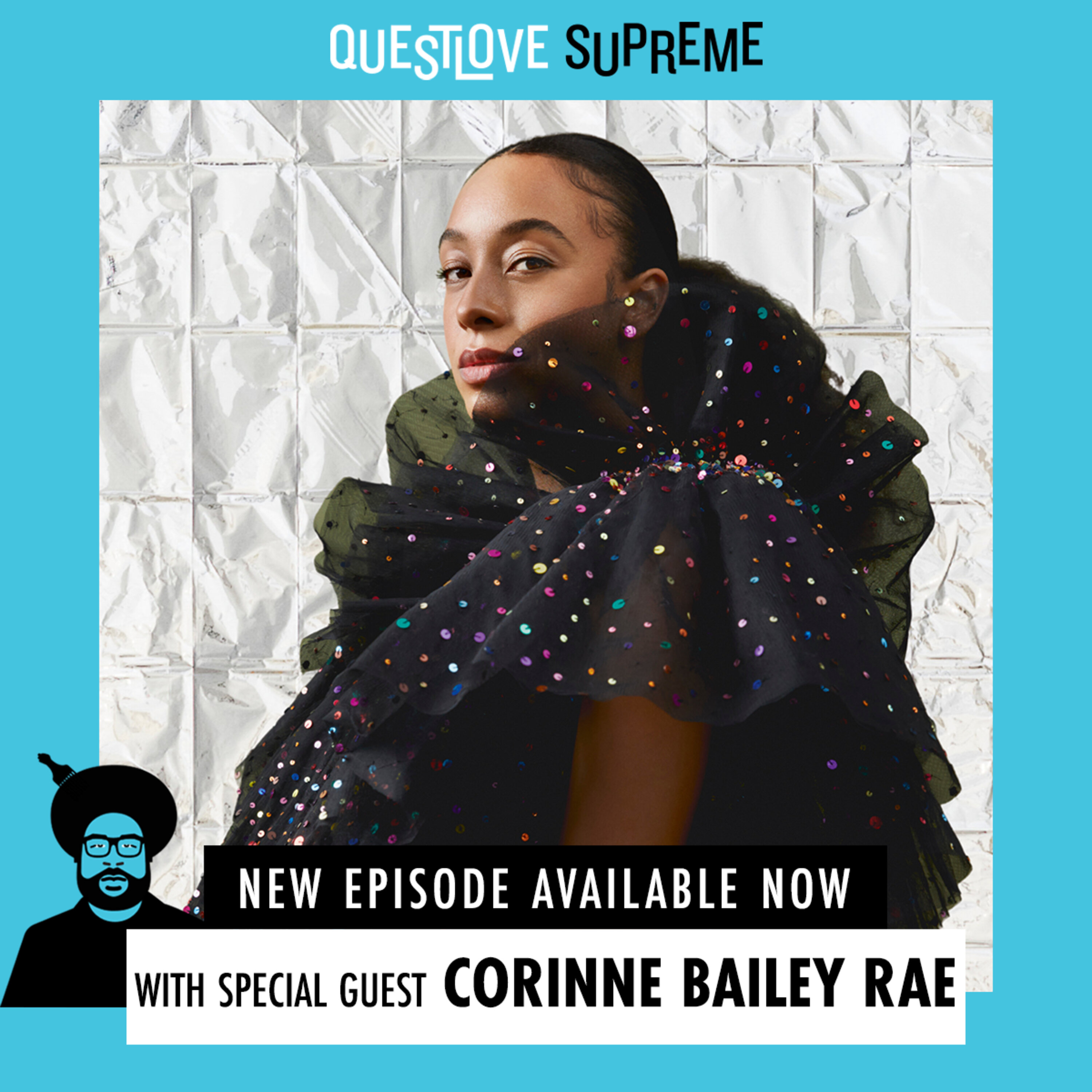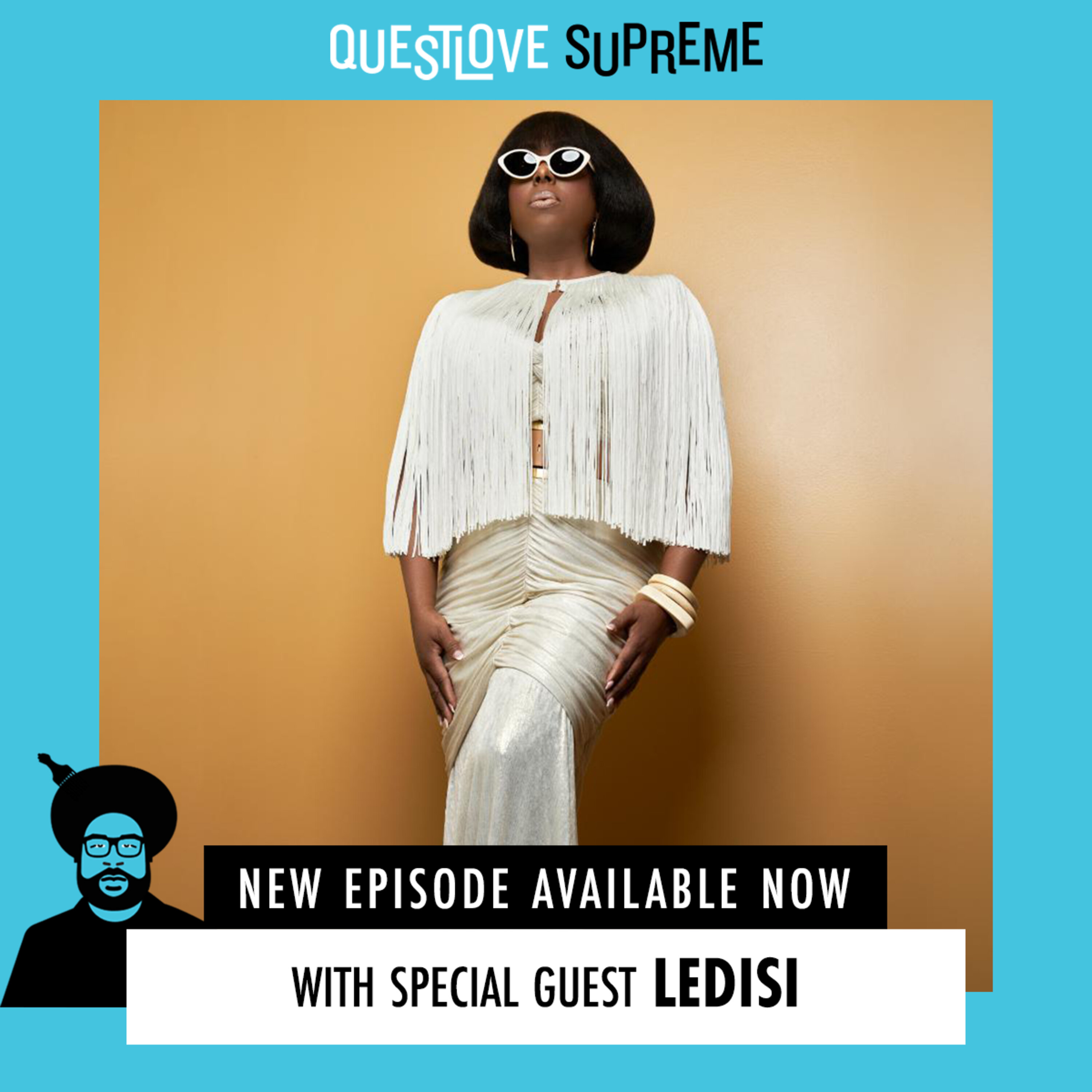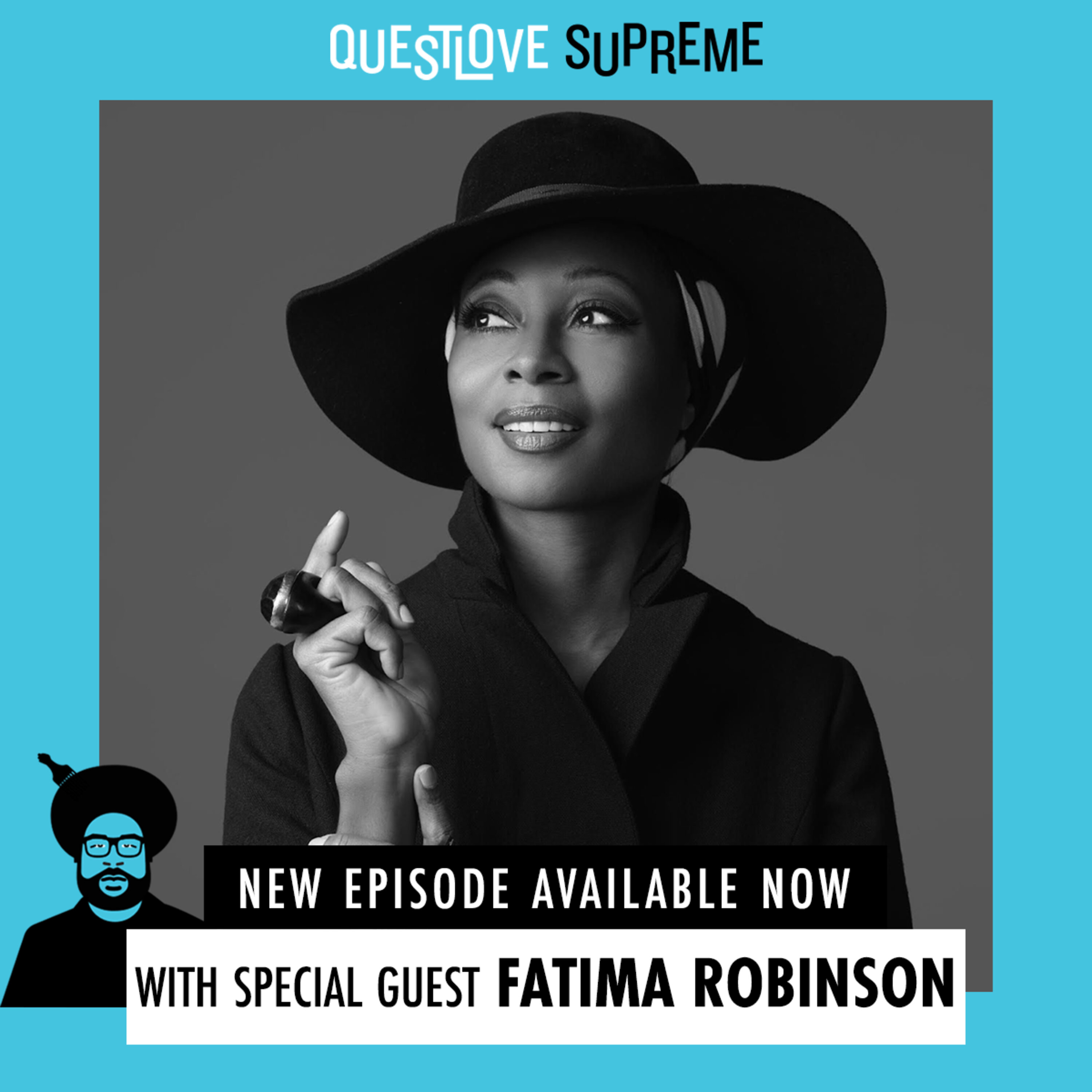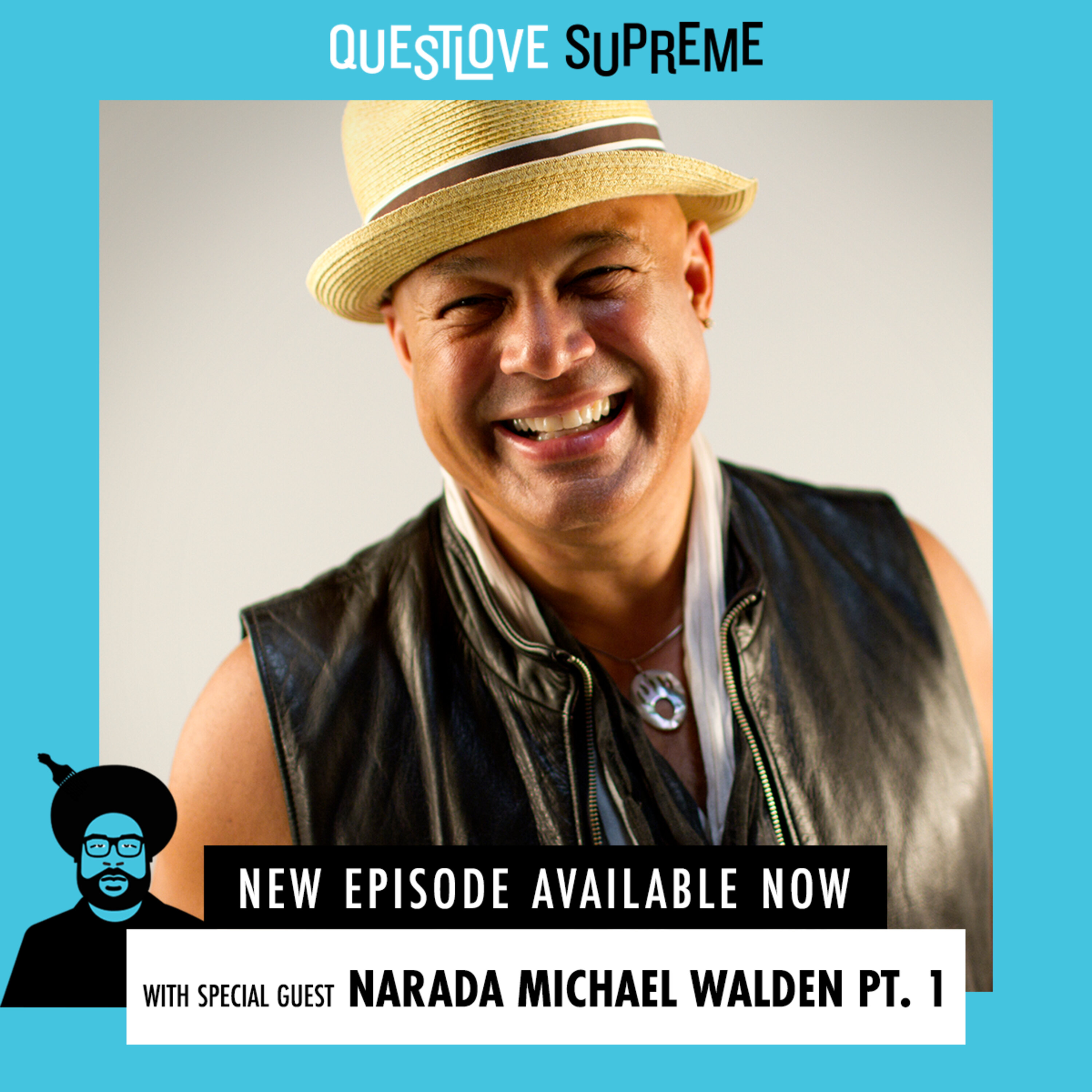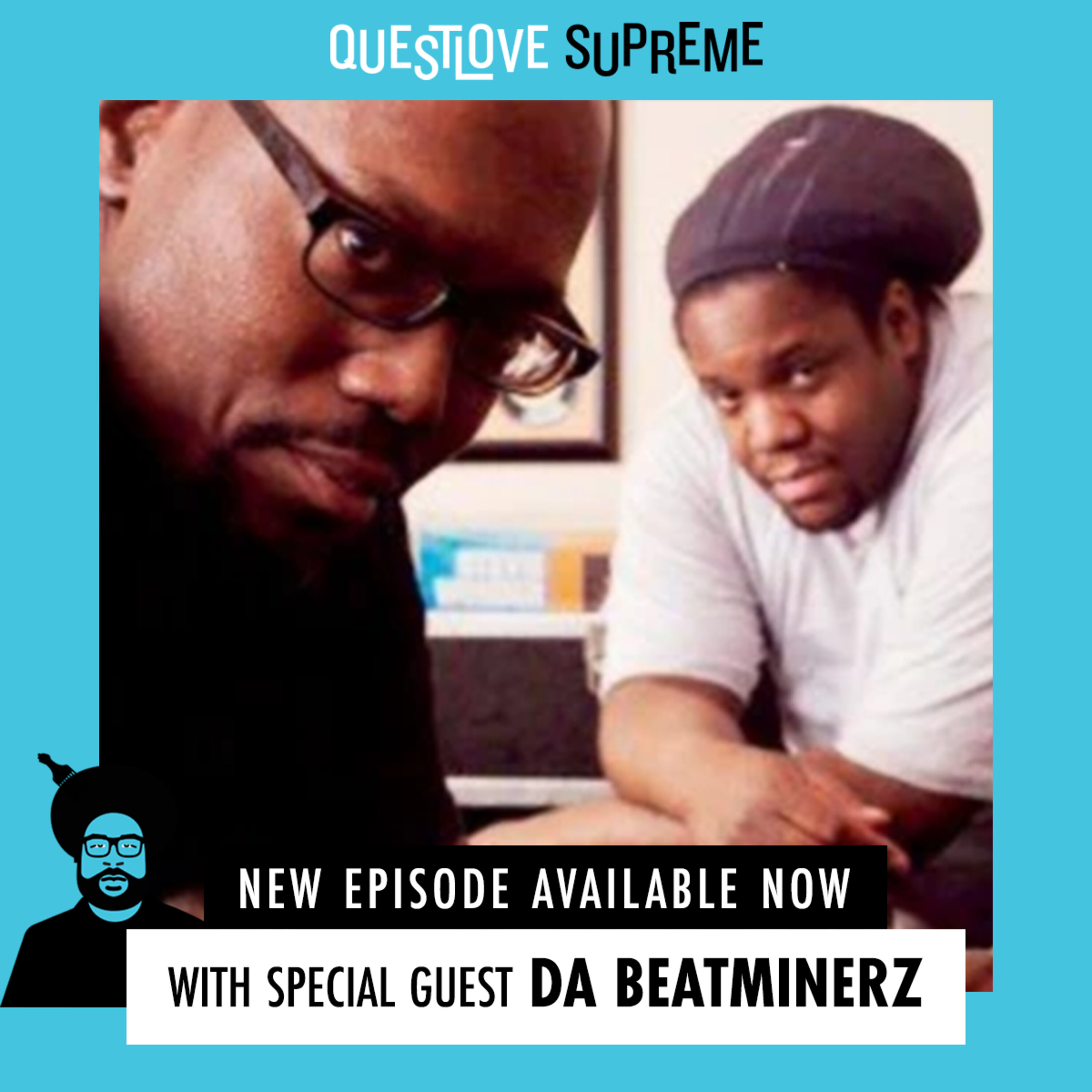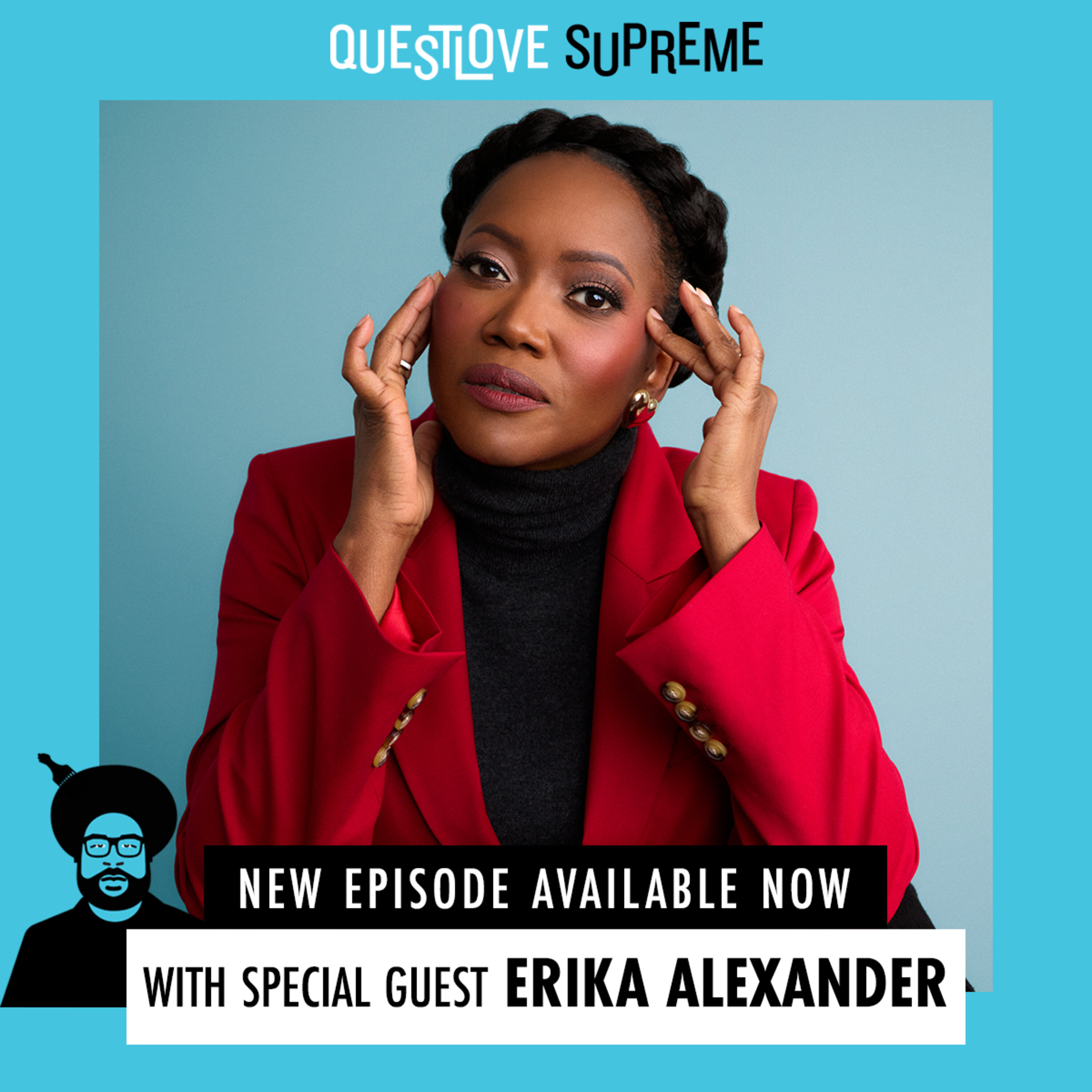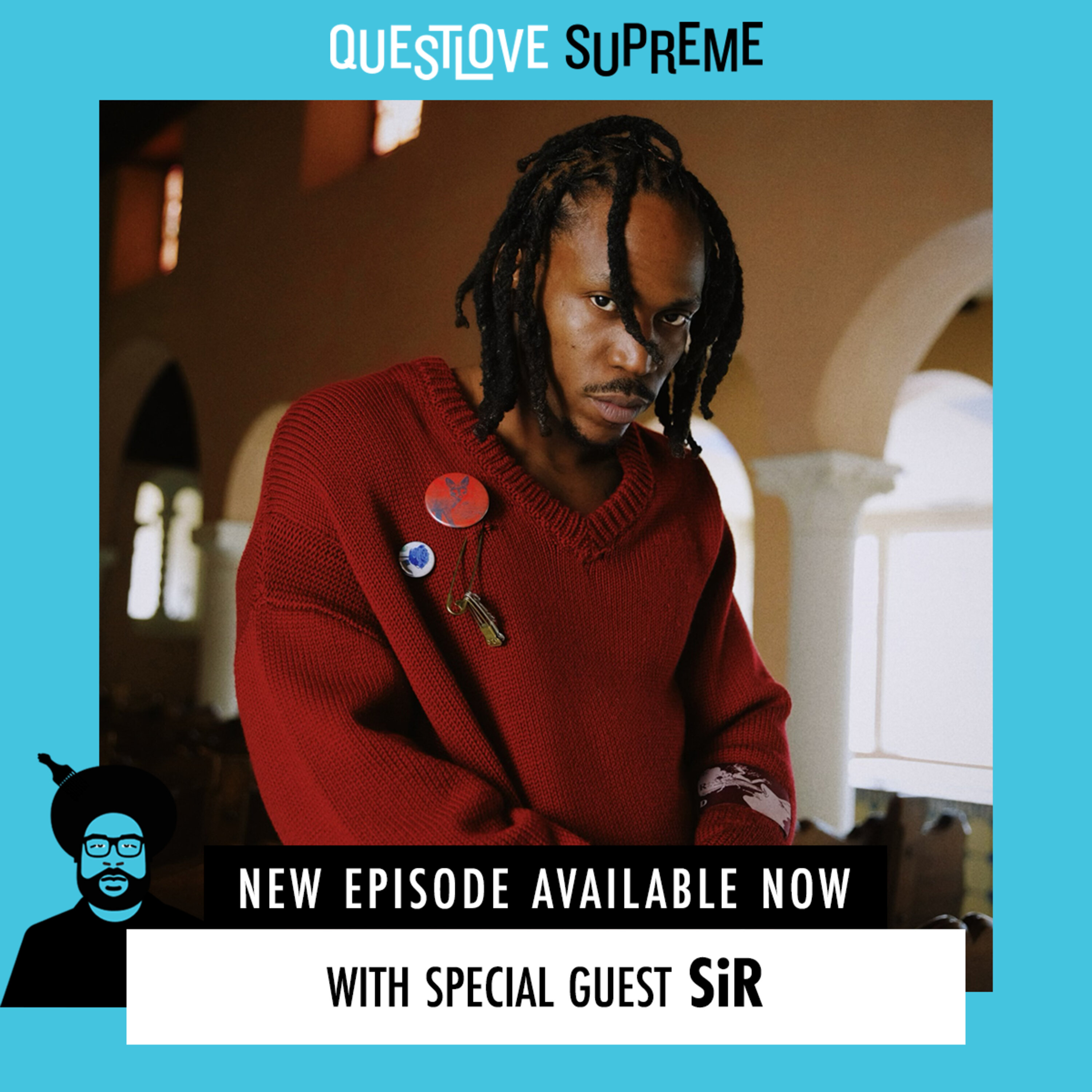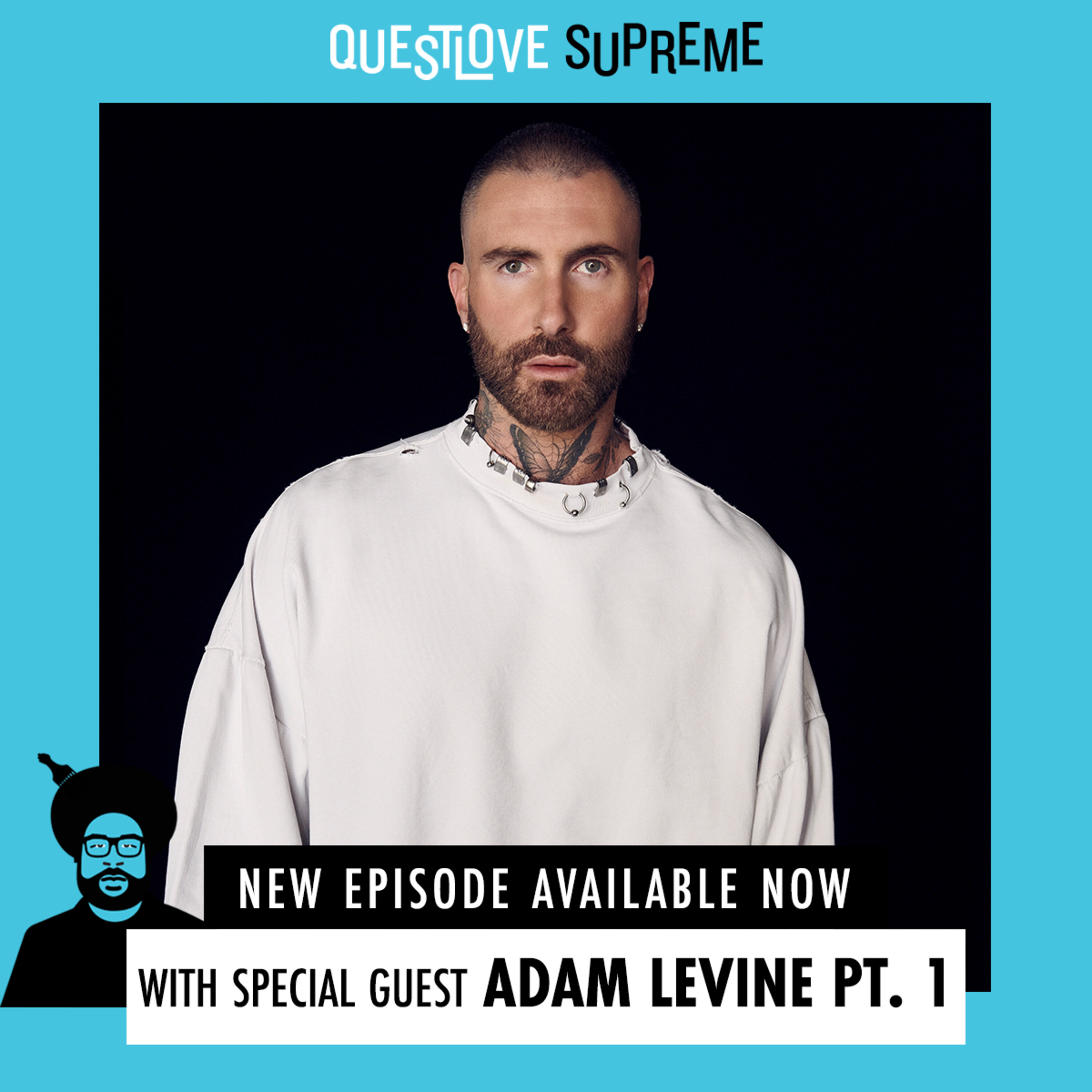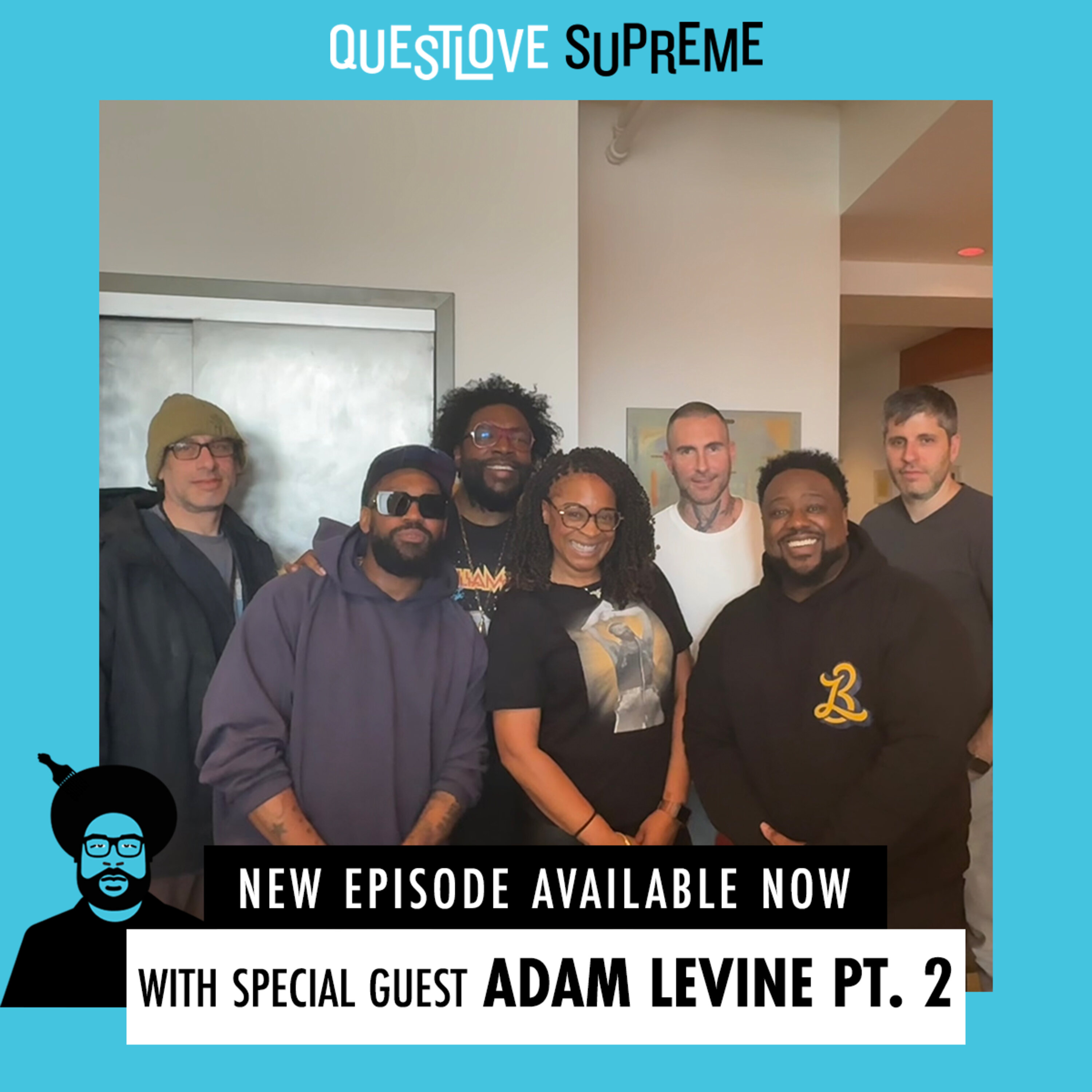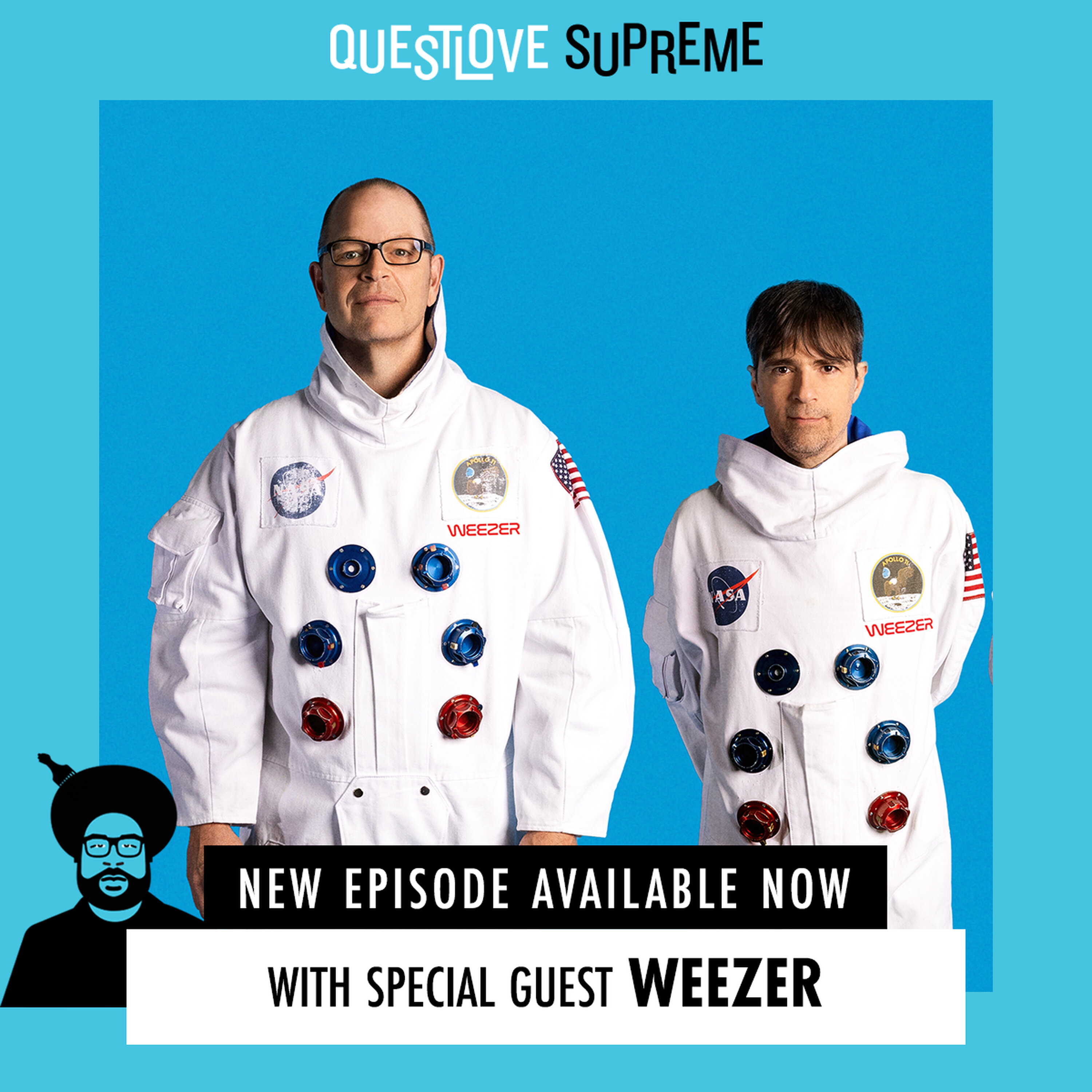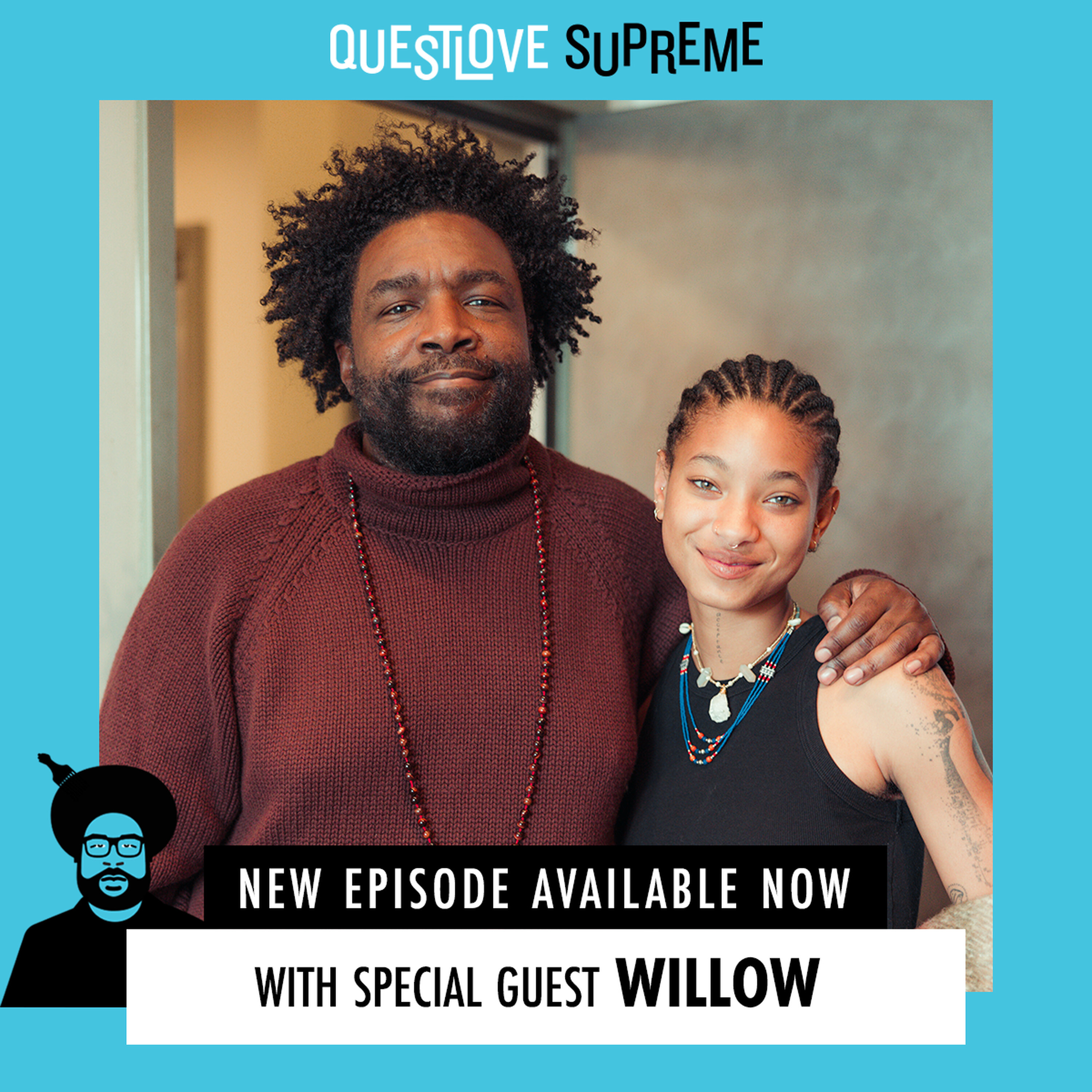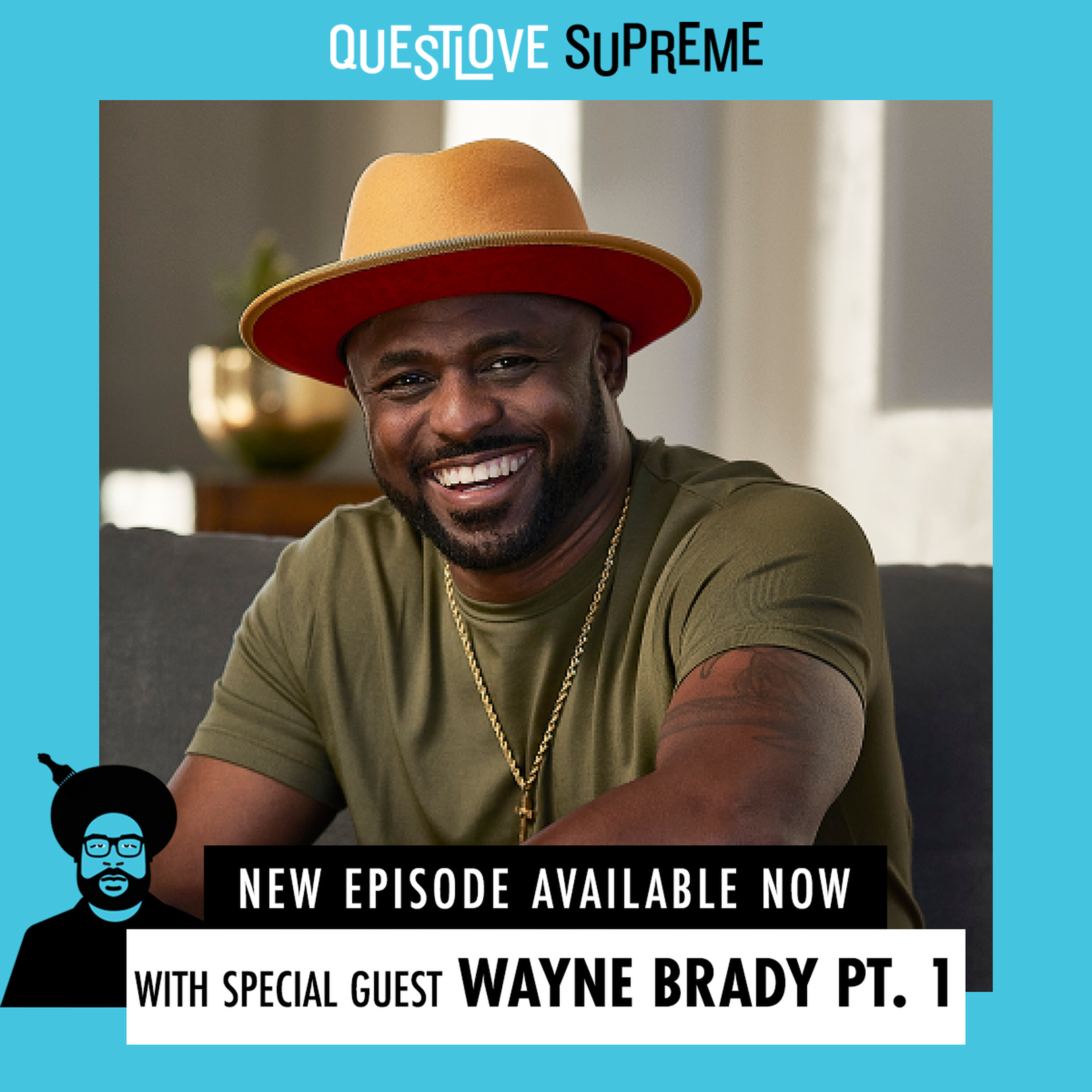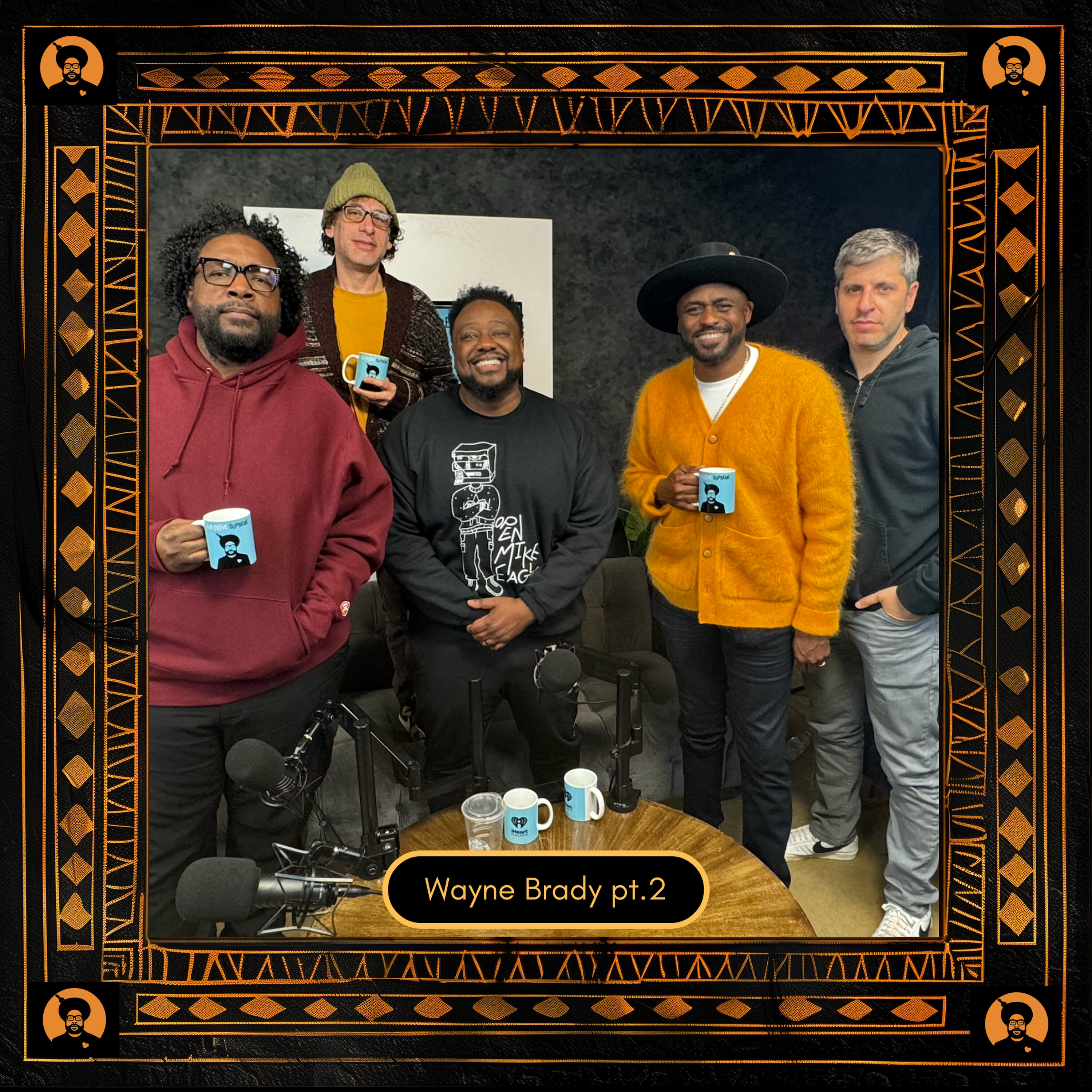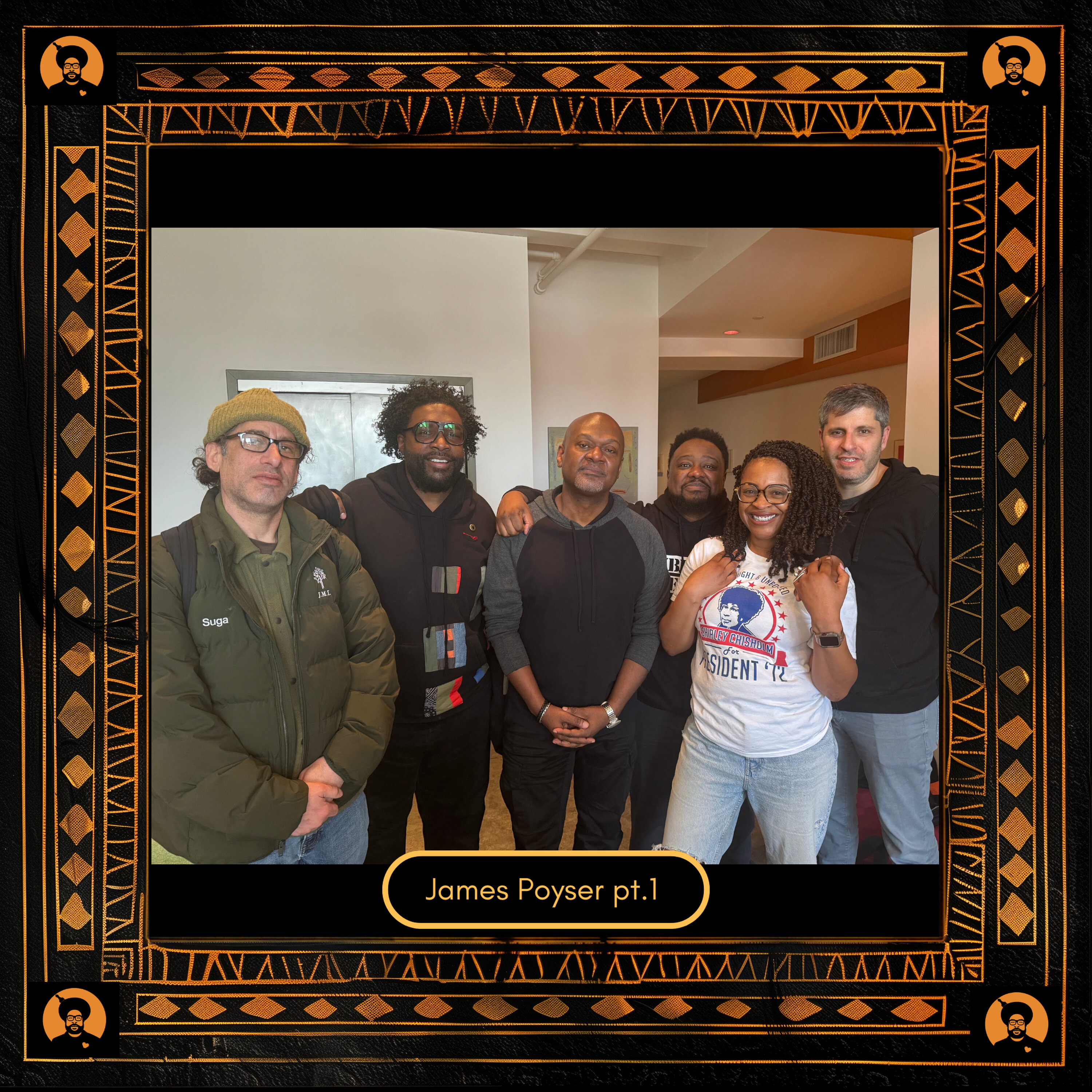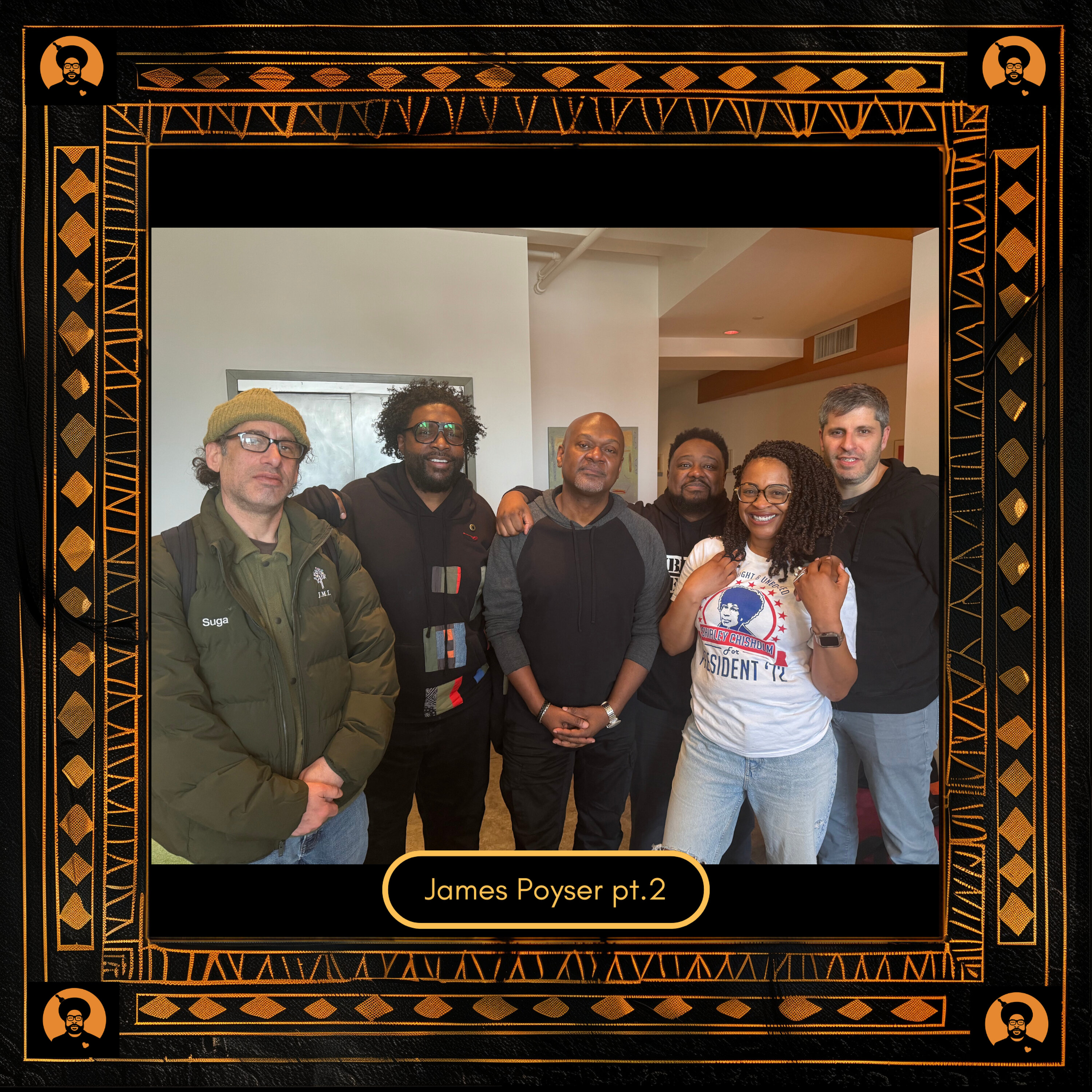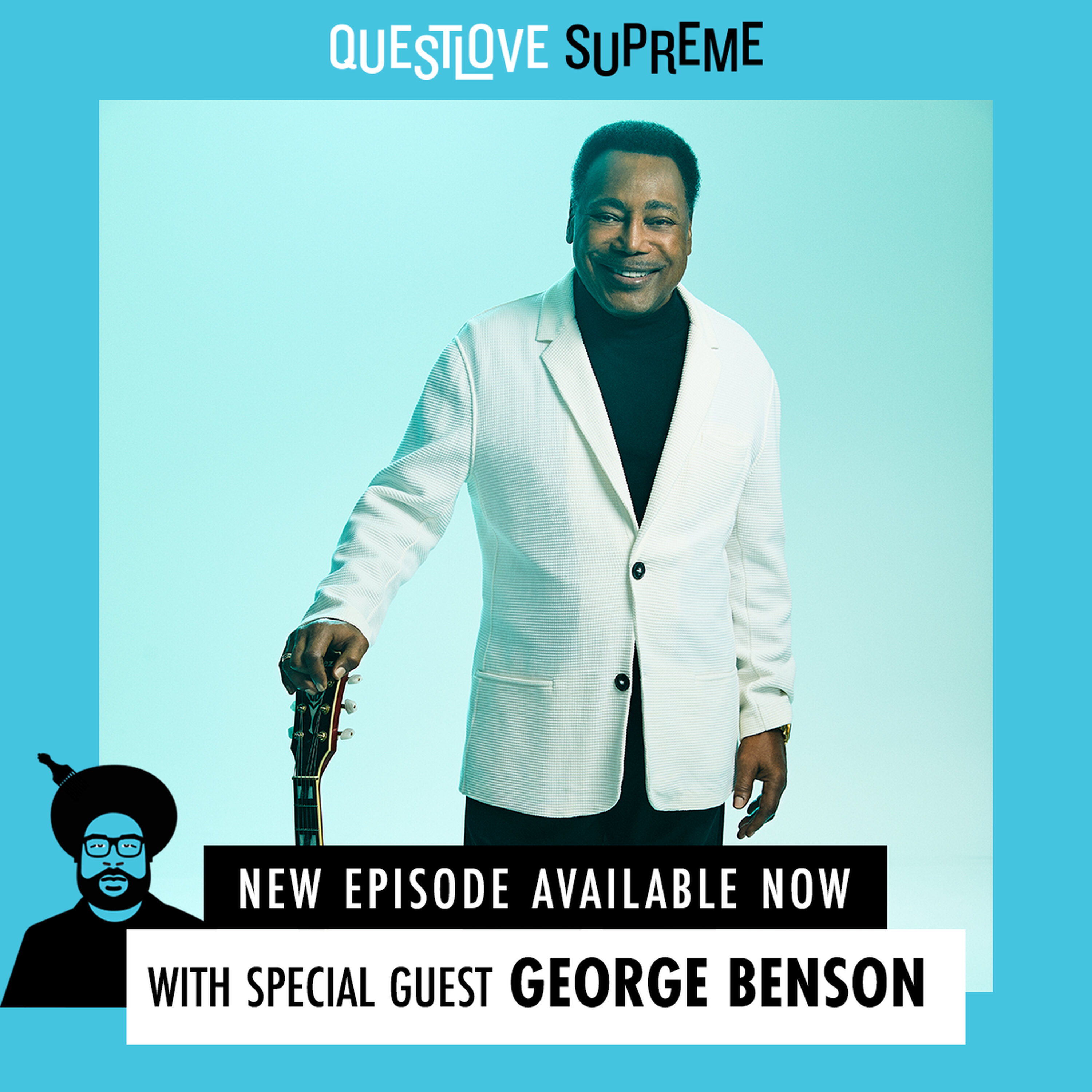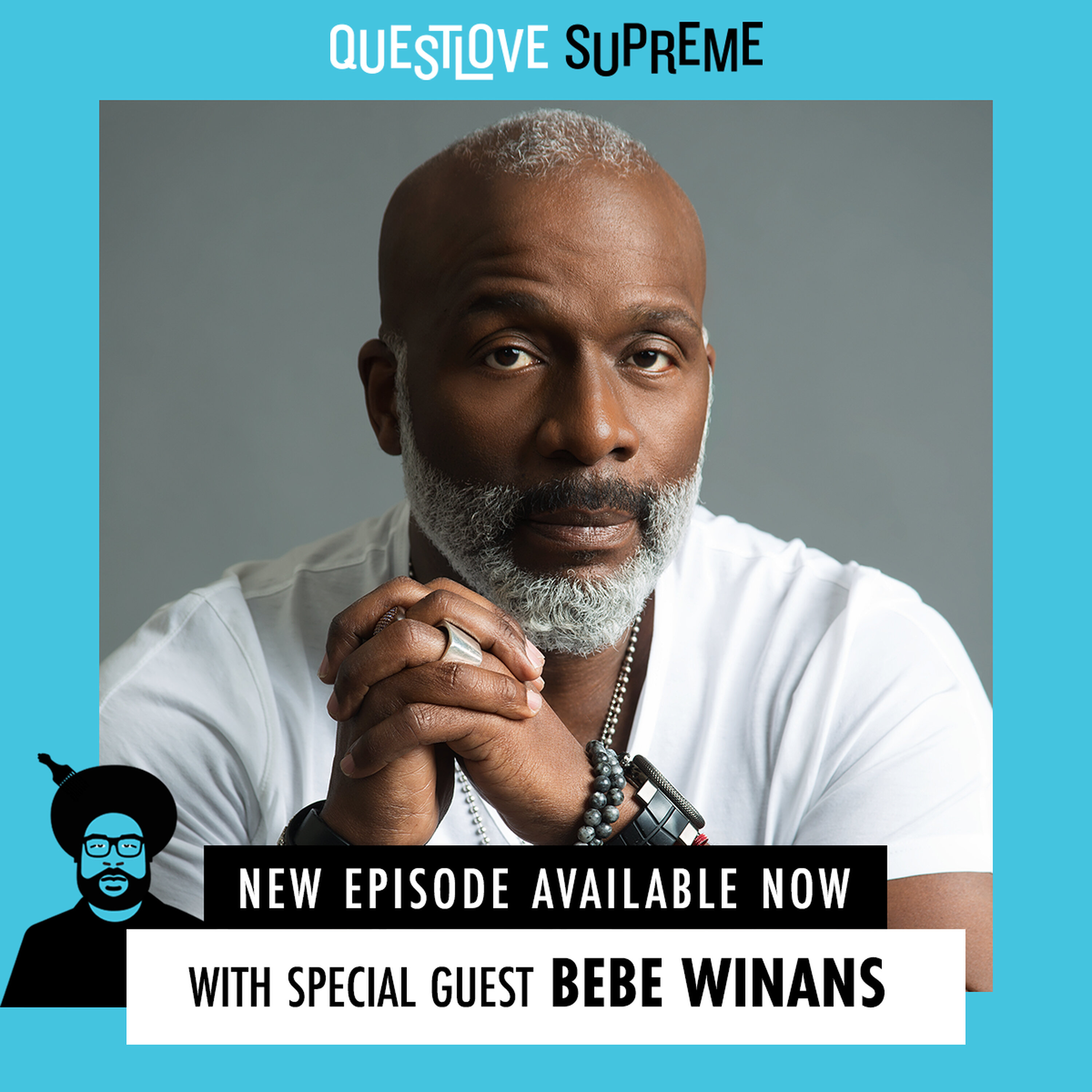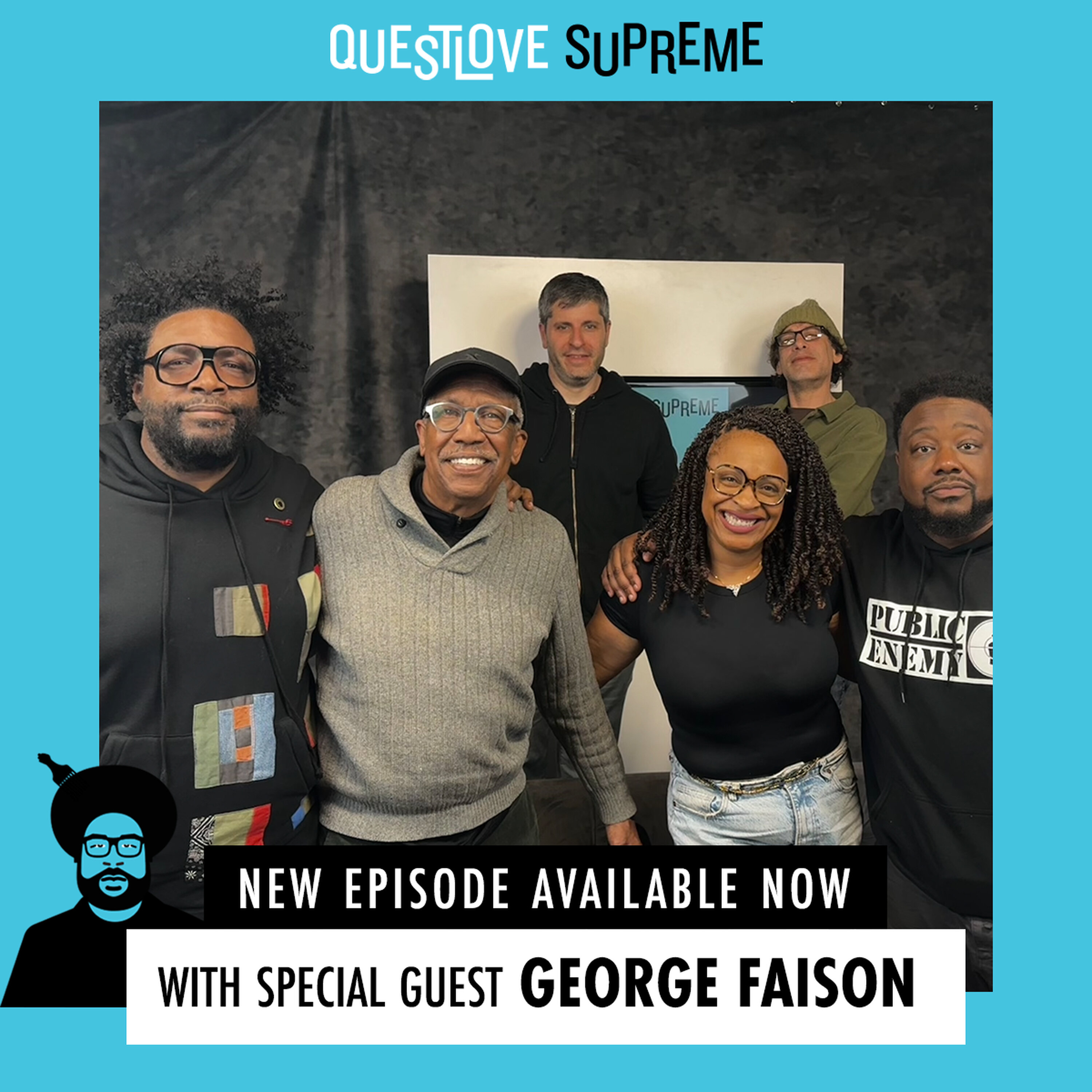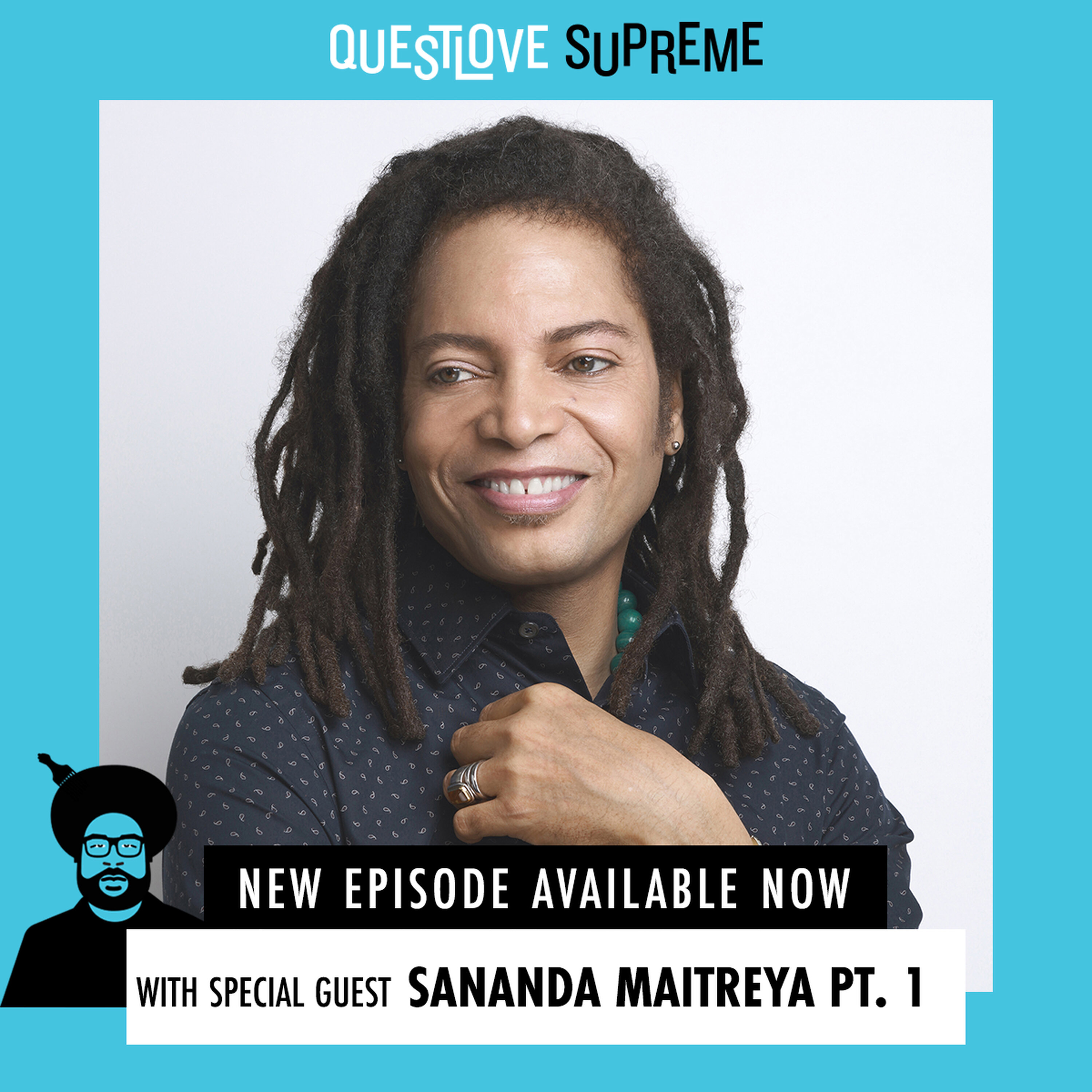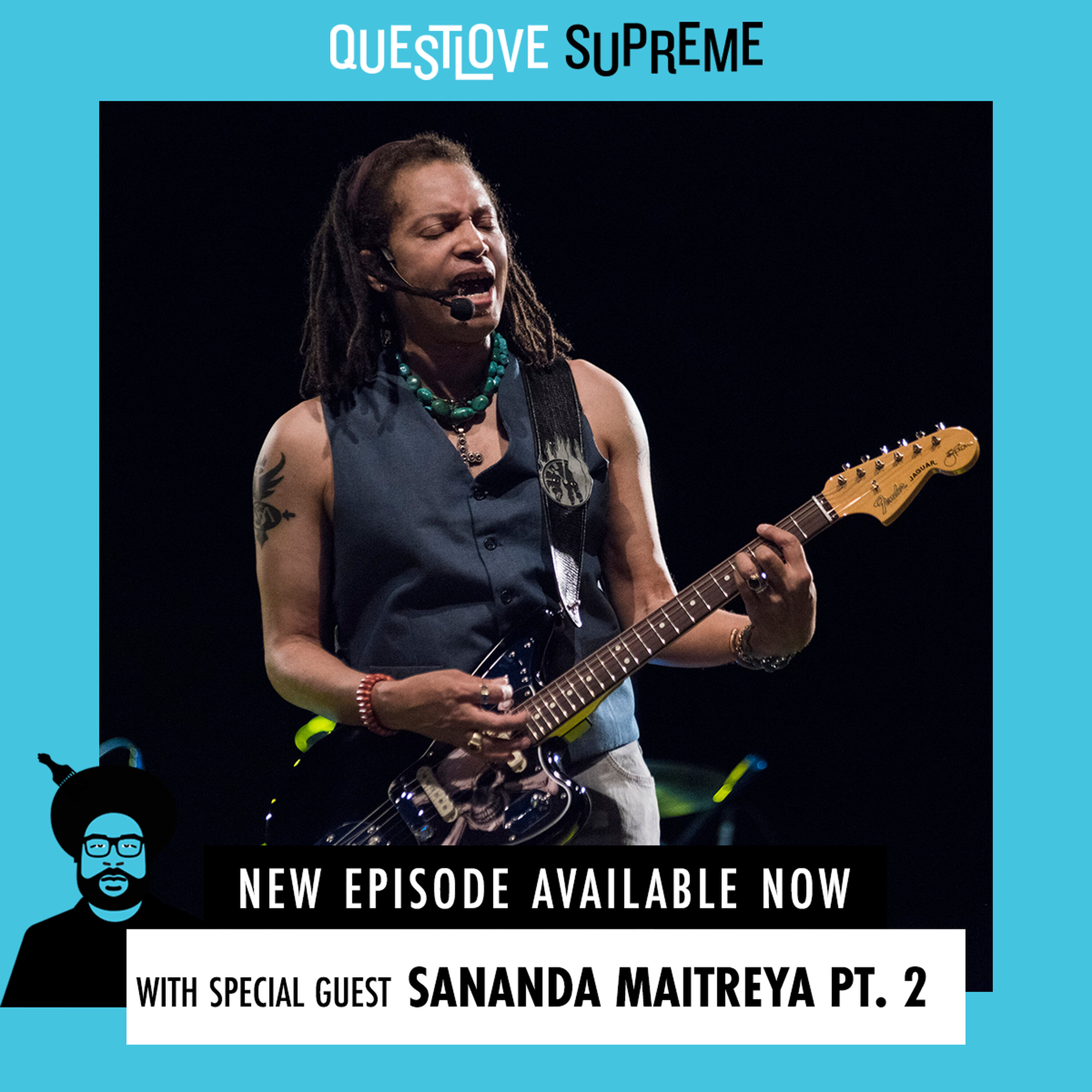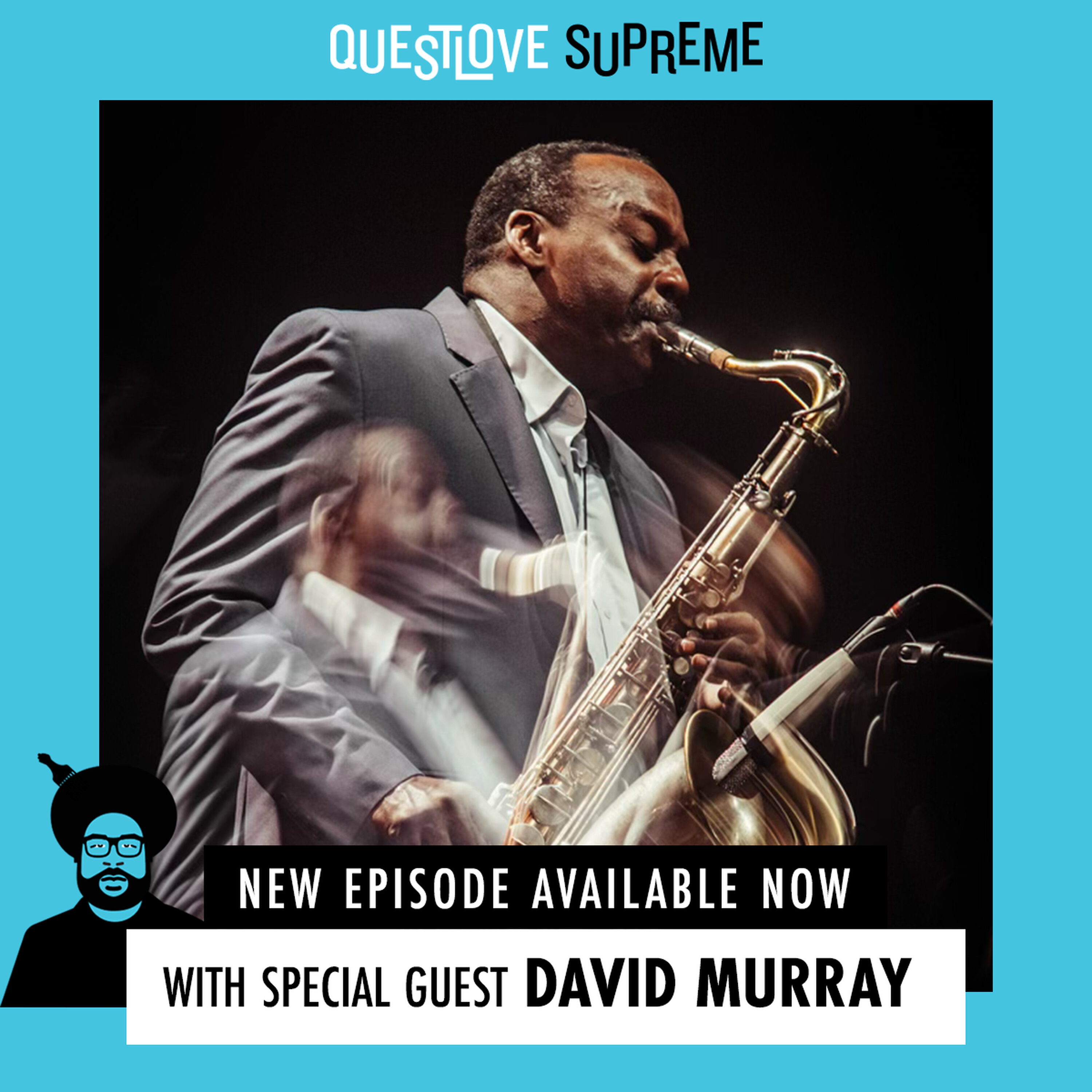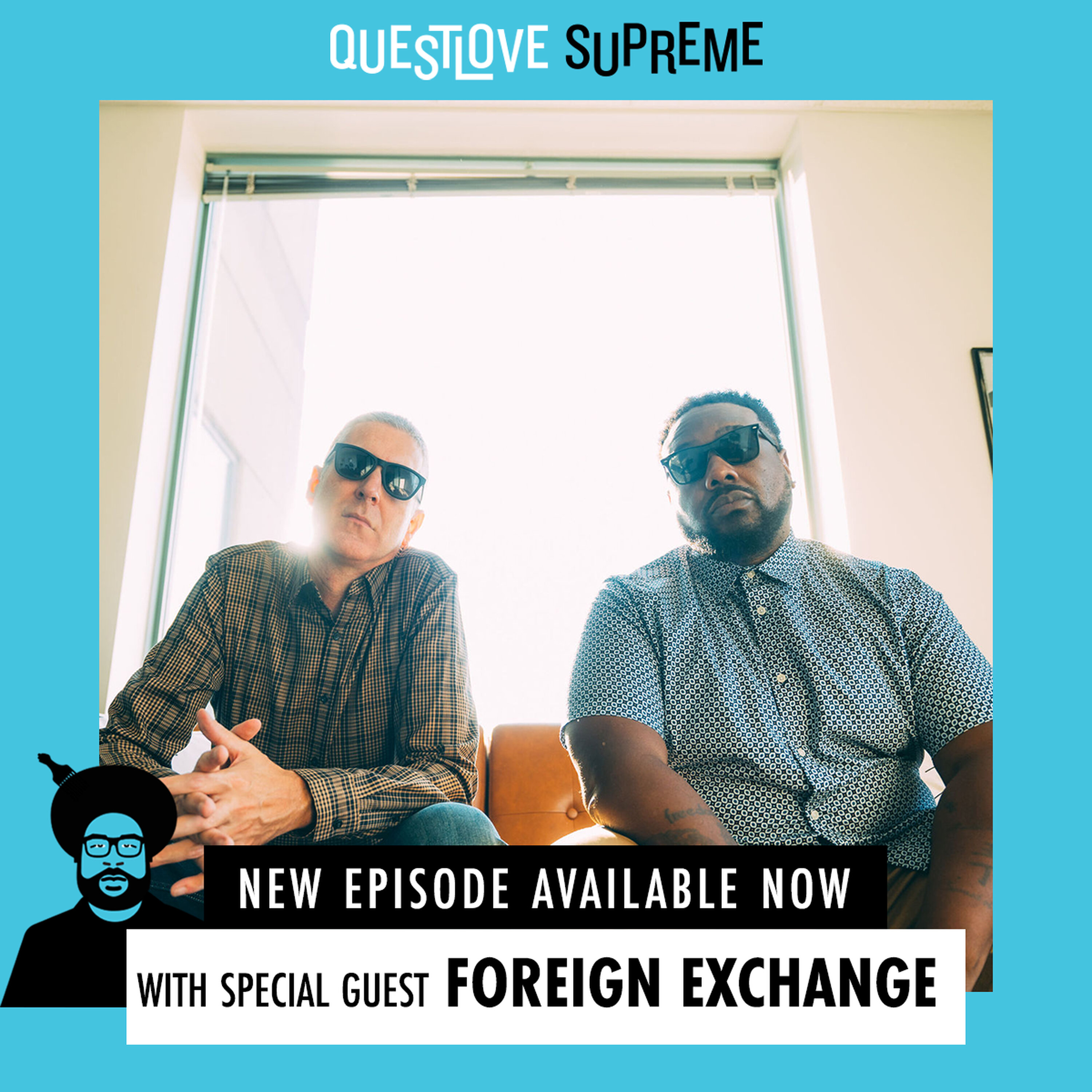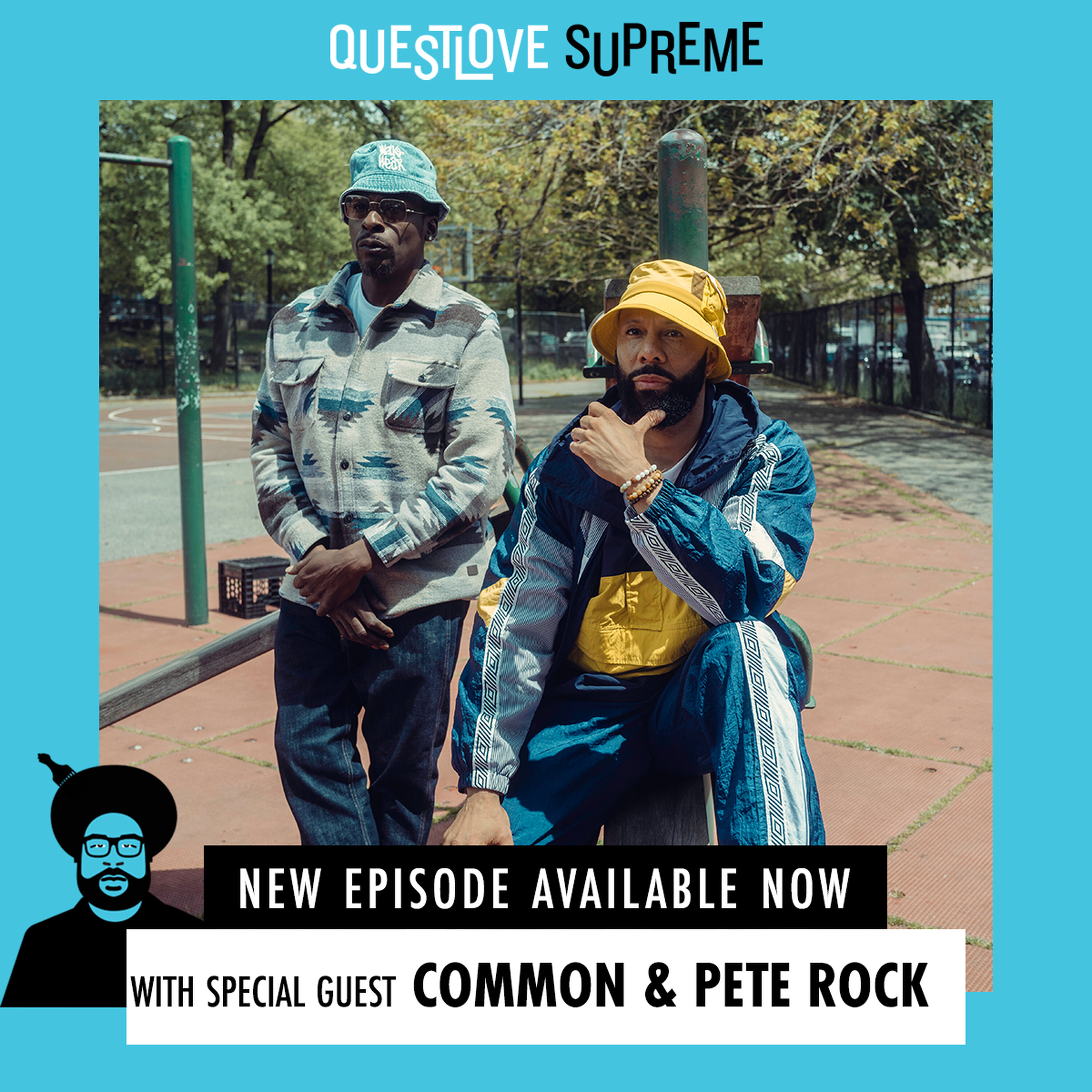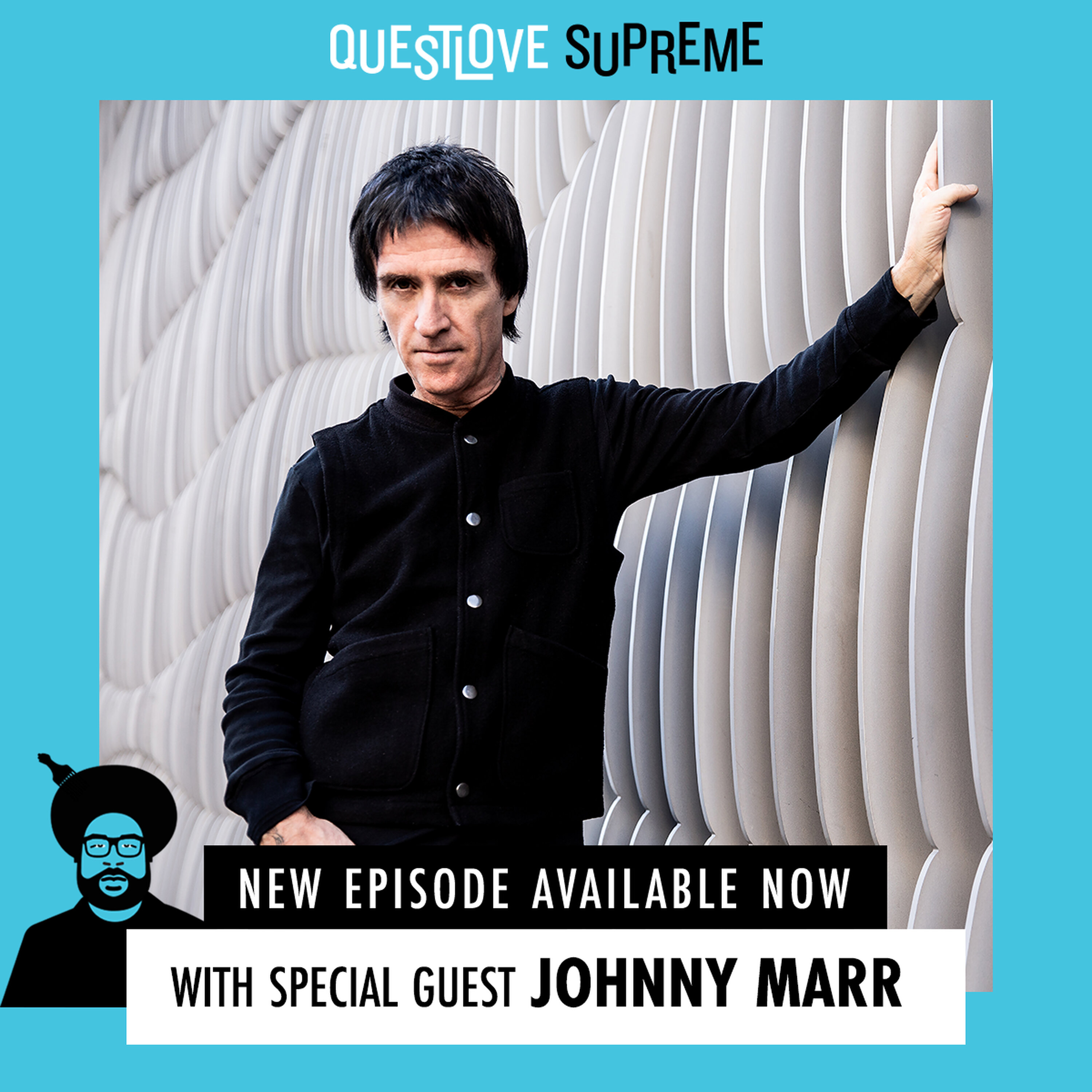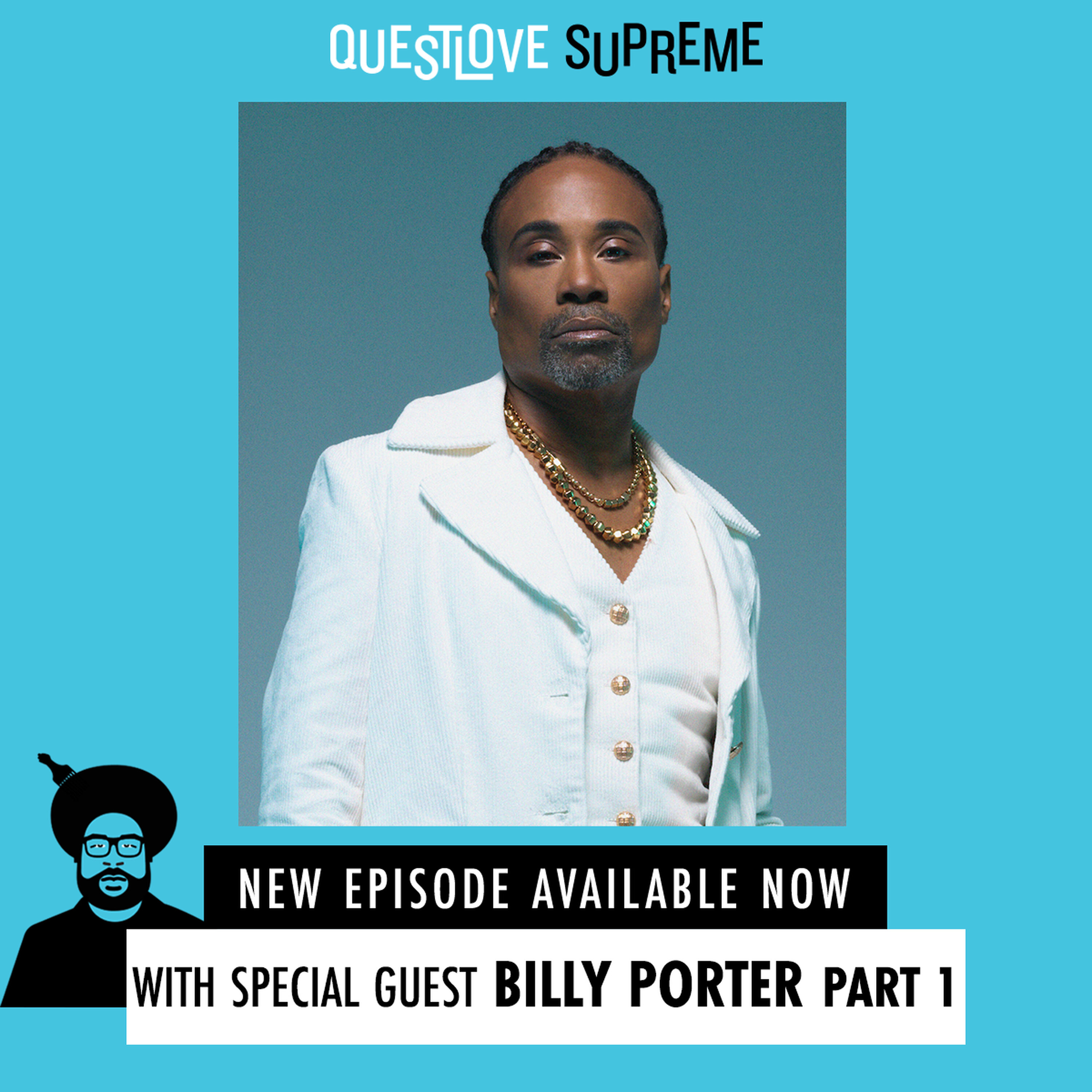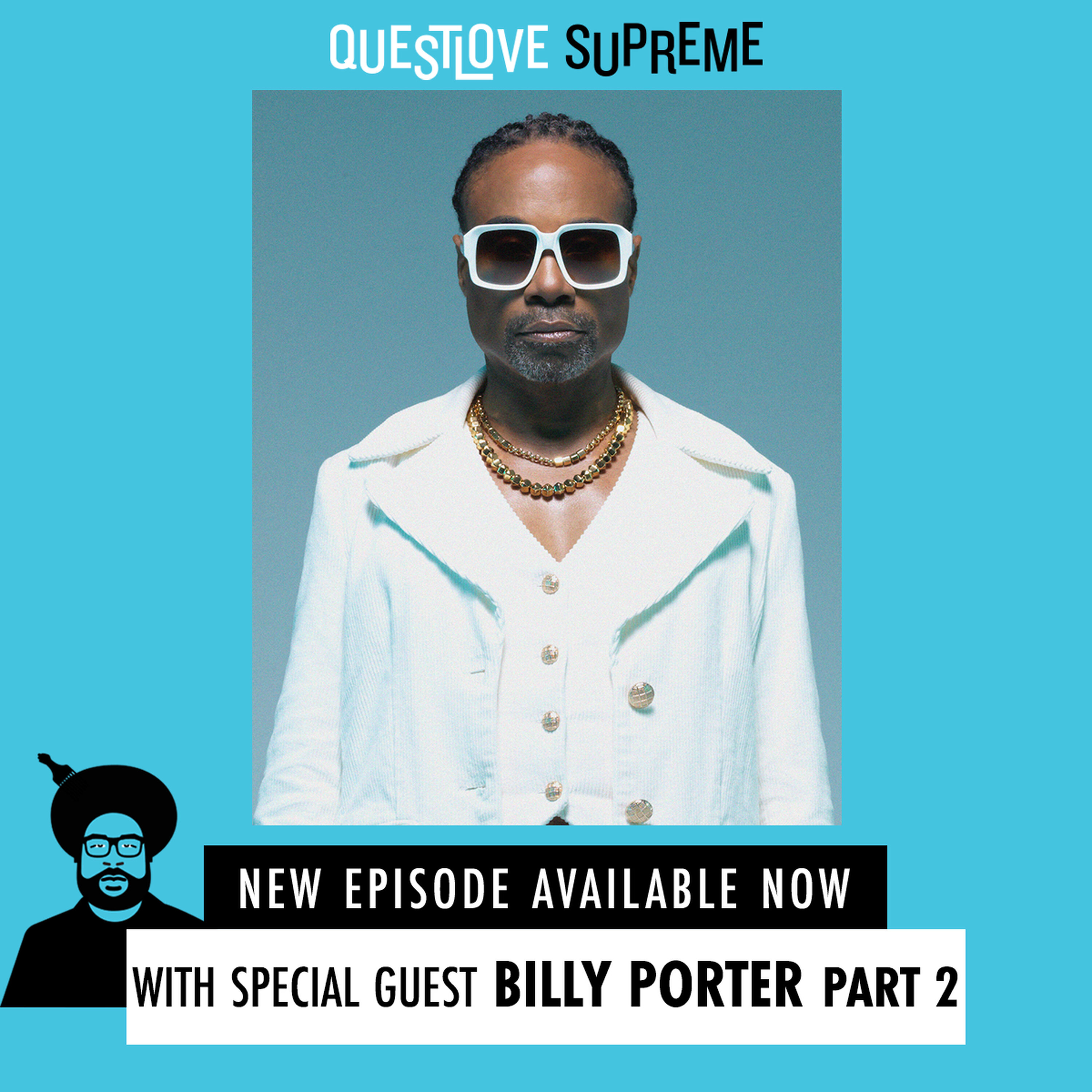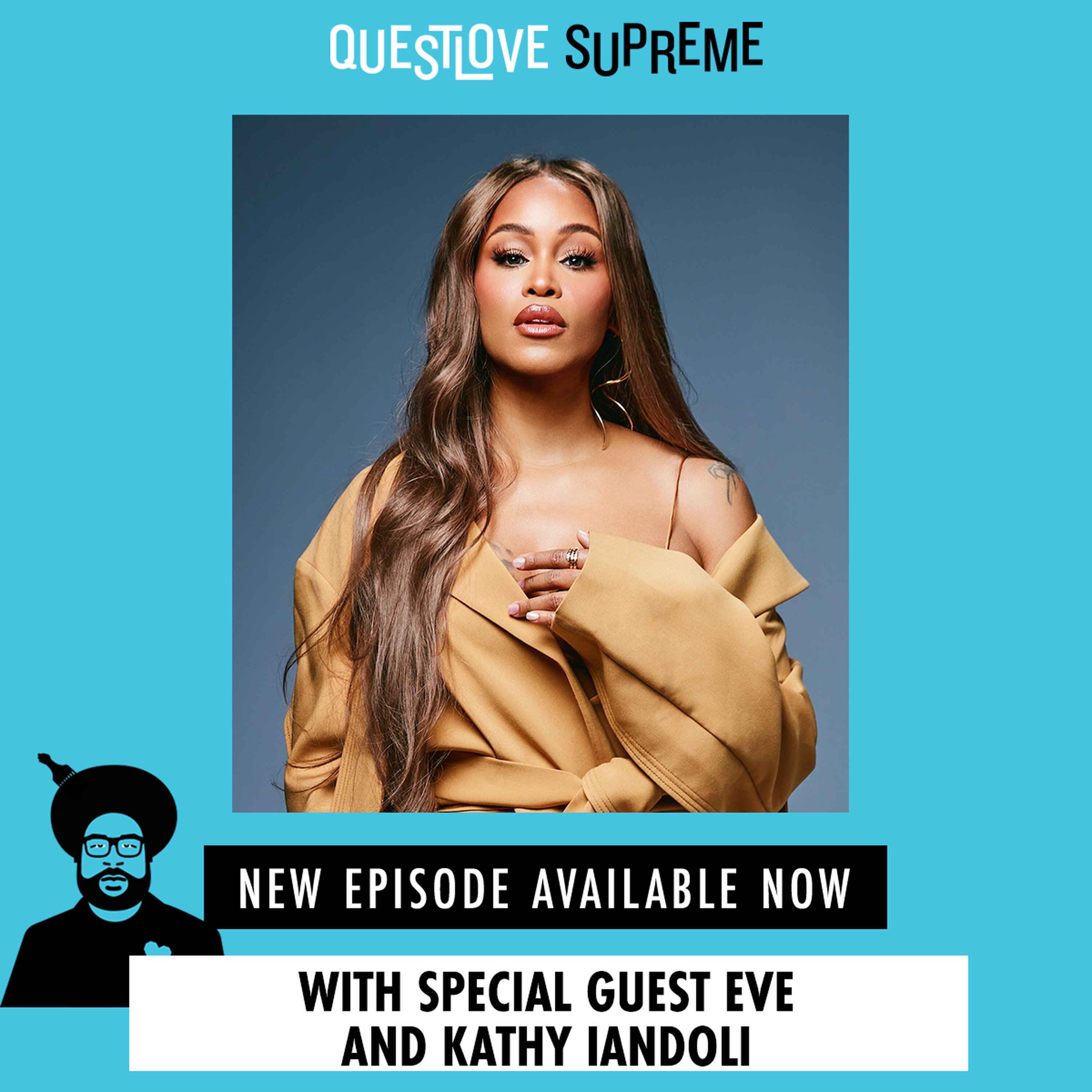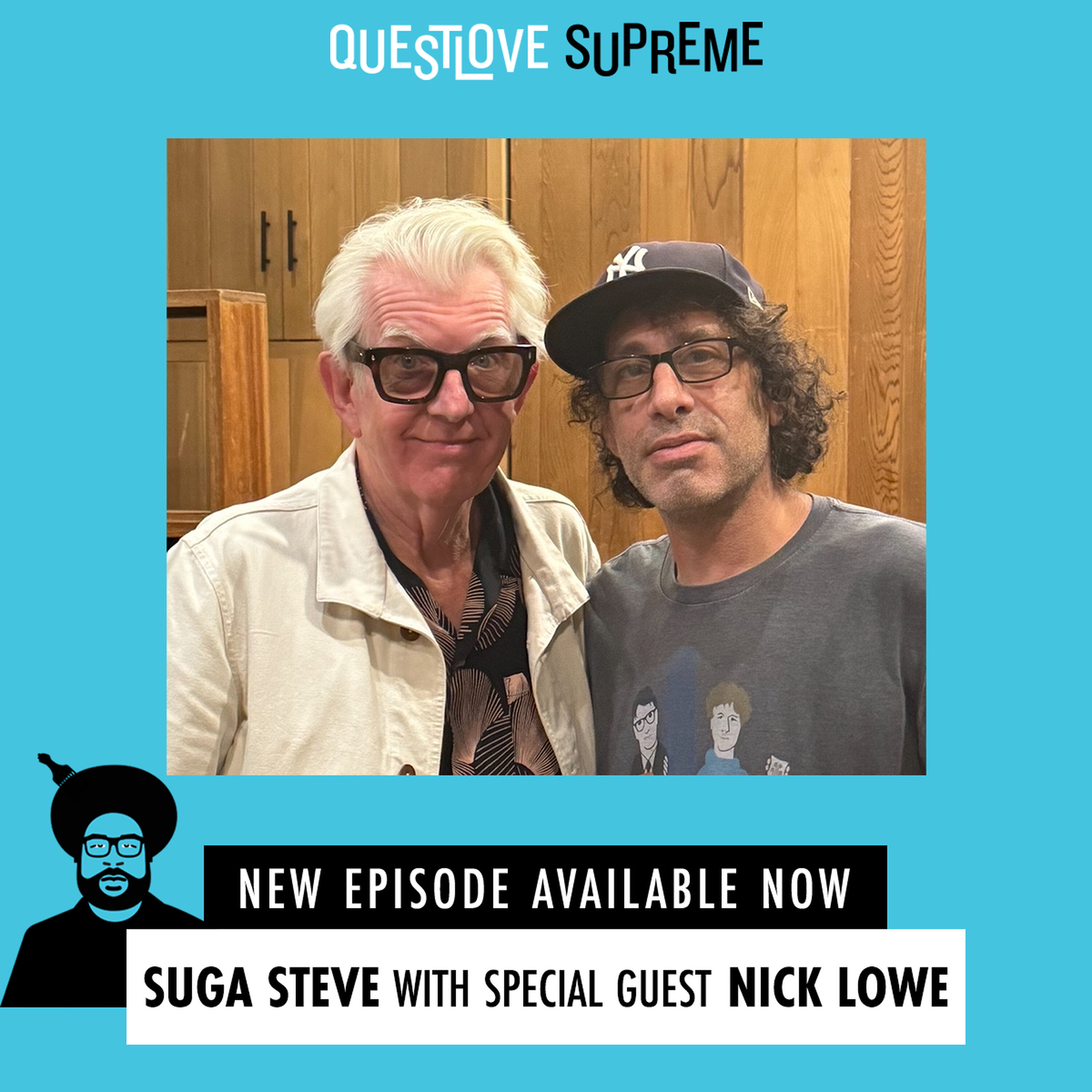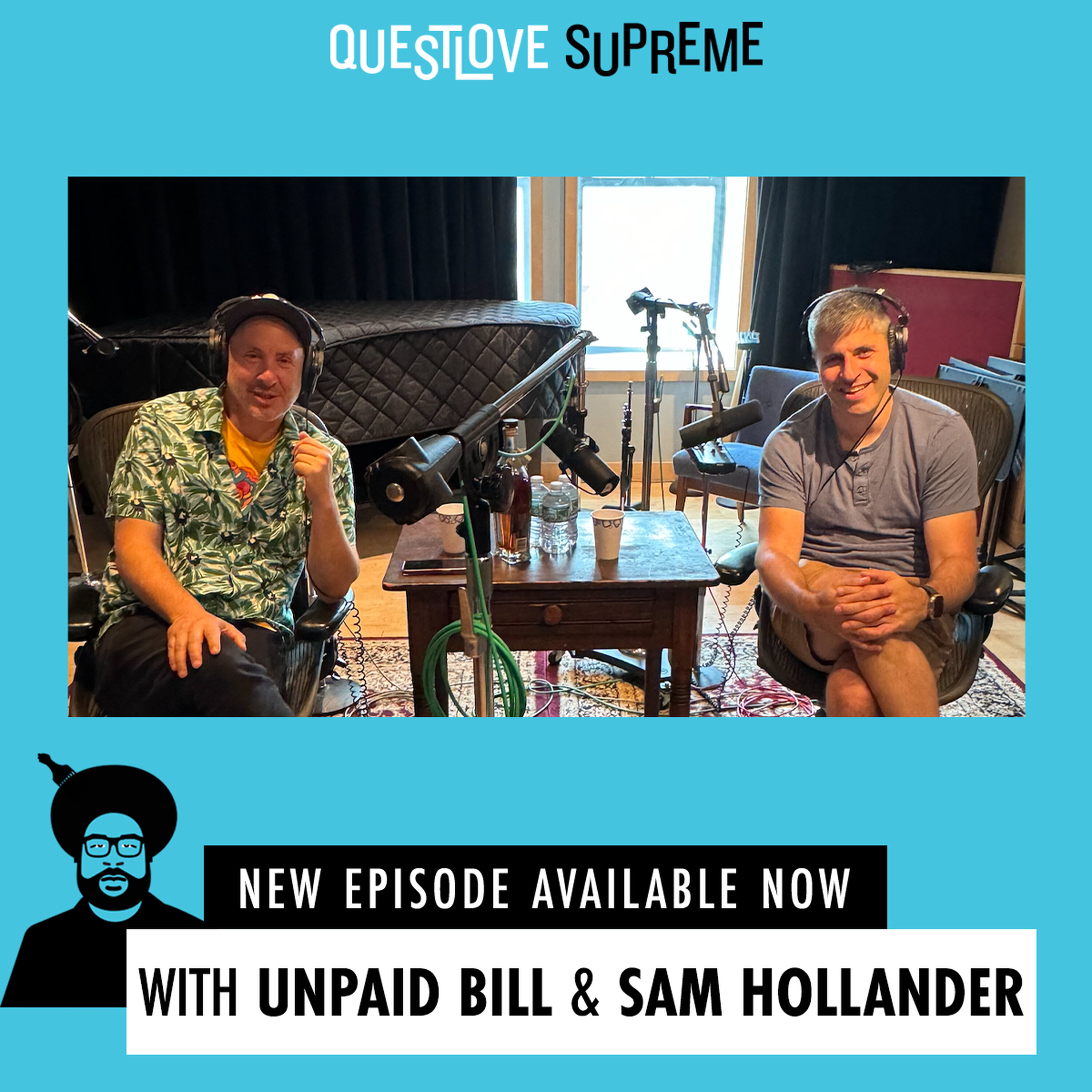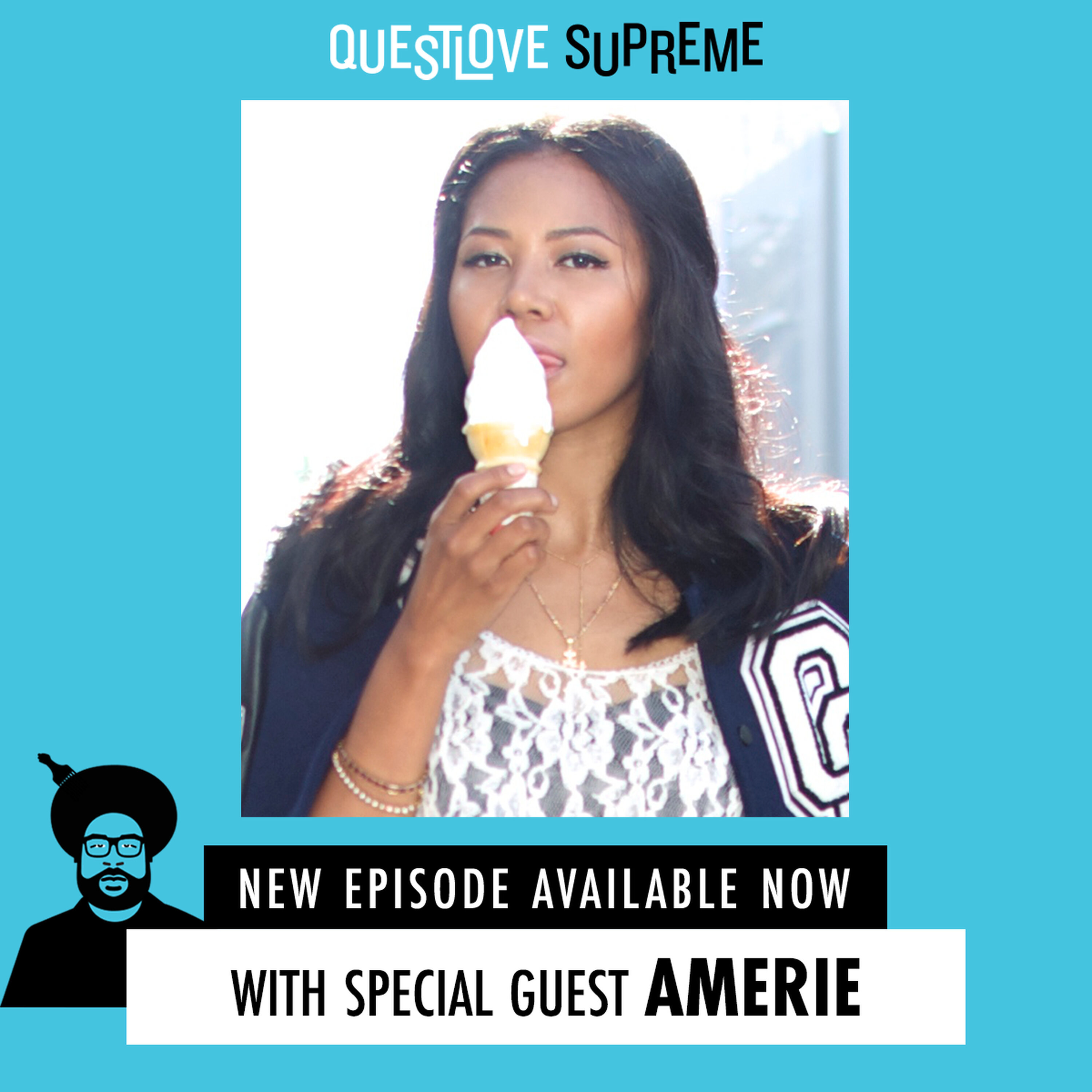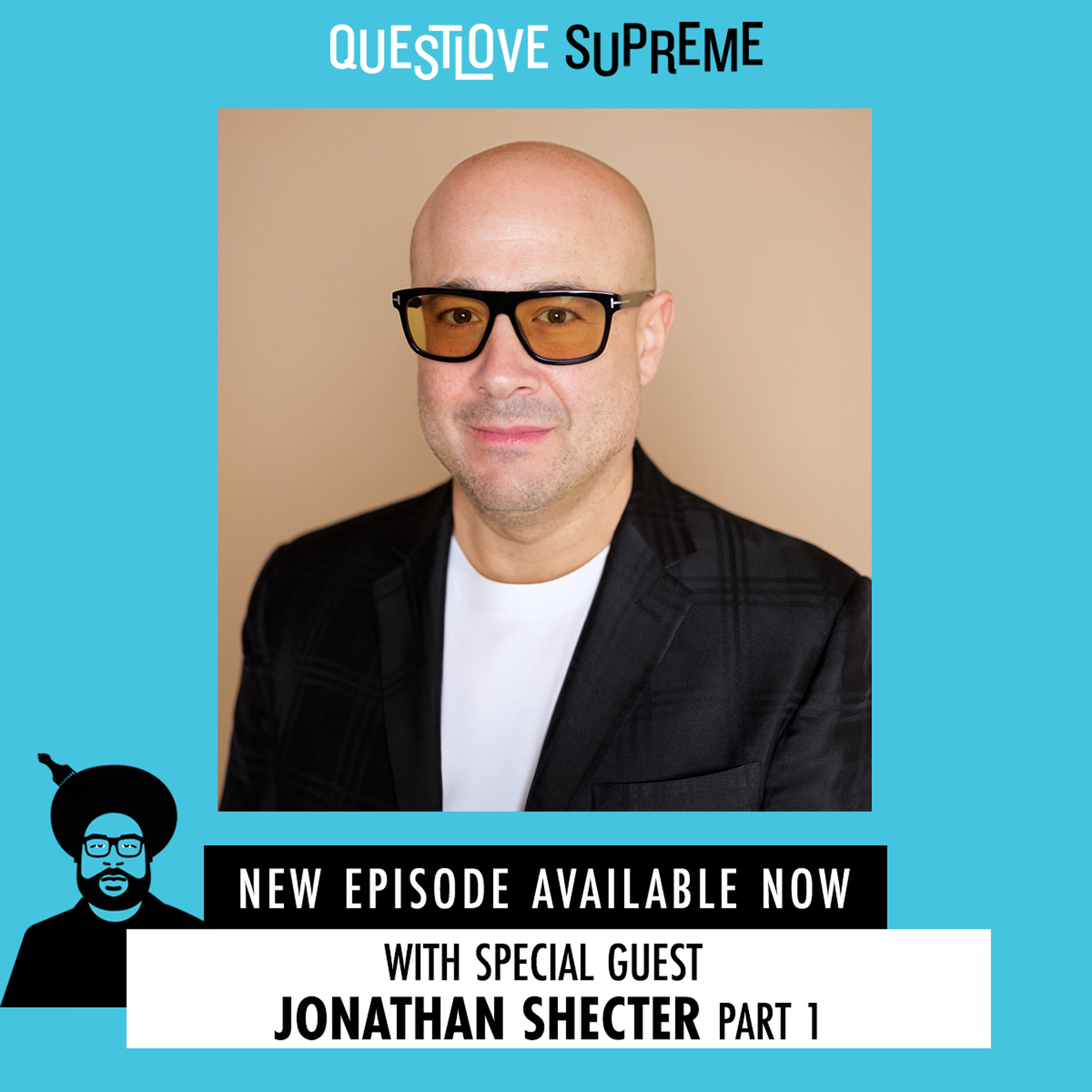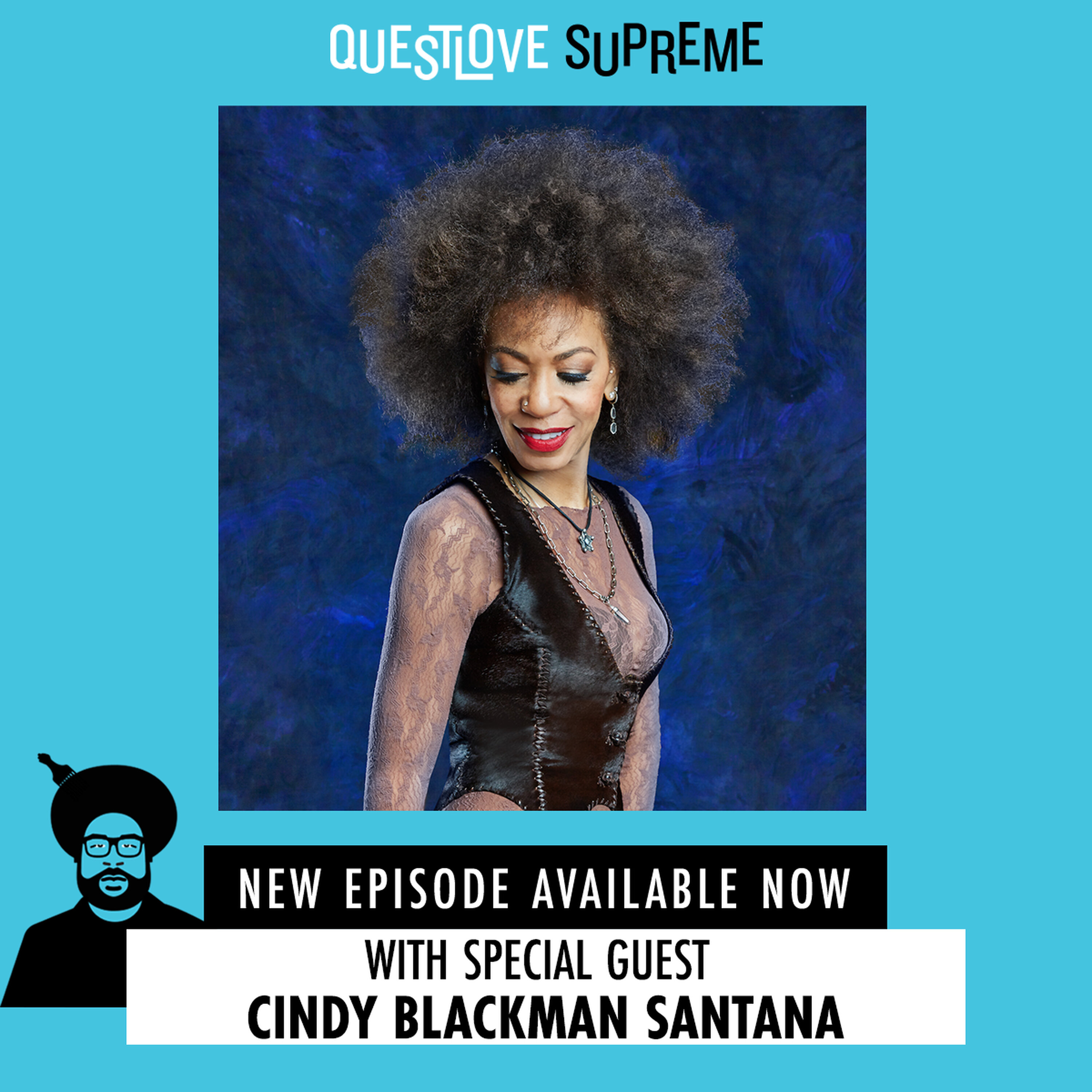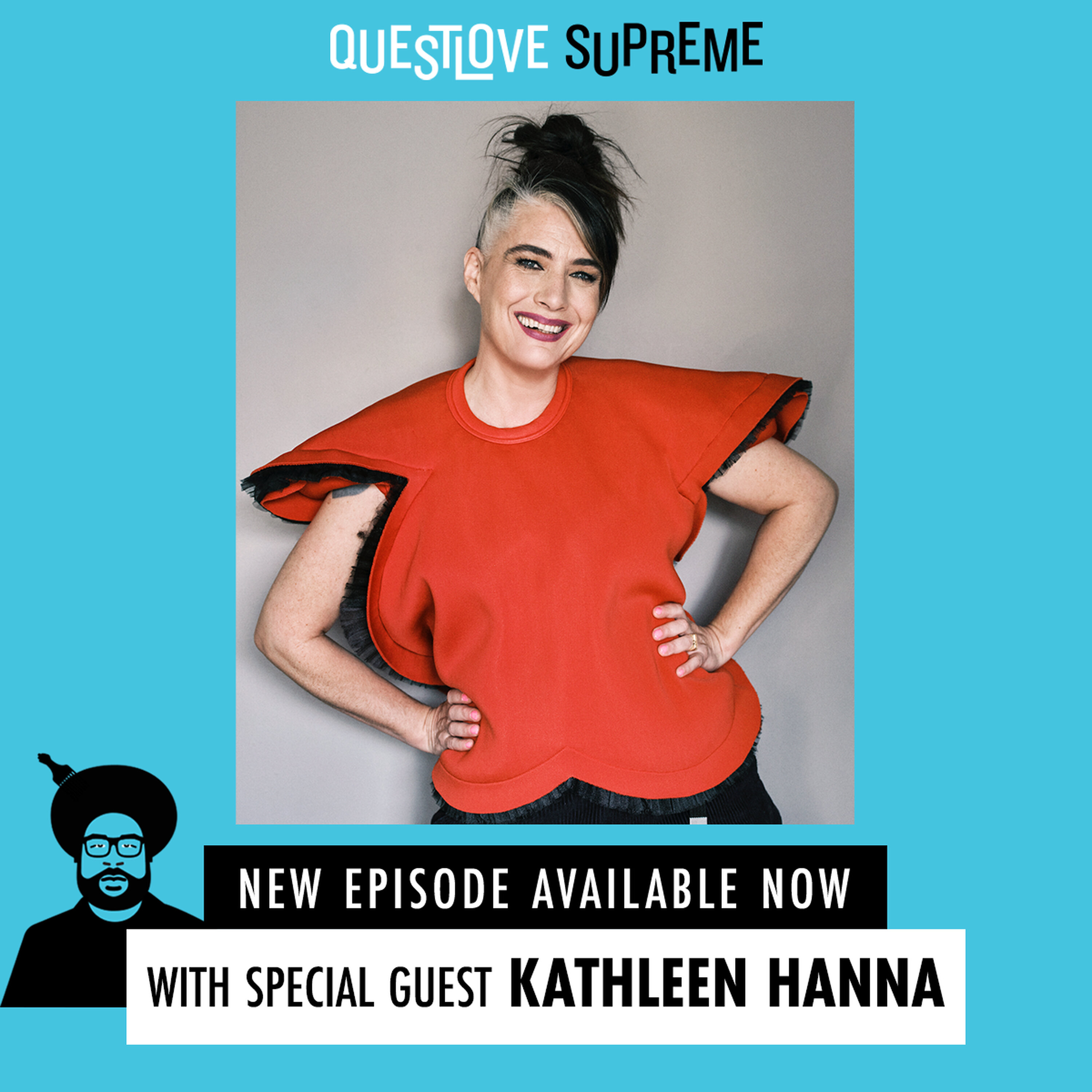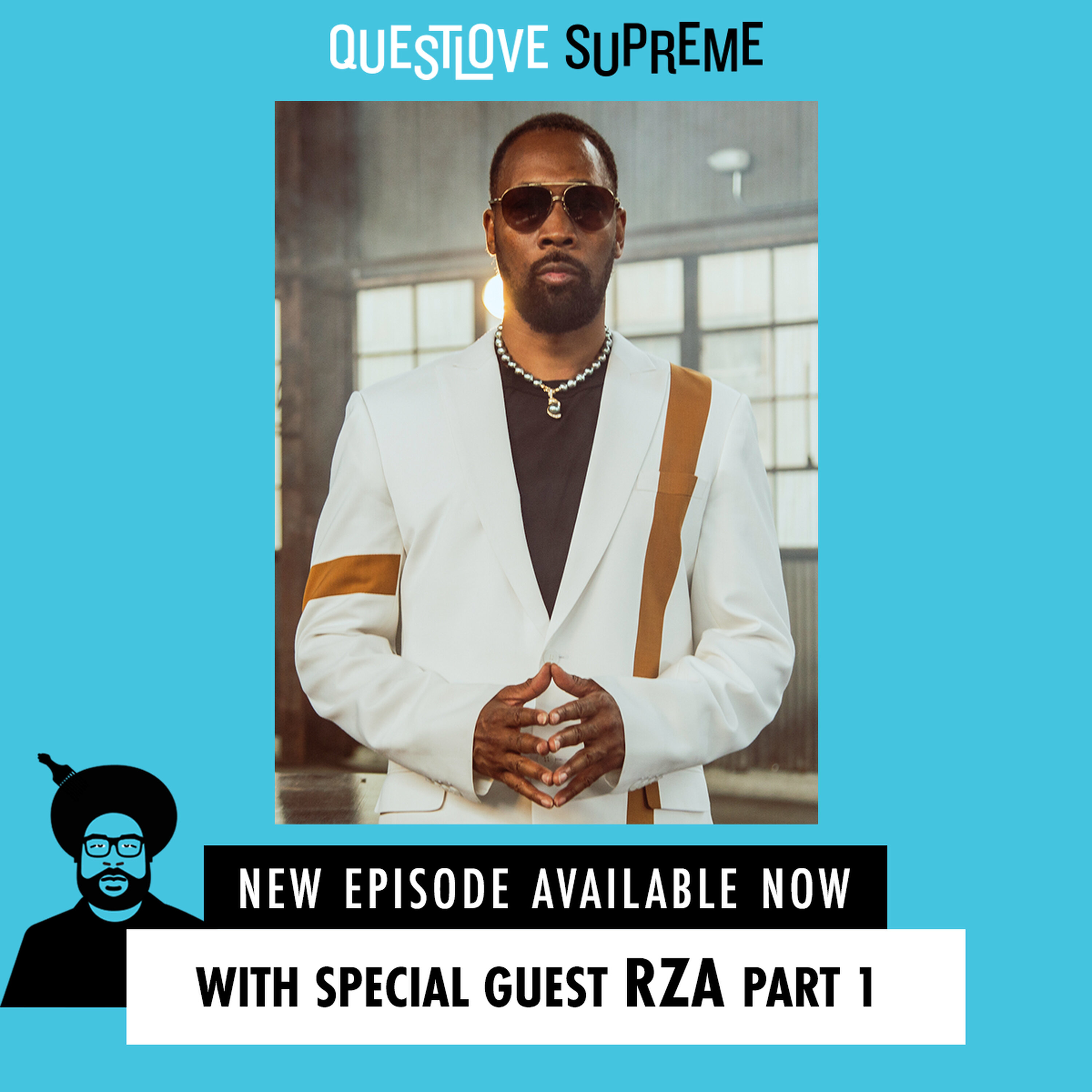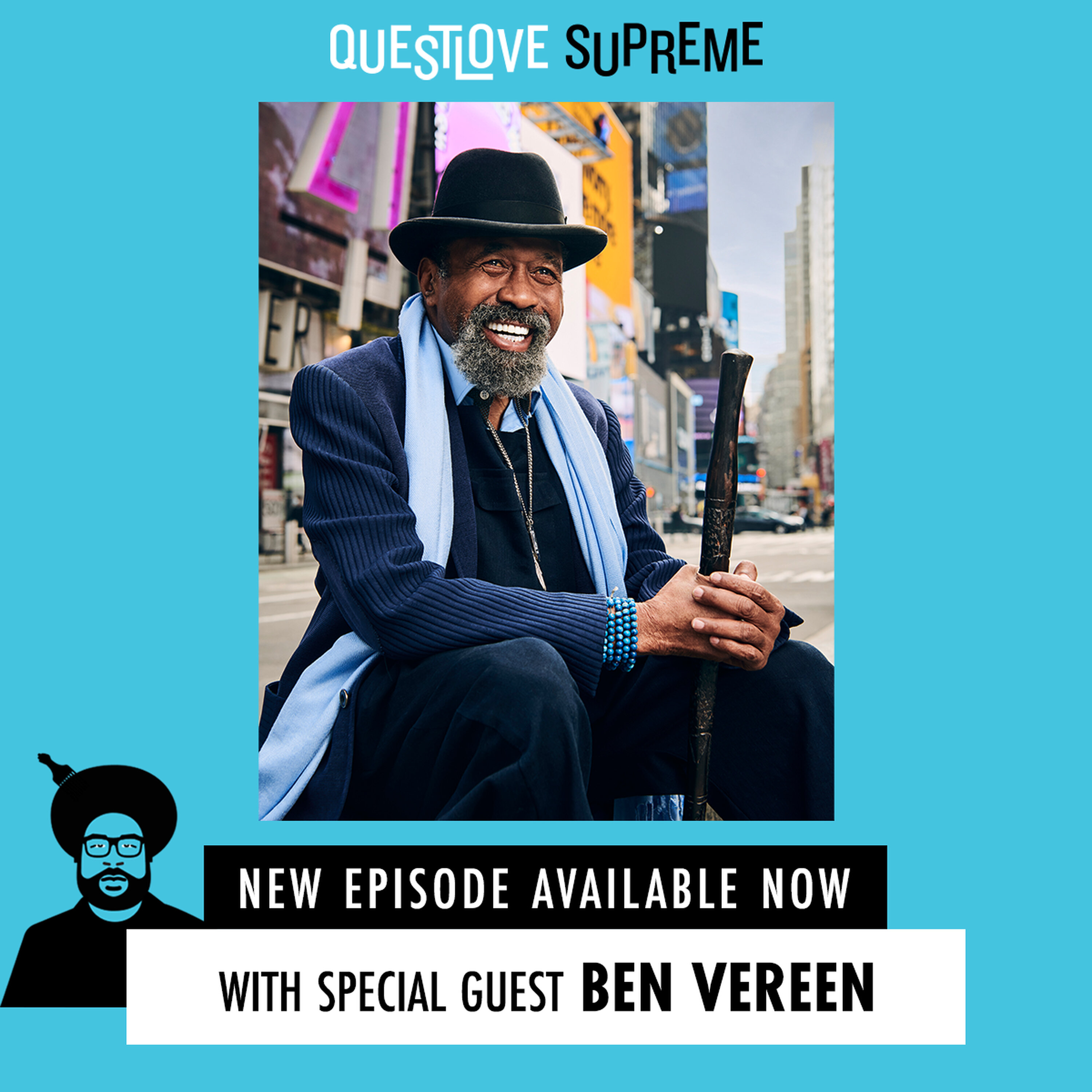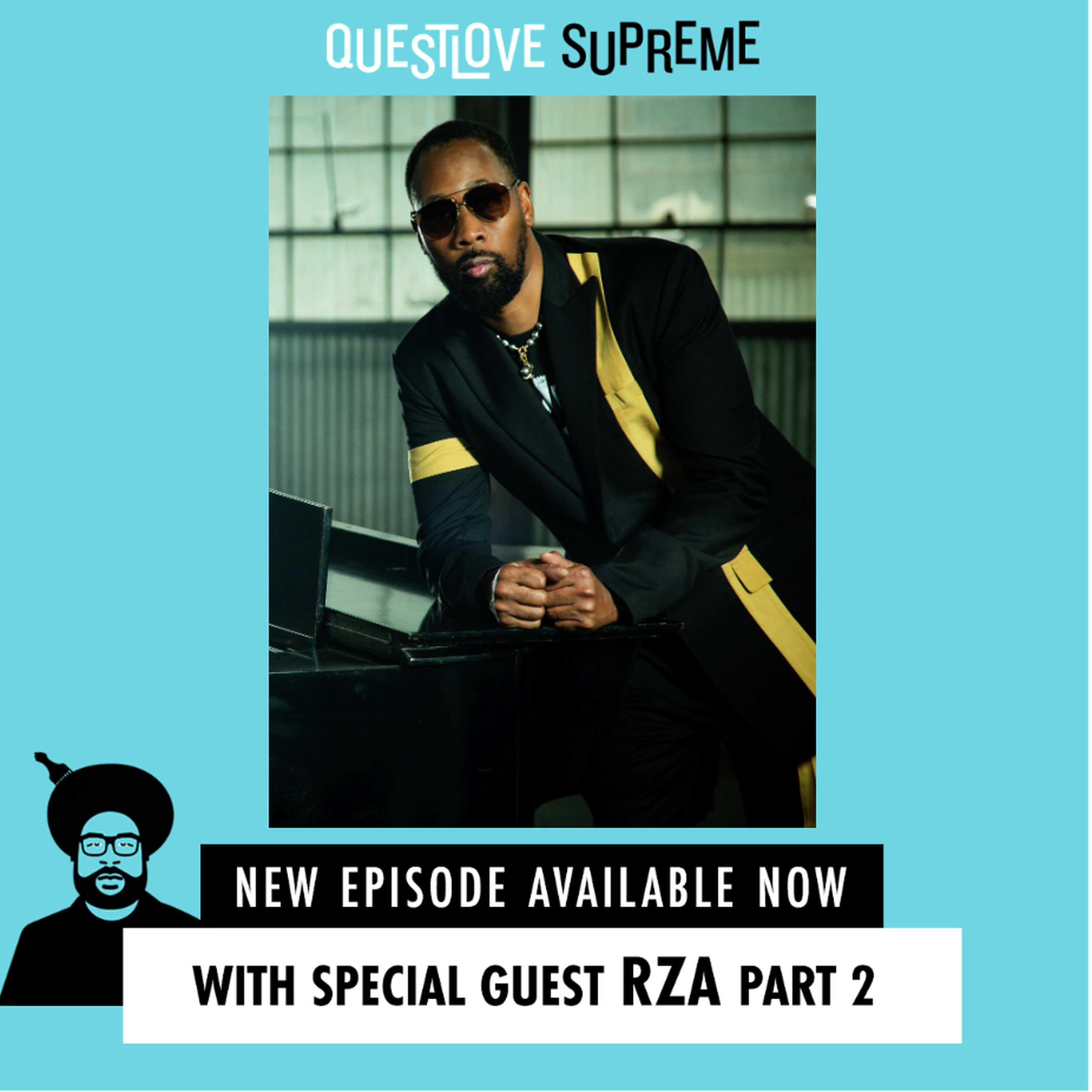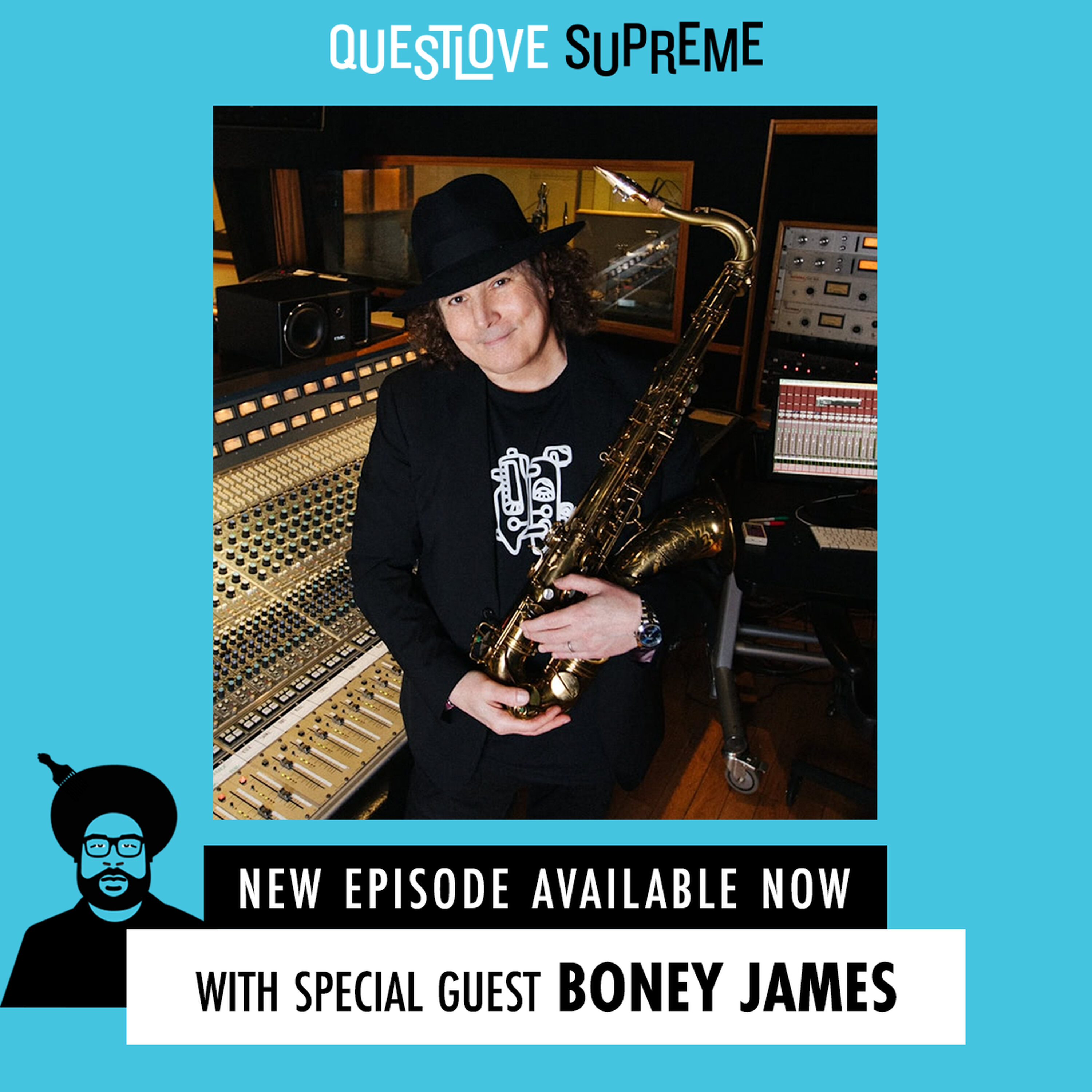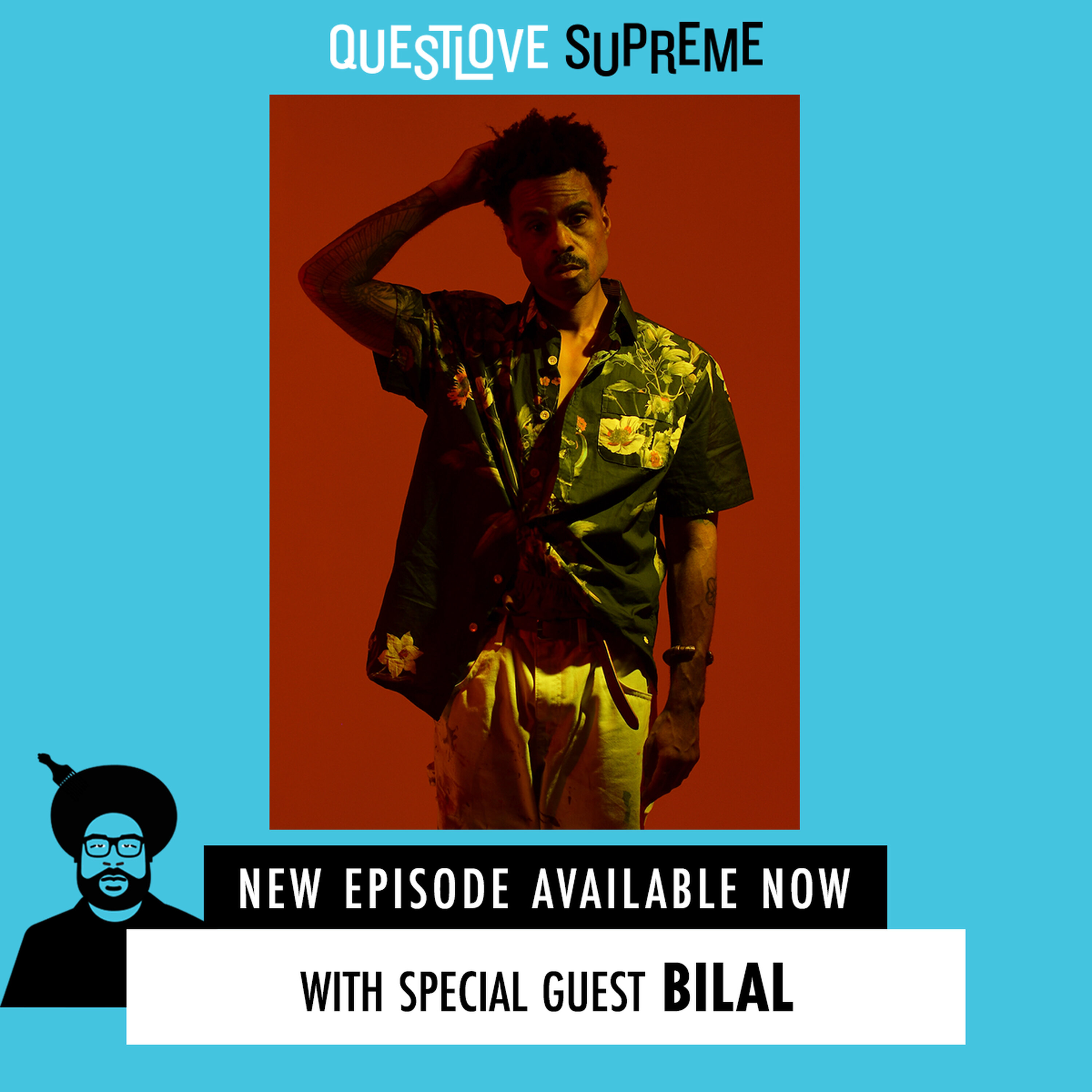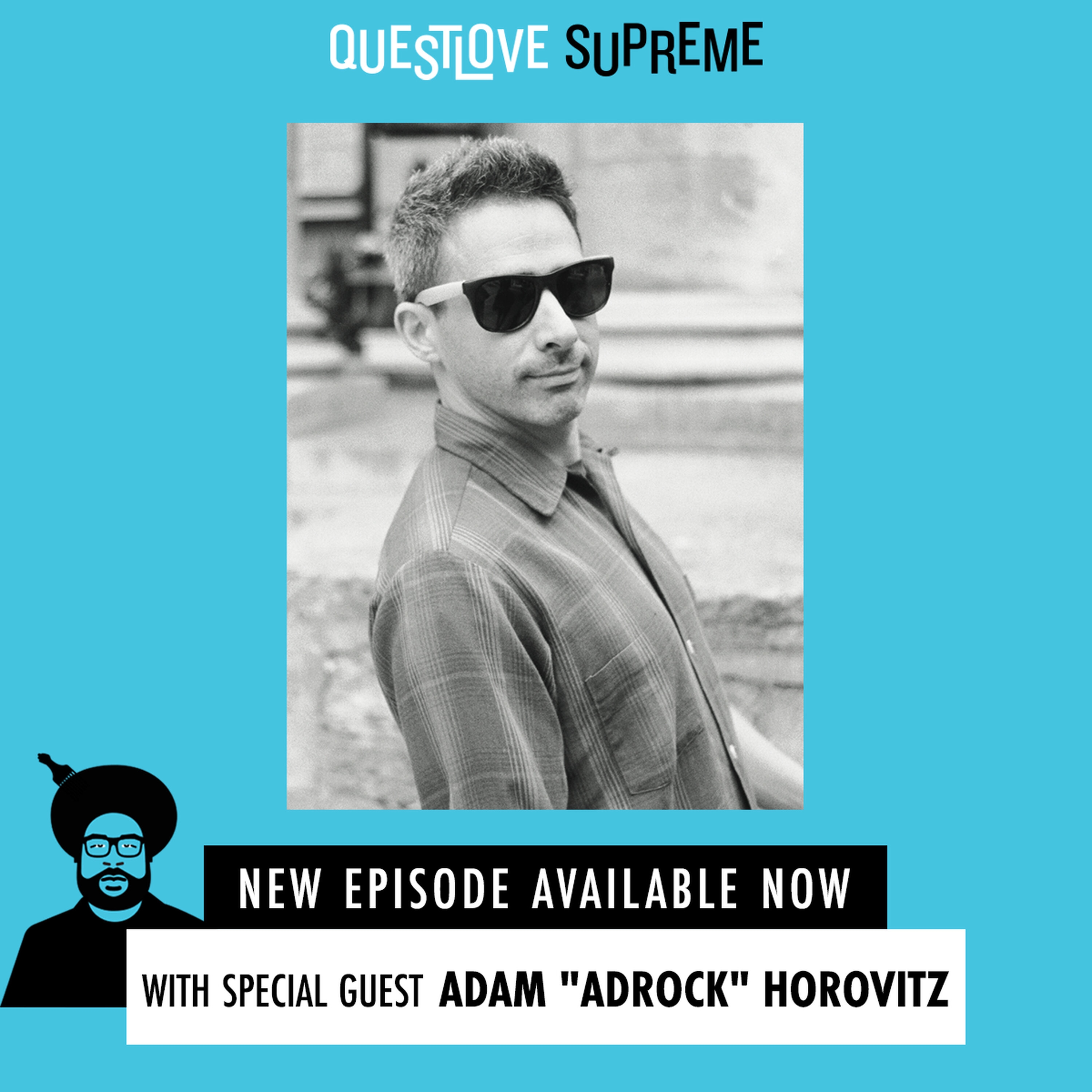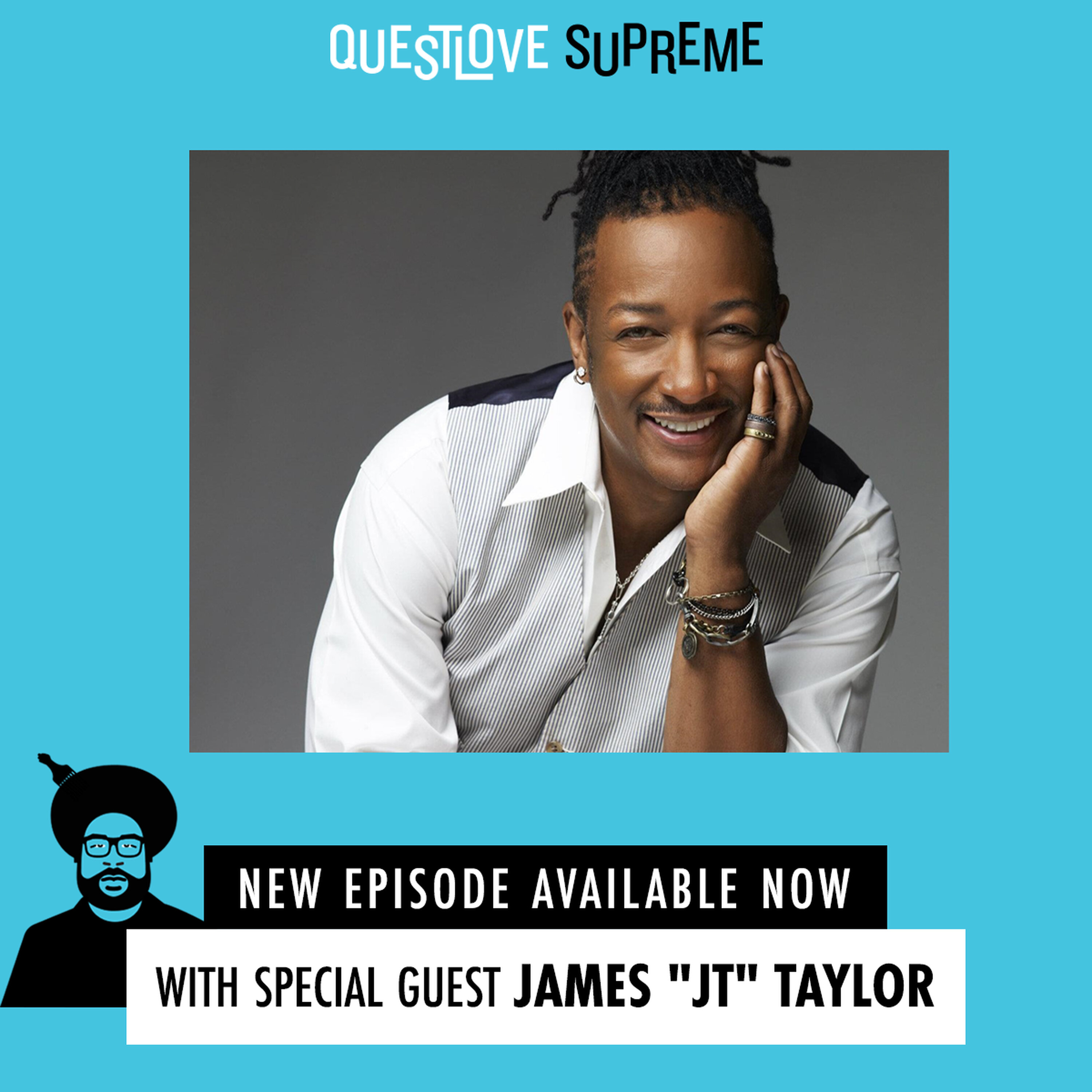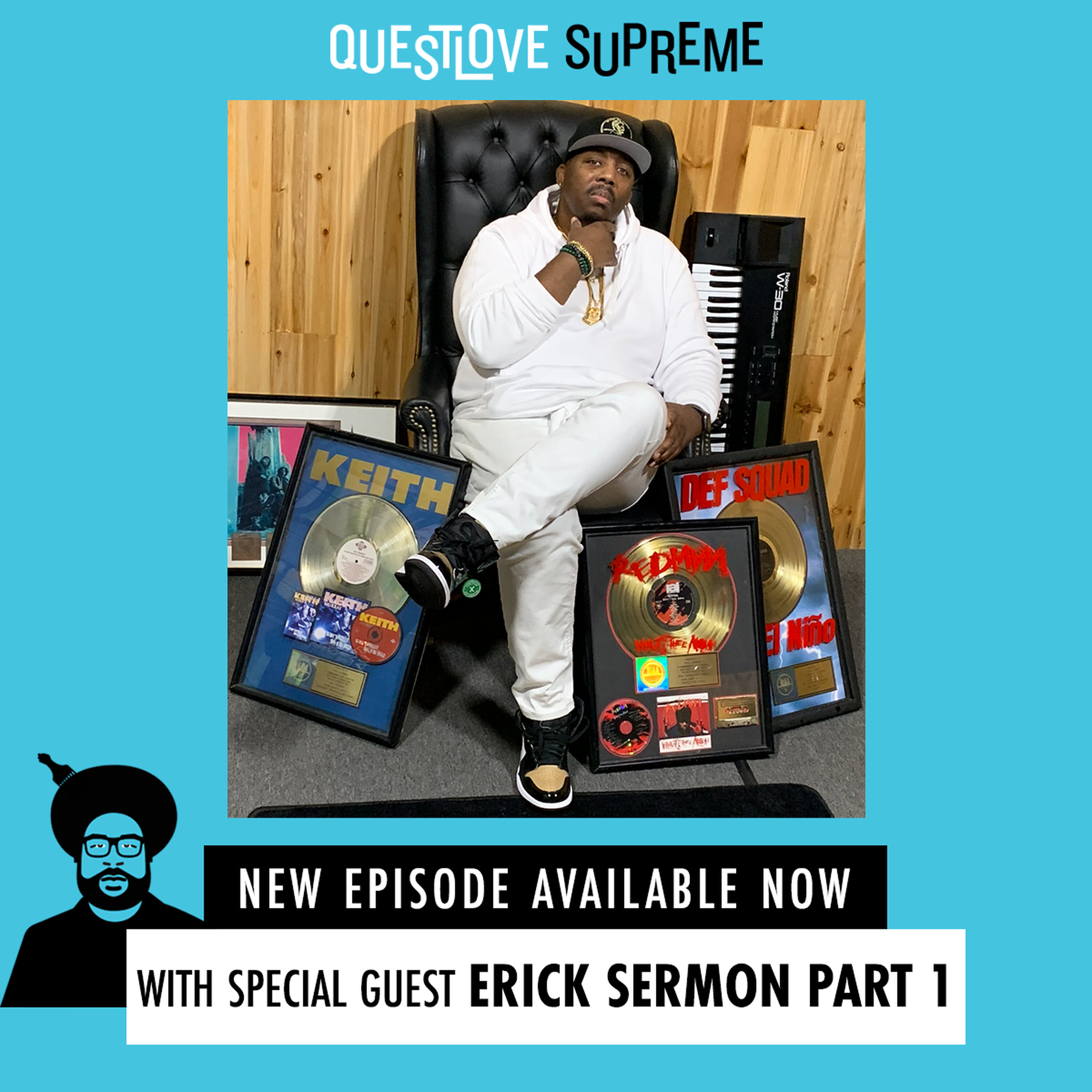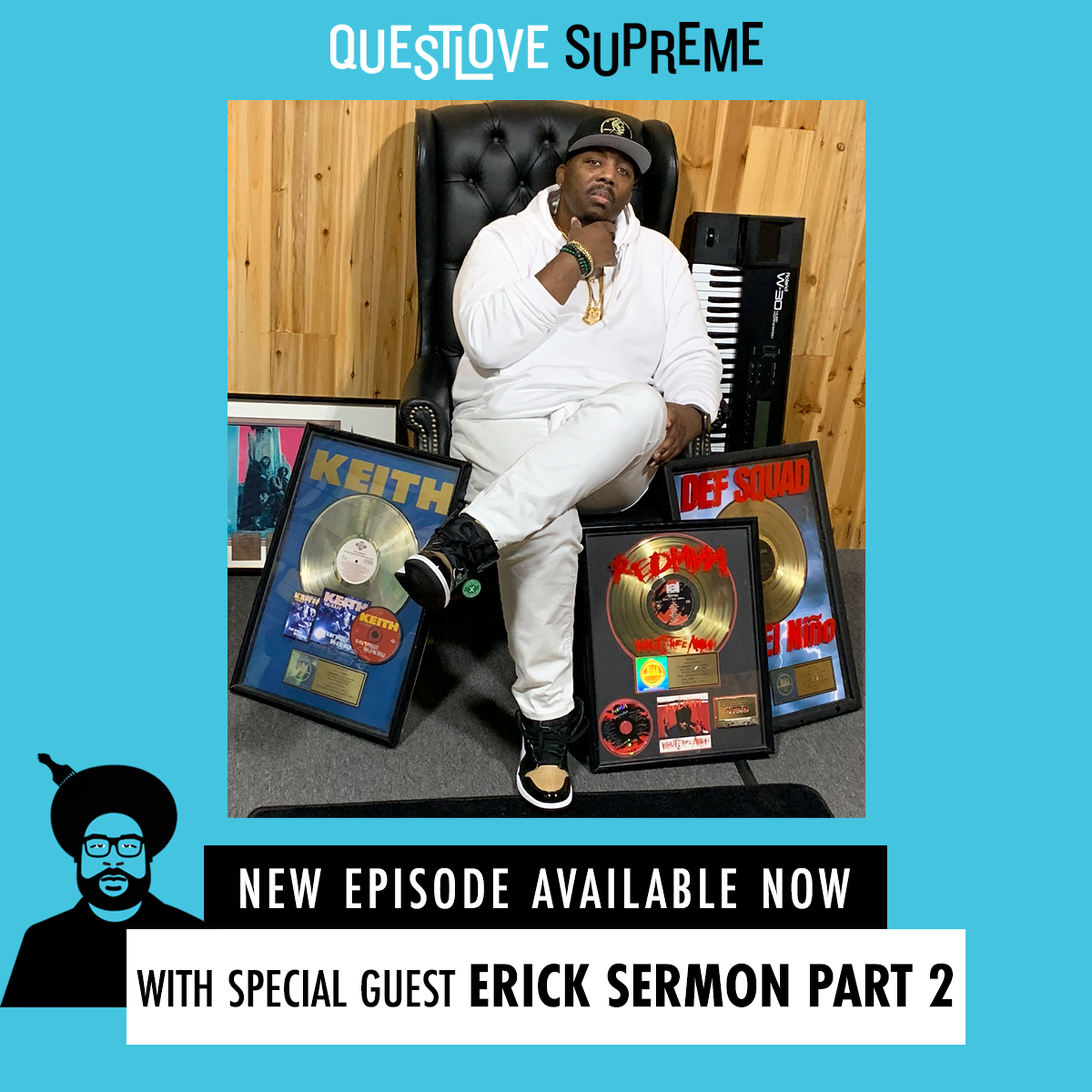Chris Robinson Part 1
Chris Robinson describes being a film and Hip Hop-obsessed teen from Baltimore and making his way into the industry. He remembers getting life-changing advice from LL Cool J (instead of a battle), linking with some of Brooklyn's most hardcore MCs, and now pivoting to help tell Lebron James' story.
00:00:00 Speaker 1: Quest Love Supreme is a production of iHeart Radio, Ladies and gentlemen. Guess what time it is? That's right, your favorite podcast, the award winning Quest Love Supreme. I got it right fun and we are the award winning Supreme. Yeah here routine Supreme Quest Love. You know what time it is? Take a look? What's up? Brother? What up? Man? What's happened? Happening? We're in the daytime. When's the last time we did the daytime? It's been a it's been a good minute, Like I just woke up. Yeah, like he hits a little different than the daylight? Oh you like that? Is that a good thing? I don't know. Get back from the other night? No, no, no, you look like yo. Can we talk about that night? Can we really quick? Guess? I would really like to talk about that night? Which night? So Amir had an experience? Would you like to tell everybody about your experience? You know it's random? I mean, you know, uh, you know, I was in I was in La you know, I'm Philly. I'm Philly to the boom and I just happened to have a night off when Miss Jill Scott finally got around to after you know, a pandemic, a false pandemic start, you know, celebrating the one year anniversary of her landmark. Who is Jill Scott tour did it from beginning to end? It was just that from outside eyes, I could see how random and weird and motley that crew looked. The crew that you walked in with. Yeah, well you know, I'm I'm Philly, Me, Me and Quinta are really really good friends, you know, all allegedly we don't know according to this podcast because you're all your friends. Well, no, your friends don't come on this podcast. So she is a good friend. Yes, yes, well all right, she she's notoriously shy. But I'll say the random part. No, I was just I was hanging with my crew and Quinna having a role with us, and just out of nowhere and layah, correctly, you're you're very correct, and and thank you for your pre warning. You know, there's there's some people who's you know, like James Brown. Won't let you call him James or James Brown. You have to call mister James Brown. We already have our own. We have Miss Lauren Hill. Yes, so just randomly, at the last minute, my boy Silbert, who's Jill's tour manager and sometimes roots tour manager said hey, you know, I gotta stick somebody in your section. I came back and basically it was Lisa Ray. I had to let him know. Basically, Amir didn't know that Lisa Ray is always Lisa Ray. She's never Lisa. So when a miror said that she was gonna be showing up, I said, well, you just make sure you don't never slip and call her Lisa. Her name is Lisa Ray, right, And so I warned everybody that we are too address her as Lisa Ray and not hey Lisa or whatever. And you know, by then our treats had already kicked in, so it was really hard explaining that to people. So I think we overdid it. In every three seconds we were just like, hey, Lisa Ray, would you like saw Hey Lisa Ray, would you like a blanket? Lisa Ray? Can you see Lisa? Like literally, I would also like the world to notice. This was quest last first time sitting in the audience of the Hollywood Bowl, at the blackest Hollywood a Bowl event, probably of the year, one of the blackest ones outside of Unity. I've never sat in the audience before at the Hollywood Bowl. I didn't know that you could bring your own food. No, it was for those that are regular Hollywood Bowl attendees, like it was nothing like I you know, I didn't know that you were supposed to bring your own bottle and whatever. So let's just say a lot lay. It was getting a kick out of watching me watching you go to the stand by you a blanket, do all the things you ain't bring your own blanket a civilian. I enjoyed it. I enjoyed being a civilian. Anyway, I'm paid, Bill, How what's up, bro? I don't know, man, I feel like my day is all fucking weird because we're doing in the middle of the day and I don't know. I'm great though. I just feel like this usually ends the day. Now is the beginning of the day. So you want a day drink? I know, not today? Maybe? All right? Uh sugar, Steve, Hey, everybody, do I hit differently in the daytime as well? Quest? Yes, we can see your face now. You normally have the darkest room amount of all of us, so you know, no, we're good. Yeah, anyway, all right, so this episode definitely long time coming. I will say that our guest along with his brother Rich is a founding member of the rock group The Black Crows. Let me Rewind, Let me rewind. No, Actually, for the last thirty seven years are our guest today has been uh beloved patriarch Jack Hamilton on The Bolt and the Beautiful and also the voice of and also the voice of Vick's Formula forty four for the last forty seven years. No, no, no, no, let me try this one more time. How are yeo? Wait? I look? First of all, I will say on video directing credits alone, I know that we've elevated to movies and to production and whatnot, but I will probably say that I think that our guest today that his cannon of music videos has really, in my opinion, saved and somewhat defined the best moments of b ET and MTV. I mean literally, like, dude, I didn't even know that you directed the Dodo Brown video. Oh yeah, can we just start there? Can we start? Brothers and which drown? But our our introduction to Alicia Keys came through his lens, you know, dude, like a Marie, Like we can go on just literally Alicia Keys a Marie uh directed h name it? While for the night Lord all the miracles that he's done with outcasts. We can't even go there. But dude, my favorite Brandy videos full movie. I didn't know that you did that. I know what you want. How did you handle the entire Flip Mode squad? I wouldn't see the entire treatment. I just want to know how from one to ten, what was the headache level of advil you had to take for that entire Buster Mariah Flip Mode video experience. And by the way that you're staring at me, I can tell that that day was very heavy for you. But no, literally, you've directed some of these crazy innovative videos. Dude, so anxious, also bad voice. Yeah, I'm just saying, just name it, like from Jake, He's literally directed. If we named this entire cannon, the episode would be over by that, the whole episode on the New Addition Story just alone, just there. But yeah, I'm about to say between a New Addition story between star stars. Yeah, man, you've done very wu tang like you you are. I feel like he did Mama, I made it. Bon was on our show too, Like it's just all of the things it's and that's the episode. So thank you very much. Chris for joining us. Now Ladies and gentle and Chris Robinson is joining they are Chris Robinson Robinson, what's happening? Yeah, I gotta admit there was a slight who's on first situation when Brittany and cousin Jake brought you up. It's like, yo, Chris Robinson wants to do the show. And I was like, oh, okay, So I went to a Bruce Springsteen concert. You already know where this shit's going. I went to Bruce Springsteen concert like a month and a half ago, and I saw Black Crow's Chris Robinson and kind of had a Who's on first conversation to elevator. I was like, yeah, so I hear you about to do the show with us, and I think he thought I was talking about the tonight show, right, So just cut to like just ten minutes of going in circle before I realized, yeah, I don't think he's coming on Quest of Supreme. So Chris Robin, oh that show? I got it, okay, right right? You know I got a story with him. You got a story with Chris Robinson. Chris Robinson, Atlanta, Georgia at the Four Seasons in the lobby, somebody's calling for Chris Robinson. I show up and he shows up. It should have been like a Dave Chappelle's kit. And then he goes, He goes, do you know everybody thinks I'm a video director? And I said, do you know everybody thinks that I I play rock and roll? We had a conversation, take you got to direct a Black Crow's video? And then the circles complete. You know what, you know? Not knowing your everyday life is but one of the strangest nights in rock star kind of existence I've ever had. You were a part of it. I don't even know if you remember it. Do you remember the night that I came to Atlanta. I don't even think you took me. I think you just happened to be there and you became like my you know, like whoever whoever the your your your guide is on the first day of kindergarten, or whoever your guide is on your first day in prison. It's almost the same thing equivalent I went to. It wasn't what's Atlanta's most popular gentleman's uh, it wasn't a magic city. It was a magic city, though it was Nikki's a Gentleman's club. It was. It was something on that level. But I remember, I remember, yeah, I forgot where we were. We were were somewhere that was like legitimately, if you are from Atlanta, you freaquent this spot, right. Someone told me, like, you know, to go to Magic City. It is almost like some tourist shit like, don't go to Magic City and you're only gonna go to what's what's the uh, the one that's that has the letter C in it, that's yeah, or the Claremont clamor for novelty purposes only right, But the actual natives and locals go to the spot that I went to. I forget the name of it. And I've never seen like I thought I've you know, like we'll go to the spot in Vegas or something like that. I've never seen no ship like this in my life. Where twenty minutes into the experience, I realized that the whole purpose of that of that establishment wasn't It wasn't even the women like they just happened to be there dancing. It was about to know, it's about to define the laws of gravity and how much muscle power do you have to grab a stack, throw it up in the air and keep it up in the air before the last dollar drops. And I believe that they had like a counter on the wall like people will break in records like who who can make it rain keep their dollars in the air the longest? And I've never seen a spot with its own banking system like so a very much well loved ball player that's near and dear to uh my hometown, I will say at that point, he was a young startup in in the at L. They were basically having a who's dick is bigger contest on who's whose dollars could stay up in the air more and literally like at one point said ball player threw up maybe twenty thousand. And this is when I was my afro was out and I was rocking a that was in my what do you call it? Freedom fighter? Uh? For slaves? Uh? Not in that turner, Yes, Frederick. I was about to say, fred we run, Barry, I'm sorry, okay, And I remember two hundred dollars had landed in the part of my afro, and naturally I was just going to grab the ship and Chris like, don't do that. They'll come and get it. And I was like, huh and literally I was about to do that, and security was like no, like I couldn't. You couldn't touch the money. I've never seen no ship like that in my life. Is that? Is that night just indicative of what the strip club experience is because we weren't even like at the tables. We were just by the bar, just chilling watching it. You know what, brother? That is? Uh, when the money goes up, you can't touch it on its way down because that's it. Like I've seen situations where guys have reached for the money on the floor and it ain't good. So, you know, I could not have my brother reaching for any You saved my life and literally I just wanted to take it out of my hair to give it to you you like someone's like, but you can't do that because you ain't throw it. So you can't act like you've given it to somebody because somebody else dow it. Not that I just it was on my person, you know, there it is. It wasn't possession was nine tenths of the lag you know or whatever. I don't know. Very surreal. Are you still in Atlanta right now as we speak? I am not. I'm in Los Angeles, you know, what's funny? People think I'm from Atlanta, but I'm actually from Maryland. I know, I thought you were from Atlanta. Yeah, and I live in LA now, so I still go back and forth to Maryland. But I think I just did so many videos and I did at the people think that I'm from Atlanta. I love Atlanta. Shout out at Land all day. Here you go, so normally, you know, we have mostly musicians on the show. But for you, what's your beginning step to becoming a linement? Like? How does this? How does this happen? Well, like like many other people, and when you're young, in the beginning, I just knew I was going to be in the NFL, like you know. Then I realized when I went to college that I was slow and short and weak to be in NFL one time. Yeah oh really, Oh well you for real now? I play some nos off in high school too. That was I love nos man. It was in the trenches. I loved it. Yeah, I'm gonna pretend I know what the news guard is. I don't think I know what that I saw. I saw his face and I'm like, yeah, it's safe to ask this question. What are you thinking? A nose? Guard. Yeah, you want to pine in the face moment this early in the day. Bill, Now, I'm good. Moving on. Nose guard. Are you in the center? Is that a defensive position? Is that an offensive position? Guard is offensive? Is a defensive position. So the center is the one that snaps the ball to the quarterback. That's the offensive position. The nose guard is like generally right in front of the center, like you right in the middle, you know what I mean. On the defense. So you're trying to penetrate the old line get to the qb. You know what that means, like it, Yeah, you penetrate the offensive line to get to the quarterback. Home man, Yeah, come on. And basically, if you just plug up the hole, which means you know, three dudes you know, hit you in the back and the ribs and the chest, then you did you did your job. Just just clog it up, you know what I mean? Running backs and gotten ball, get up, clog it up. But so you know, that went quick. But in that but when I went to college, I discovered to make I went to you know, just took film one oh one and it I was like, this is interesting. And then I read Spike Lee's book she's got to have it. And it was like he wrote this specifically to me and blew my mind. And then at that point, you know, I was off and running. So what were your what were your first steps into that world? Like? Are you most filmmakers I know that either went to NYU or that sort of thing, Like, what was your first steps into it? Now? It was more it was more you know, independent figuring it out. You know. I went to school in Cali, went back home, took all kinds of odd jobs. But I used to put flyers in the record store. Need a video? Call me? Literally, yeah, man, all every now Here's here's the tough part, because you know, you from Philly, you know, like it was so much like club music in Baltimore versus hip hop. Right, So it was hip hop artists were few and far between, but the hip hop artists that were there, everybody went through this one record store. And so I got a couple of joints. You know, I was learning about getting ten thousand dollars in a brown paper bag, you know, from some cats doing their video and Frank Ski you mentioned earlier Dude Brown, which student Brown was a DJ, and then they got in touch with me, and we did two different Dudy Brown wanted a dude. His boy Stanley Evans, he lived close to me, so he was at a rival high school back in the day. So and you know Frank was, he was he was the guy in Boltore like he ran everything. So were they radio personalities, Yes, Frank was. Yeah, Frank went to Atlanta. Remember Frank went to Atlanta and was in Atlanta for like twenty years and then he came back. Now he's in DC. So that's probably why you confused, because when you were in visiting in Atlanta, you may hear him. Okay, I know I know that voice, but the ears Okay, cool. But question because you mentioned Baltimore. That means like you came up in a time of Frank Ski and like miss Tony right, like can you can you talk about that? Because come on, people don't talk about Baltimore. Come on please. So it's just the beginning of what we call Baltimore House. Yeah, okay, yeah, I mean listen, it was always around because I know, I'll tell you I'm from Baltimore. But every Friday night they took you turn on the radio when it was just house, and I hated it. You know, so I would go over to Morgan State's station because they would play hip hop late at night. So being at home doing those videos, meeting Frank doing Dude Brown. And then there was a contest. This is gonna blow your mind. There was a contest on a show called Pump It Up, Up It Up. So the contest was to remake LLL Cool Jay's Booming Sister. I got my brother, we borrowed somebody's jeep, I got all my cousins, I got some friends, and we shot it in backam Oregon State. And you know, it was syndicated show, so it was national. So we send it in a VHS tape and we won, and it was crazy. We were like, what excuse me? We won? So the prize was you get to go to New York. It was when Mama said, knocked you out, came out. You got to go to New York and have dinner with l L and his grandmother and his father and all the executives. I mean at death jam. You know what I'm saying. So it was it was dope. So tell us about it because then what become of that? What? Yes, it did, because it's it's some of the best advice I ever got in the bid. So was Paris Barkley there? Oh no, but I met Paris Barkley later. Okay, Right, so I'm setting well L and we are nineteen twenty maybe, and so I'm going, yo, son, I'm gonna rhyme against hell. L have the camera. Ret. I got to tell you, I always also thought I was gonna be a rapper like boy. See what I'm saying. These are all the young boy aspirations. You know, every single thing you can do in the hood, from a barber to a NFL to rapp ended up in film. But so we have a beautiful dinner. Man, I get to meet his mom, l L the whole thing. And you know, at one point I give my boy to camera and I go, okay, yo, man, let's battle and held kind of smiles is a slight chuckle and he goes Listen, brothers, you're very talented. What you should do is get the number of every one of these people here, because you know, there were interns and assistants and people who would like they at Deaf Jam, who were who were given the job to deal with this contest and this you know, crazy kid from Baltimore and he said, because you need to have your industry contacts. So he wouldn't rob against me, thank god, because then that that would be somewhere out of the universe. About now. But all those people I was with turned into presidents and executives of the highest level, and I work with them my whole career. Told you, yeah, man, damn see tomorrow's intern is is the future president? Was he always that presidential? Yes? He listened. Man, he has always been. He's you know, like there's a there's a there's a fabric that is for the camera and then there's something behind it. He's always been the same from me. I've been on one hundred and twenty fifth Street and he rolls up in a Bentley and rolls down the window and goes, hey, Chris, how you doing and pulls off and it's like wow, exactly like super solid. I worked with him on a project during COVID where we did these performances like in the in the in the most story the places because it was COVID, right, and we did the Trooper Door with him and just you know, connecting with him and having the pre pro calls. It's it's straight business, but it's love and he keeps it moving. He's a bad dude. You know. I assume that by this time, Lionel Martin is the gatekeeper. So in your eyes, is it like I gotta get to Lionel Lionel C. Martin level, Like I gotta he's the guy. Like I know that Hype Williams. Hype Williams told me that he used to sweep the florists with Lionel Martin, and I know that uh Paul Hunter did the same thing for Hype. So it's almost like a a thing like, so, did you have to be an apprentice for an established video director before you were truly allowed to run your own thing or you just came in the door as a video director. As I was going through this process, I also like worked in the promo department at Fox forty five News in Baltimore, and any movie that came through, I was a pa on media man. Wow. Yeah, yeah, this is what I learned. This might not sound good for the kids. I was like, I was like, oh, hell no, I might direct it, like I'm young, super young, But I go it's it's I'll put it to you this day there. After working there for weeks, you know, as a PA, most of the time you're not able to go on the set. You're not able to participate. You're doing the dirty work, you know. Same And and I put my son through the same torture. So for our listeners out the area, what does that entail. It is picking up trash, it's cleaning out toilets and the winnebago, it's going to get coffee. It's if an artist needs medicine or medicine, you go get it and whatever, never do it. You're to run it. So one night we were working overnight, so call time was five pm and we'd work until seven am. We're in Baltimore, humid two hundred and some degrees as the sun starts to come up, and there was a scene where all the neighbors on each side of the block threw things out the window with media man and so the ad came to us, our PA group, and said, okay, you see each square in the sidewalk. I want you to go to that square, take a photograph and then a polaroid. Then I want you to take a box and put each thing in that box. So when we picked this up later tonight, we can place everything in the exact as as we looked at that three black radius and everybody said, Okay, well, we're gonna be here another five hours. After working for twelve hours, I was like, this shall be my last day as a PR and I'm gonna I'm going tough it out. So that day I left the set, I was like, I don't even care if you pay me, I'm out. And I dipped And I told Robert this story. I saw him recently and as the first time he knew that I worked as a PA on its Ons thing. But I think what it did is that it really motivated me. Man, Like it had me going to New York on the M track with fifteen dollars in my pocket, going to set in the lobby. I just wanted anybody to have my demo tap, you know, which wasn't that good to take you down, now that I know it, but I would bug I bugged somebody, you know. Fred Fellman was a guy profiled, but I called him every day, so he was the only guy in the office. Because I met him later and he was telling me about it. He goes Yo used to call me every day, but nobody was in the office. We had like went bankrupt or something. But we had a They were kind of going from the run DMC era to this new era and in these new artists. So finally he hit me up and said, yo, I got an artist smoothed the hustler, and so you did smooth the Hustler. The broken Language was that I did. Yeah, before that, I did smooths joint. It was just him. Didn't his brother trick him? And trigger got and they did broken language. But I ended up doing like four or five joints for them. They would come to Maryland, we would have a barbecue, we would like make posters and like have our own release parties. It just was it was never about the money because because you know, my idea of success was if I could get a pair of Tims, I was good. You know, after doing the video they weren't black Black Air Force ones though they was buttertin I would get. If I could get Tims, that was it. And that's that's how the love part you know, of of doing it begin. How did you back then when you first started, what was your method for creating, Like did you have to get with the artists first or did you just present the artists with your idea like with I guess with Smooth, Oh yeah, we you know, I'd go up meet him. You know, it's funny, is is I think back I was so naive that I just thought everybody was friends, everybody was cool, Like it was just somebody you would meet and I would go up and I'd go straight to the heart of Brooklyn and I was meeting Mop and dr period, and I was meeting all these dudes who were still in the street and I'd be sitting on their stooping Okay, guys, so here's the trick. I would break out the break out the treatment and and just kind of you know, there were some storyboards connected to it, and I think, you know, they were like, yo, this kid is serious. So there was a certain trust that we that we got and I you know, we would always just try to shoot everything. But back then it was like, you know, their mother would cook for us when we were in Brooklyn shooting and we would go to Carolina Kitchen around the corner over there in Brooklyn, and it was just that was the start. And I think it's funny because just along with technology and how things changed, just word would spread. Then I'd get a call from this artist. Then I would get a call from Fat Joe, and then that relationship started. That turned into then I get a call from Puck, then I get a call from Jay. It was very much a smaller community, and you would it wasn't a phone call or zoom. You went up to the office and you sat there and you had the conversation before you really did any work. So there was a certain you know, you had to be vetted by the person. All right, let me let me ask a question. As a person who, especially in the prime of their career, you know, I'm the person that would micromanage album credits, the engineering of a song, the photographer for like the art direction of our album car But I hated the process of video making, even with the whole what they do situation, Like I literally had no clue that we were referencing one more chance, because that's how indifferent I was, Like I was now happened we were. I was napping in the trailer, like I only came when it was my time to do a scene. And even when we watched watched the credits or whatever, I don't know, I just felt like maybe it was the deprecation thing, like all right, we're so motley looking like this ain't getting on television. So it's almost like you weren't thinking as a director back then. And even many stories it's the it's the equivalent of like a kid with the bad report card that waits till like six in the morning to ask their parents to sign the ship, like mom death, I think's real quick, or this permission slip like when you're sleep at six in the morning, that sort of thing. That's so for me. What I what I learned though, what I learned was I think especially when record labels, you know, there's certain artists that will get an unlimited budget. You know, they have a little wigger room for creativity. But how do you deal with an artist that has high expectation for their video but not the video budget. You know what I think I was so close, you know, we were there is like I was like, yeah, let's go, Like I never said no to anything. Now. My producer was you know, having a producers the bad guy who is your producer? H My producer for the last twenty years has been Roseanne cunning In. You know, as soon as we opened Robot, like we've been we stuck together this whole time. So she was the bad cop to your good cop. Yeah she was. She wasn't only the bad cop cop to the label. She'd beat the bad cop to me. You know. She'd be like, Chris, we're shotting these lights off, and you know, back then, you know, which is a youthful mistake. I'd go, well, take part of my fee. I was always throwing my fee in for an extra lights or an extra hour, just because you know, she was trying to make sure I didn't bankrupt our company, you know, because that's that's that's you just you just wanted it to be because I always you know, I always say like it's funny because back then we were all fighting for like maybe a hundred slots in the country. Right There was TRL, but it didn't play a lot of hip hop. There was one or six in Park and then you know, of course Ralph McDaniels and but there wasn't you know where where there's where there's a million slots every hour now because you go to YouTube, there was a certain amount. So when hip hop got serious, it became a business that was generating money. You know, those big budgets were a reaction to let's win the slot you know, how does this competition Hype Williams is doing this, like how do we get there? Like how do we how do we create? And there was a lot of creativity put into it, and so me, I would always go, yes, let's let's try to achieve beyond what the number is, you know, so you would aim high for a lower budget instead of like aiming for good lower, you would just aim higher. Anyway, I didn't even know what aiming good lower was. I mean, just to be real, now I do. Now I know what makes sense as a filmmaker to go, Okay, let's do this really well because we have this this amount of money in this amount of resources, or let's change our idea. Like once that treatment was written and they chose it, I really kind of took it on myself to like, we gotta make it work. You know. I also came from a world where, you know, at Geffen Records, they would always throw in my face, hey man, we shot smells like teen spirit for ninety thousand dollars like a gymnasium cameras. So yeah, they would always say to me like, it's in the song, it's in the spirit of the performance. It's not you know, we don't need this car or this mansion or I'm not like we want in a car mansion, but you know, I at least like my thing was I would always fight for like Spikes Jones, like because I wanted to do crazy off kilter things right, and you know, we were just always always under budget. So I mean, after due to Brown, what do you feel like your first video was that really established you? As in, like, all right, flat planning. There's new sheriff in town. His name is Chris Robinson, I would say, Peter Gunns and lord uptown. All right, so how did you pull off that Yankee shot? This is the first time I'm telling this story. Yeah, of course we want to be uptown. We wanted to be in Yankee Stadium and this is the beauty of that era. And we and music videos, my producers got all the way up to George Steinbrandt right like we were. We were coming bringing hip hop Yankee Stadium. And at the end of the day he said no, and we were devastated. And then me this maybe sacrilegious fall of New York people don't say Mets. We went to the Mets Stadium, We went to Queens and and I was like, how do we make this look like Yankee Stadium? And we did our best, but see, you didn't know, but I'm telling, I'm telling you said, how did you get the Yankee shot? And are you serious? So why did y'all think it was the Yankees? Then how did y'all think it was? Because I'm sitting here looking, I'm like, how like I just assumed soup? But they were also wearing like Yankee shit? How did you pull that off? Exactly? That's that was that's the director has to go, how do you draw the eye? Everybody had on Yankee jackets, but then you also had everybody from the Bronx, pun Joe, all these cats were in the audience. We did we had like instead of them having beer and hot dogs, there was like champagne bottles that the guy walk around with. And we got to get on the field, we got to see the you know, the scoreboard and how did you yet? How did you look that up? Though? So that listen we went on. That's that's how serious it became. Like we would we would move like a feature film, But did know what you were doing? Directly? I don't think so, Okay, it's very much stadium though. Man, now that I know, that's why it's like that blue is so different. Yeah exactly, but that was a beautiful day. Wow. I also know that as a director, second nature for you has to be Jedi mind tricking. And I know again, like your producer has to be the back eye or the shield. You know, your producer has to know if you're singing with a a certain schantu is a certain singer that there might be three hundred seconds in her minute, you know, So you might have to tell people like, Okay, the shoots at four o'clock and then they show up at nine o'clock or whatever, which is what you wanted them to do in the first place or whatever. But like, how do you how do you immediately know that you're dealing with like that level of Jedi mind tricking with your artists. You can only Jedi mind tricks so much, right, And that's that's in your schedule, right, But it's planned. B that's the most important part, right, Like when you set your day up, be prepared to shoot all the other stuff you need in case somebody comes six hours late. In six hours late, so you do your B shots first. Oh yeah, oh yeah, is that is that general for you? Or is is that video making one on one? I think it's I think it's a learned behavior, you know what I'm saying, Like, you know, I started off, like you know, once you set everything up and you set the first shot and you set the lights and we were sitting there waiting, sitting on apple boxes, you just learned. Because the artist eventually shows up, it's their money, it's their music video. But you may not get your whole creative off like you wanted it. The video might not be as dope as you wanted to be. So you figure out ways just to get the video to your vision. And you know, when you get repeat business, you know you would learn like, oh, Nori's gonna be three hours late. You know there was a there was a tweaking of like some people were twenty minutes late, some people were early, and you better show up and be there on time. And so once you kind of got that repeat business, you kind of understand who did what did you have? We talked about you reading the spike leebook, but like, did you have a mentor in this game? And along with that question, what other influences are a part of your work? That we may not know when it comes to direction. No, no mentor, no real mentor. It was you are the roots of directing. There you go. You ok, Yeah, that's that's kind of what it was. And because of all of the times in Baltimore, nothing scared me, right, you know, because I was already dealing with all of these guys who's who How can you say? The stakes were very high, right, you had to get this this right. So I was like in a playground. Man. I just was like going and I was like, oh my god, they're gonna let me do this. And then you take the next step, Oh we got another phone call. I think we'll quit my job, and you know, it just it just builds from there. But yeah, no, no real mentor in that scene. I was looking for that early, you know, along with you know, doing Dude's Ground and all that. Like there'd be movies that came through Baltimore, TV shows and you nobody when you're in that zone of the PA, nobody really has time for you, right, and most of them aren't, you know, aren't like your people. So that's what happened in the videos. I was embraced by people like me that who just happened to be the big star or the big executive. Kevin Lyles is from Baltimore. Yeah, yeah, So did you guys know each other early on when he was I knew I knew Kevin Lyles. I knew of Kevin Lyles. He was like a legend because he had a song in Baltimore and he was an artist first, So all of us in Baltimore like exactly the new Marks, and we were just yeah, he was a legend, and then he was a death chaman. We were like, oh my god, like everything. I can't imagine how many people from baltim more called Kevin lives because he was our one guy in the music business. Right, so I think everybody was you was from Baltimore. Though there was a moment when when he went, oh shit, okay, I can't I can't remember. I can't remember. I know he he is funny. I've seen Russell Simmons more than I've seen Kevin. Wow, right, because he was most white people also think that Kevin is Russell Simmons. Also, I just automatically assumed, especially because black directors that finally get let past the velvet rope, that you guys automatically know each other and hang with each other. I mean, let me ask, like, is it territorial pissing? Like like, once you're established, are you were you phone buddies with in your beginning, like with a Linel or a Hype or a Sangy or more. People pretty much very competitive and just kept in themselves absolutely competitive, right because we were all signed to companies, right, so they it's really interesting they knew what they were doing. The companies really understood like, oh wow, we're getting five hundred thousand dollars. You know, we're breaking the director off you know a percentage of that. But we the more this business of hip hop grows, the more of these guys we want. So some of us ended up at the same companies. And but to answer your question, competitive all day. For me, Lionel Martin was like a north Star like his work, his creativity, his his just what he was able to bring. But then when you met all the other people who were like his line producer, his art director, like just being in New York and working on things, there was a cross pollination because all those people that are below the line, which is a whack term, but you know, the people who the craftsmen. They're working on everybody stuff, so they may even go, hey, man Lino, I just work with this kid, Chris, I just work with this kid X and you get known. But I think for us Hype in line. First it was Lionel, of course, but then Hype was like a super north Star, and then all of us meet Paul X, Benny, Dave Liars. You know, Benny loved Benny, and I think we were all in a friendly competition. We were in a friendly competition in the most beautiful way because then we'd see each other in the oh, we're in the streets to LA or where at this party or where at this thing? And then we would that'd be our first opportunity to chop it up, first opportunity to talk. Then you found like, oh his brother's cool or you know whatever. So and then as we've grown, we've been like cheering for each other. It was so hard to break into TV, right, so if I was did something in TV, i'd get a call from Benny or whatever, like, yo, how did you you know? How did how did you get over that hump? And I'm trying to you know, I remember when Benny was trying to get his first TV episode. You know, same thing with me. You know, I had to be brought in by that. So I think the same thing happened with us as we grew. I remember the first time, I'll give you a little little who we got? Who is Benny? Was Hype's first they day, right then Benny the first big video he got a Puffy called me and or did he? Now? So did? He called me and he was like, Chris, w I want you to do this video. I think it was genuine a wanings. I don't want to know I did. I don't want to know I did. But this was like they were on a bridge. It was dope, dope video. And me and Puff had been working a lot by then. You know, Puff is extremely demanding executive, so the budget was low, right, So I said, the budget was I mean, we'll see, it's all perspective because I think it back then it was like one seventy five, which today for the movies wasted exactly. But he had been spending north of four hundred thousand and still being unsatisfied if you didn't get to the to the thing, right, So I said, look, man, you're gonna be out there yelling and screaming and mad, why don't you just raise the budget a little bit? So he's like, I can't raise the budget. This song ain't charting, and so I was gonna do it, but I but he moved on and he gave Benny the job, and that video blew Benny up, and Puff called me after that was like, hey, yeah, you're up on the hill at the House on the hill. Now you ain't trying to grind no more. Now, he like, dug it in, But you know, yeah, but that was dope because that was Benny's opportunity. And then the other part of that is that Molina was Benny's assistant. Why yeah, Betty, she was Benny's assistant. And then I remember there was a video for Ludicrous that he didn't do that she did, and then that blew her up. So there's so I think the thing that I appreciate about our our era in our community is that all those pieces like connected in some kind of way to push us where we are. We got to just keep going. So, Okay, when you are putting flyers in the record stores, right, I'll do your video and you start making traction, At what point do you realize that there's a pivot to this, and that maybe you want to start doing something more like maybe the next step up is epks, and then the next step is commercials, then the next step of his episodes production company. So for you, what was your first pivot? Two? Hey, there's something more I can do besides a music video. Yeah, I wish that I could be like Yo. And then then I saw the light, you know, but I was so dug into music videos that I didn't see anything else. Like, like, the start was never music videos, were never a dream. It was making movies. You know, after reading She's got to have it right, So you wanted to make movies from the gate gate from the gate. I wrote a feature I wrote a feature script, you know, when I was twenty. Of course, it's like every twenty year old script. That was a story about me. And I had a kid who went to college and then the whole thing. Right. So, but then, as I was trying to work within the business, because I did all those warehouse jobs and those you know, genitorial jobs, and I was like, I gotta figure out how to stay in the in the game. Music videos became a way to make two hundred dollars then it just grew and the business I just timing was right in the business grew and I was like, I'm never going back because I had a couple of dollars and I just was like, I'm never going back to how that felt, you know, being in a guard shock as a security guard with a running under the day, you know what I mean in Baltimore. So I just tried to get better and better and better and better and better, and I was embedded in the culture. And you know, when I went to a bigger company, which was Michelle Gandri's company part of it, you know, there was an executive there who was like, man, you need to shoot commercials, and it was so funny. I had my one experience. I did Maya in Common for Coca Cold. You shot that, Yeah I did. Yeah I didn't. I didn't know you directed that joint. I wasn't on the set, but I did the music to that. Of course you did exactly so so, but but I that experience it. Once I did it, it didn't feel good to me because when you do a commercial, every time you do a take, you stop. You have to look back at the agency, and the agency has huddled around the TV and then then they tell you if you can move on, even if you can move to the medium shot. And so I've had a few years is now of being like the record company, just having trust and going, okay, man, thanks to you, we're gonna we're gonna go to lunch while you guys do this, We'll be back later, and just having kind of that full creative power. And what I didn't realize is that, man, you should, you should really make these relationships like sull me back in the day, like advertising is a thing you can bring your talent to this world. And because of that executive, I did a lot of stuff. I did Nike and gatoradeing. I got to do a lot, but I never enjoyed it. I just wanted to get back to, you know, dealing with you know. What I knew I was going to use this moment to ask, was that the executive was that Ron Fair micromanaging you. Ron Fair. Ron Fair didn't mess with me too much. She was cool. He's probably the reason why I didn't want to go to a commercial suit like he. I mean, at the time, I was like regularly producing common So I thought, okay, really, I thought, okay, this is gonna be my audition to start working with Maya. But I didn't realize that Ron Fair was being brought in to make sure that like basically he just coulda todd the whole thing and like, see what the advertising company or is he what the Ron Fair is the guy who famously told the Black Eyed Peas, look, guys, you could either be a success or you could be the roots. Which one you want to be? So we did, we did. We did the episode like Ron Fair was Jimmy Ivean's right hand man. That's why we gotta have will on one ounce and know what you know, if he made the right hand so well, okay, so you're still my buddy. But yeah, I remember Ron Fair used to come with his fedora and he'd just be like he's Frank Sinatra, right, he was come through. He didn't bother me too much like he But it's just weird, you know when you think back, Like my focus was so on the work, you know, and until the ad who you know, we had worked together so many times, shout out Monty Greenley. He was like, okay, I'd be going on to the next shot and he goo, Chris, Okay, we gotta stop. We gotta have this conversation with these eighteen people, so that pivot didn't really happen, you know, like like I thought about it and did the pivot. It happened because there was an executive who recognized this is gonna sound real random. But as you're talking, it just made me think. So, did did the Wire have any effect on you in a way as a director? No, just I was I was in I was. I remember I used to watch The Wire in the edit facility while I was in LA. The only effect that it had on me was everybody going, is it really like that in Baltimore? I start as a director and being from Baltimore, and it made you to go like, maybe there is something else for me outside of these commercials in this video and you know, I didn't know that made you feel like well, by the time the Wire came, yeah, I was. I was pretty pretty deep in it. So I definitely wanted to shoot the Wire and I had. One of the things that I regret to this day is I got a call from Bob Colesbury, who was one of the creators or Wire, and Bob Colesbury said, hey, man, we heard you from Baltimore. I saw your word, would you come into an episode? Hell, yeah, I'm coming, all right? So this is this is this is how you you know, this is what you learned about agents and everything. Right. So Listen invited me to come and direct. And when I talked later, there's some guys who were on there, like Interest Elba. They had told the actors like, yo, Chris Robinson's coming. We're like, yo, don't you know, We're gonna get this brother to come through. So I had done at L and I was in post. I mean I was almost done. I think we were like just doing the sound. And my agent was like, well, Chris, you probably shouldn't do that because maybe Warner Brothers might feel away, And you know, I'm new, you know, I'm new as far as like working with the It's my first movie. And I listened to him and that was a mistake. But then how God works, I got another call and I was working on What was I working on? I was working on some big, big opportunity, but it was the same thing. Like I was in post, and they offered it to me again, and I didn't do it. I couldn't do it. I was in the middle. You know what it was. I was in the middle of a movie that never happened. Right, You know, you do a movie like they don't pay you, You're on it for a year, and then if it pops, you go. So I was in the middle of this and once again I got that advice and didn't do it. So will you'd be on a movie for a year and they don't pay you? What is this? What is this movie? Magic sounds right now, y'all. Let me tell you something. Y'all better tell these people the real story of how this shit happens. Because people just think the money is thrown in the beginning, they make a deal, and you're rich throughout the making of it to the end. It didn't get stuff on the back end. To make a movie as difficult as quest. No, to make a mediocre movie is difficult. It is brutal to think of all these things that are in your head and how you have to work with a crew of people to make all this stuff work, the personalities, the actors. It's difficult. Right to make a great movie, that director is like a miracle being a stenious level, right, a miracle worker. I always look at these guys when you when you watch a movie and you are just thoroughly satisfied and go, what did he go through to make this? To make this thing happen? And having the experience now it's it's it's difficult. But every movie you see, there's this last movie I did with you know, Shooting Stars. I'm on that movie for three and a half years, because there's there's the prep and then there's oh, we're gonna go oh, actually the studio is gonna push it till next year, like you know, that's just the that's just the way it is. And and the book. The producer got the rights to the book thirteen years ago. So wouldn't you You would think, oh, it's Lebron James, this is a layup. This movie is gonna get made quickly. It took thirteen years for that movie to be made, and I was on it for three and a half. So it's it's a it has to you have to love it. It's got to be a label of love. And that's just what it is. What's so long for a movie about the biggest basketball star in the world to be made? Well, I think from the perspective of the studio, the studio, right, they're they're going Okay, does this work in our slate? Because they got all these other movies then making a big giant I'm not saying I don't think Universal does Marvel, but whatever those those big movies are, right, then there's a lot of they're going for awards or other movies, just whatever their slate is, Where does it fit in? Once it's there? When do we put that movie out when's most advantageous. So they're dealing with the business aspect. We're dealing with the creative aspect. How do you tell this story? Because there's been a book, there's been a documentary, now here's a feature film. What's the tone? How do you tell this? Why people care? Who can play Lebron James? Let's do that for you? Yeah, I was gonna say, isn't isn't timing of the essence, because if you're telling a not a cradle to grave, but a childhood to adult story, like the likelihood of your target that you're working with might get older and then age of what you need him for, Like, isn't that also a problem? Well, I think if the person was in it right. So when we finally found Mookie Cook to play Lebron, you know, he's seventeen, you know, so we once that was really the button pusher, like can you find Lebron? Like it's a needle in the haystack, Like no, we didn't. Nobody believe a lot of people just were like, how is this ever going to happen? You know, a lot of people had no idea Caleb McLachlan could who you know there needed to be for this particular movie. There needed to be an athletic skill level, and they needed to be acting skill level. And I'd worked with Caleb on the New Addition story, so I knew, and he'd been lion King on Broadway. His kid's pretty amazing, right, so I learned. I watched him learn to dance like stranger things for everybody else who doesn't even know we're talking about Yeah, yeah, yeah Caleb. And but then when he came to the audition he had handled he was bawling. I pulled him aside. I was like, hey, man, what you've been doing since I saw you three years ago? Like he could ball for real? And that was a godsend because he's such an amazing actor. But but just answering a question like those things that's real time, like we found. We didn't do a traditional casting. We did some traditional with Kim Coleman, who was amazing. She does all the big movies. But we we actually got in a car and went up and down the East Coast, me and my boy Jerome Hips and yeah, yeah, Jay, I didn't yes, I didn't know he was that involved. Good gracious he ended up coming in and being one of our basketball consultants because he's so into that and it's Hips is the man. And we went up and down the East Coast to AAU tournaments and found Mookie and found school. And here's a good way that. Here's a good story about how videos connect. We met Scoot's dad. Now, Scoot just went number three in the draft to Portland Trailblazers. What wait, hold on, he plays Romeo in the movie. Okay, okay, so he just draft night. He went number three to the Portland Trailblazer. Wow, he was really good too. Something what's up els in there? I was like, oh, it's more story, okay, yes, yeah, So we meet his dad. Now, think we're at an AAU tournament going, excuse me, sir, we're making a movie about Lebron James And like it's just me and Hips. There's no official anybody else with us. And the dad's kinda and his son's gonna go his son's already in the G League and his son's gonna go pro. He was there with his other kids. He's got other kids, were in a new tournament, but Hips new of his dad. So we're talking to his dad and and we do our pitch and then you don't have to pitch. How there's a little silence at least, we're just standing there looking at each other, and he goes, didn't you do one mic? And I was like, yes, sir, yes, I that legitimized me to him to have this conversation about his son being in the movie and that and that dads as hip hop heads. I wish I knew the feeling man feeling. Chris, I want to ask you about eric because the Honey video you did that under an alias? What was the yeah? Was that your Alan Smithy? Like? No, no, no, or were you trying to just establish your company different bright? Yeah? Okay, all right, so this sounds like what was Erica and I had worked before. Now I'm gonna tell let me start this off by saying how much I love Erica. She is not only a wonderful, amazing artist, but she is a I count. So we worked together and on the first one with common love of my life. But what I did know was, like Erica, it's very involved. Like Erica wants to make the outfit, she wants to cook the lunch, she wants to look at every shot. And we did it and wet it wasn't it. So then we worked again on this so like we had the connection right, she wanted to work together again again, and I had, you know, my companies, well by film company, my Instagram handles mister Roboto director. So now I think this is before Instagram or anything else, but I had, you know, people would call me mister Robot and mister Roboto. So we did it again and it was the same thing. But she this is the first time she wanted a director's cred. Now, in the video world, there is a thing where certain artists well won a video a director's credit. And I took that thing seriously, like I'm like, okay, if we're gonna co direct this cool, But like certain artists would just go, I'm the artist, just put my name on it. And so me and Erica worked together. It was beautiful. It was the most beautiful. We had known each other, so we knew how to work together, and I think we pulled out another good one because she's she's a genius, especially choosing all those names from the album covers. So then I get a note from the label later that said Erica wants her director's credit on this, and you know, I was like, what so, because I take it so seriously, So I was like, well, I mean, if she's gonna get her get the director's credit, that's cool. I'm just in my artist ship and I go, I'm gonna put mister Roboto, right, because that's that's my alleys. So I put mister Roboto and then we won the damn MTV Award, my My MTV Award Best Director. Mister will not have my name on it, mister Roboto, Just to be clear on this amazing podcast, Erica Baddu, I have so much love for you. We've worked together. I've shot her and different you shows, and we always have talked about doing a movie together. But I just think that's this mister Roboto represents. I'm an artist and I'm sensitive about my understandable, understandable you did really well with that explanation. Hey QLs listeners, this is unpaid bill right. Here's where we're gonna pause this interview. Check back next week. You're looking your podcast feed for part two. In that conversation, Chris Robinson reveals more ins and ounce from the iconic music videos and it's pivot to filmmaking. Make sure you check out Chris Robinson's latest creation, Shooting Stars, where he tells the story of teenage le bron James. What's Love Supreme is a production of iHeart Radio. For more podcasts from my Heart Radio, visit the iHeart Radio app, Apple Podcasts, or wherever you listen to your favorite shows.



































